|
|
 |
|
|
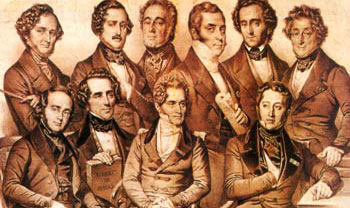
|
|
Georges Bizet
CARMEN
|
|
Don José falls in love
with gipsy girl Carmen, does all the wrong things and kills her in the end.
Great Metropolitan opera of passion and death.
"An extremely exciting performance,
quite beautifully staged and with Agnes Baltsa and Jose Carreras
both somewhere near the peak of their considerable form. This is, however,
traditional fare - no matter how lavishly it may appear on screen." |
|
| Marc Bridle |
|
| SYNOPSIS |
|
|
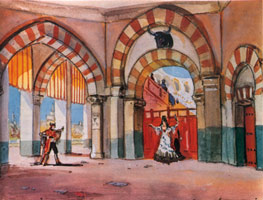 The factory bell rings and the men of Seville gather round the female workers as they return after their lunch break. The gypsy Carmen is awaited with anticipation. When the men gather round her, she tells them love obeys no known laws (Habañera). Only one man pays no attention to her - Don José. Carmen throws a flower at him. The women go back into the factory and the crowd disperses.
The factory bell rings and the men of Seville gather round the female workers as they return after their lunch break. The gypsy Carmen is awaited with anticipation. When the men gather round her, she tells them love obeys no known laws (Habañera). Only one man pays no attention to her - Don José. Carmen throws a flower at him. The women go back into the factory and the crowd disperses.

Micaëla returns, bringing news of José's mother. She has sent Micaëla, who lives with her, to give him a letter. José feels that his mother is protecting him from afar. When he starts to read her letter, Micaëla runs off in embarrassment since it suggests that he marry her. At the moment that he decides to obey, a fight is heard from within the factory. The girls stream out with sharply conflicting accounts of what has occurred, but it is certain that Carmen and one of her fellow workers quarreled and that the other girl was wounded. Carmen, led out by José, refuses to answer any of Zuniga's questions. José is ordered to tie her up and take her to prison. Carmen entices him to go dancing at Lillas Pastia's tavern outside the walls of Seville. Mesmerized, José agrees to help her escape. He unties the rope and, as they leave for prison, Carmen slips away. Don José is arrested.
 Carmen and her friends Frasquita and Mercédès entertain Zuniga and other officers. Zuniga tells Carmen that José has been released this very day. A torchlight procession in honor of the bullfighter Escamillo is heard, and the officers invite him in. He describes the excitements of his profession, in particular the amorous rewards that follow a successful bullfight. Escamillo then propositions Carmen, but she replies that she is engaged for the moment. He says he will wait. Carmen refuses to leave with Zuniga, who threatens to return later.
Carmen and her friends Frasquita and Mercédès entertain Zuniga and other officers. Zuniga tells Carmen that José has been released this very day. A torchlight procession in honor of the bullfighter Escamillo is heard, and the officers invite him in. He describes the excitements of his profession, in particular the amorous rewards that follow a successful bullfight. Escamillo then propositions Carmen, but she replies that she is engaged for the moment. He says he will wait. Carmen refuses to leave with Zuniga, who threatens to return later.
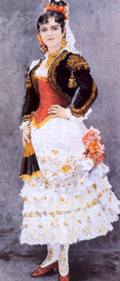 When the company has departed, the smugglers Dancaïre and Remendado enter. They have business in hand for which their regular female accomplices are essential. Frasquita and Mercédès are game, but Carmen refuses to leave Seville: she is in love. Her friends are incredulous. José's song is heard in the distance. The smugglers withdraw. Carmen tells José that she has been dancing for his officers. When he reacts jealously, she agrees to entertain him alone. Bugles are heard sounding the retreat. José says that he must return to barracks. Stupefied, Carmen mocks him, but he answers by producing the flower she threw and telling her how its faded scent sustained his love during the long weeks in prison (Flower Song). But she replies that he doesn't love her; if he did he would desert and join her in a life of freedom in the mountains. When, torn with doubts, he finally refuses, she dismisses him contemptuously. As he leaves, Zuniga bursts in. In jealous rage José attacks him. The smugglers return, separate them, and put Zuniga under temporary constraint José now has no choice but to desert and join the smugglers.
When the company has departed, the smugglers Dancaïre and Remendado enter. They have business in hand for which their regular female accomplices are essential. Frasquita and Mercédès are game, but Carmen refuses to leave Seville: she is in love. Her friends are incredulous. José's song is heard in the distance. The smugglers withdraw. Carmen tells José that she has been dancing for his officers. When he reacts jealously, she agrees to entertain him alone. Bugles are heard sounding the retreat. José says that he must return to barracks. Stupefied, Carmen mocks him, but he answers by producing the flower she threw and telling her how its faded scent sustained his love during the long weeks in prison (Flower Song). But she replies that he doesn't love her; if he did he would desert and join her in a life of freedom in the mountains. When, torn with doubts, he finally refuses, she dismisses him contemptuously. As he leaves, Zuniga bursts in. In jealous rage José attacks him. The smugglers return, separate them, and put Zuniga under temporary constraint José now has no choice but to desert and join the smugglers.
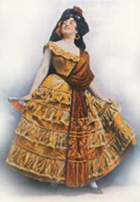 The gang enters with contraband and pauses for a brief rest while Dancaïre and Remendado go on a reconnaissance mission. Carmen and José quarrel, and José gazes regretfully down to the valley where his mother is living. Carmen advises him to join her. The women turn the cards to tell their fortunes: Frasquita and Mercédès foresee rich and gallant lovers, but Carmen's cards spell death, for her and for José. She accepts the prophecy. Remendado and Dancaïre return announcing that customs officers are guarding the pass: Carmen, Frasquita, and Mercédès know how to deal with them. All depart. Micaëla appears, led by a mountaineer. She says that she fears nothing so much as meeting the woman who has turned the man she once loved into a criminal. But she hurries away in fear when a shot rings out. It is José firing at an intruder, who turns out to be Escamillo, transporting bulls to Seville. When he refers to the soldier whom Carmen once loved, José reveals himself and they fight. Carmen and the smugglers return and separate them. Escamillo invites everyone, especially Carmen, to be his guests at the next bullfight in Seville. José is at the end of his tether. Micaëla is discovered, and she begs José to go with her to his mother but he furiously refuses. Micaëla then reveals that his mother is dying. José promises Carmen that they will meet again. As José and Micaëla leave, Escamillo is heard singing in the distance.
The gang enters with contraband and pauses for a brief rest while Dancaïre and Remendado go on a reconnaissance mission. Carmen and José quarrel, and José gazes regretfully down to the valley where his mother is living. Carmen advises him to join her. The women turn the cards to tell their fortunes: Frasquita and Mercédès foresee rich and gallant lovers, but Carmen's cards spell death, for her and for José. She accepts the prophecy. Remendado and Dancaïre return announcing that customs officers are guarding the pass: Carmen, Frasquita, and Mercédès know how to deal with them. All depart. Micaëla appears, led by a mountaineer. She says that she fears nothing so much as meeting the woman who has turned the man she once loved into a criminal. But she hurries away in fear when a shot rings out. It is José firing at an intruder, who turns out to be Escamillo, transporting bulls to Seville. When he refers to the soldier whom Carmen once loved, José reveals himself and they fight. Carmen and the smugglers return and separate them. Escamillo invites everyone, especially Carmen, to be his guests at the next bullfight in Seville. José is at the end of his tether. Micaëla is discovered, and she begs José to go with her to his mother but he furiously refuses. Micaëla then reveals that his mother is dying. José promises Carmen that they will meet again. As José and Micaëla leave, Escamillo is heard singing in the distance.
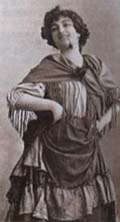 Among the excited crowd cheering the bullfighters are Frasquita and Mercédès. Carmen enters on Escamillo's arm. Frasquita and Mercédès warn Carmen that José has been seen in the crowd. She says that she is not afraid. José enters. He implores her to forget the past and start a new life with him. She tells him calmly that everything between them is over. She will never give in: she was born free and free she will die. While the crowd is heard cheering Escamillo, José tries to prevent Carmen from joining her new lover. Carmen finally loses her temper, takes from her finger the ring that José once gave her, and throws it at his feet. José stabs her, and then confesses to the murder of the woman he loved.
Among the excited crowd cheering the bullfighters are Frasquita and Mercédès. Carmen enters on Escamillo's arm. Frasquita and Mercédès warn Carmen that José has been seen in the crowd. She says that she is not afraid. José enters. He implores her to forget the past and start a new life with him. She tells him calmly that everything between them is over. She will never give in: she was born free and free she will die. While the crowd is heard cheering Escamillo, José tries to prevent Carmen from joining her new lover. Carmen finally loses her temper, takes from her finger the ring that José once gave her, and throws it at his feet. José stabs her, and then confesses to the murder of the woman he loved.
|
top |
|
Giuseppe Verdi
DON CARLOS
|
|
| Infant of Spain Don Carlos loves his stepmother. His father, king Philip of Spain gets very furious as he finds out. Majestic! |
|
| SYNOPSIS |
|
|
France and Spain, c. 1560s.
Don Carlos, Infant of Spain, has come secretly to France to see Elisabetta de Valois, to whom he is betrothed but whom he has never met. In the wintry forest of Fontainebleau the two young people meet by chance and fall in love. But when Lerma, the Spanish ambassador, arrives, he tells them that as a condition of the peace treaty between France and Spain, Elisabetta's father has given her not to Carlo but to his father, Filippo.
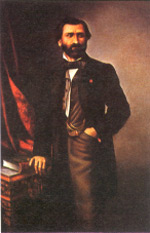 Carlo, in his misery, visits the cloister of the monastery of St. Just, where his grandfather, Carlo V, became a friar and retreated from the cares of the throne. When Carlo confesses to his friend Rodrigo, Marquis of Posa, his love for his father's wife, Rodrigo urges him to devote himself instead to the cause of Flemish independence from Spanish oppression. The two men pledge friendship and devotion to liberty.
Carlo, in his misery, visits the cloister of the monastery of St. Just, where his grandfather, Carlo V, became a friar and retreated from the cares of the throne. When Carlo confesses to his friend Rodrigo, Marquis of Posa, his love for his father's wife, Rodrigo urges him to devote himself instead to the cause of Flemish independence from Spanish oppression. The two men pledge friendship and devotion to liberty.
Outside the convent, Princess Eboli entertains ladies of the court with a Moorish love song. When the queen arrives, Rodrigo slips her a note from Carlo. She agrees to see Carlo, who reiterates his love for her; when she reminds him that she is now in an impossible position, the distraught Infante rushes off. Filippo, finding Elisabetta unattended, sends her lady-in-waiting into exile. When Rodrigo speaks frankly to the king about his hopes for Flanders, Filippo asks him to watch Carlo and the queen, whom he suspects.
 Carlo goes to the queen's gardens at midnight to see Elisabetta but instead is met by the masked Eboli, who is in love with him. When he realizes who she is and shows his disappointment, Eboli threatens to bring about his downfall. To protect him, Rodrigo takes incriminating papers from the Infante.
Carlo goes to the queen's gardens at midnight to see Elisabetta but instead is met by the masked Eboli, who is in love with him. When he realizes who she is and shows his disappointment, Eboli threatens to bring about his downfall. To protect him, Rodrigo takes incriminating papers from the Infante.
In the square before the cathedral, a crowd gathers to witness an auto-da-fé. Carlo leads a delegation of Flemish deputies to plead for clemency for the heretics. When the king refuses, Carlo raises his sword against his father. To his astonishment, Rodrigo disarms him. As the condemned are led to the stake, a voice from heaven announces the salvation of their souls.
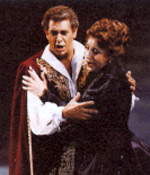 Alone in his study, Filippo laments his wife's indifference. He then calls in the aged Grand Inquisitor, who urges the death penalty for both Carlo and Rodrigo. After the implacable old priest has left, Elisabetta bursts in, crying that her jewel casket has been stolen. The king produces it, and when he forces it open, Carlo's portrait falls out. He accuses his wife of adultery. The queen faints, and Filippo summons Eboli and Rodrigo for help. When the men withdraw, Eboli confesses responsibility for Elisabetta's betrayal - it was she who stole the jewel casket - and when she goes on to confess that she once was the king's mistress, the queen banishes her to a convent. Eboli, cursing her own fatal beauty, vows to save Carlo.
Alone in his study, Filippo laments his wife's indifference. He then calls in the aged Grand Inquisitor, who urges the death penalty for both Carlo and Rodrigo. After the implacable old priest has left, Elisabetta bursts in, crying that her jewel casket has been stolen. The king produces it, and when he forces it open, Carlo's portrait falls out. He accuses his wife of adultery. The queen faints, and Filippo summons Eboli and Rodrigo for help. When the men withdraw, Eboli confesses responsibility for Elisabetta's betrayal - it was she who stole the jewel casket - and when she goes on to confess that she once was the king's mistress, the queen banishes her to a convent. Eboli, cursing her own fatal beauty, vows to save Carlo.
In Carlo's prison cell, Rodrigo explains that he has allowed Carlo's incriminating papers to be found on his person and thus taken the blame for the Flemish insurrection. As he takes his leave, he is shot to death by a soldier of the Inquisition. The Infante is given his freedom by his father as a mob storms into the cell to defy the monarch. Filippo is protected from the throng by the arrival of the Inquisitor.
Back in the cloister of St. Just, Elisabetta waits to bid farewell to Carlo. The lovers are surprised by Filippo and the Inquisitor, but the Infante is saved from them when Carlo V emerges from the shadows and draws him into the tomb.
 "The stars were well aligned when this production was staged at the Théàtre du Châtelet in Paris during March of 1996, when it was recorded live for this DVD. To have this many major stars together, all of them fine singing actors, in one place at one time was already remarkable. But to combine them in a major Verdi opus, staged by famed filmmaker Luc Bondy and conducted by one of the hottest young talents in the pit today, deserved the attention it received.
"The stars were well aligned when this production was staged at the Théàtre du Châtelet in Paris during March of 1996, when it was recorded live for this DVD. To have this many major stars together, all of them fine singing actors, in one place at one time was already remarkable. But to combine them in a major Verdi opus, staged by famed filmmaker Luc Bondy and conducted by one of the hottest young talents in the pit today, deserved the attention it received.
It was also an important, and rare, opportunity for opera lovers to see Don Carlos as it was performed at its world premiere, in the five-act version and in the original French language. French taste at the time demanded operas of elaborate display, and with ballets, according to the traditions established by Meyerbeer. These over-long evenings at the opera were pared down in subsequent Italian productions and it was the remarkable music of the first act which was usually jettisoned in its entirety. Modern recordings of Don Carlo have restored this fine music but French language versions are still rare so this production fills an important void in the Verdian repertory.
Of the current stars of the opera stage, this recording has the crème of the crop. In the title role, French tenor Roberto Alagna is in fine voice and displays all of the necessary ardour and youthful passion, both vocally and dramatically. While not probably destined to be one of the legendary Verdi tenors, he is at the top rank of those who sing these roles today. Soprano Karita Mattila, however, as Elisabeth, is moving in the direction of legendary status and, for many, has already reached it. The wonderful vocal gifts she possesses are complemented by a fine acting sense. Her involvement in her character and uncanny ability to shape a vocal line to this purpose makes her enchanting in this role.
Baritone José Van Dam, for many years among the pantheon of legendary stars, delivers a strong and convincing Philippe II. His Act IV aria "Elle ne m'aime pas" should be studied by all aspiring Verdi bass-baritones. It is a textbook example of how richness and beauty of sound, combined with a passionate, nuanced delivery, can create magic in the theatre.
This DVD is distributed by Warner Music Video and is available at most major outlets. It has the 16/9 format and subtitles are available in English, French, German, Italian and Spanish. In a CD-ROM player, you can access the libretto, articles about this opera, and biographies of the artists. It also has Dolby Digital 2.0 stereo and Dolby Digital 5.0 Surround Sound options."
|
| Frank Cadenhead |
top |
|
Giacchino Rossini
Il Barbiere di Siviglia
|
|
| Figaro helps count Almaviva to obtain beautiful Cecilia Bartoli. |
|
| SYNOPSIS |
|
|
In a Seville square, at dawn.
The Count of Almaviva is fond of Rosina, a rich girl protected by Don Bartolo. He tries to obtain her attention by a serenade. But nobody shows at the balcony, so Almaviva hides under a portico, waiting for a better moment. In the meantime he heards at a distance the voice of Figaro, barber and factotum della citty, well known and appreciated in Seville. He too arrives near Don Bartolo's house, longing to marry Rosina to earn her marriage portion, and he meets the Count, an old friend of his, and promises him to be of help.
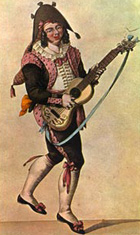 Figaro is renowned in Bartolo's home not only as a barber, but also as speziale. This will allow him to introduce the Count to Bartolo without too much suspicions.
Figaro is renowned in Bartolo's home not only as a barber, but also as speziale. This will allow him to introduce the Count to Bartolo without too much suspicions.
In that moment Rosina appears on the balcony: she has a hand-written note she'd like to throw at the singer of the serenade, but Don Bartolo arrives and she is forced to stop. She has to fool Bartolo, telling him that the note contains only the words of the Aria Inutil Precauzione, and she swiftly drops the note. Almaviva takes it promptly. The old Bartolo angrily goes out, locking the balcony door, and goes to prepare his wedding with Rosina. In the meantime Almaviva reads the note, and sings another serenade to Rosina, pretending to be a poor student named Lindoro. He does so because he does not want to conquer Rosina's heart by his noble birth and by his money. At the end of the serenade Figaro proposes to Almaviva a plan to go into Don Bartolo's house. He will disguise himself as a Royal Army soldier, and will commandeer a room in Bartolo's house. Moreover, he will pretend to be drunk, to avoid being considered a rival by the suspicious old man.
In a room of Don Bartolo's house.
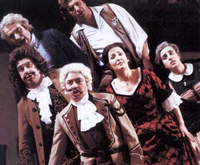 Rosina would like to send another note to Lindoro and asks for Figaro's help. The conversation is abruptly truncated by the coming of Bartolo with Rosina's music teacher, Don Basilio. Bartolo and Basilio start a conversation: the old man wants to hurry with the wedding and to send Almaviva out of Seville. Basilio gives his advice: to get rid of the Count by a calumny. Shortly after they go away to write the wedding contract, so Figaro and Rosina can meet again.
Rosina would like to send another note to Lindoro and asks for Figaro's help. The conversation is abruptly truncated by the coming of Bartolo with Rosina's music teacher, Don Basilio. Bartolo and Basilio start a conversation: the old man wants to hurry with the wedding and to send Almaviva out of Seville. Basilio gives his advice: to get rid of the Count by a calumny. Shortly after they go away to write the wedding contract, so Figaro and Rosina can meet again.
The barber tells her that Bartolo wants to marry her on the following day, and that Lindoro wants to meet her. The girl gives her note to Figaro in an envelope.
When the old man arrives, he becames more and more suspicious. Someone knocks to door: it's the Count, disguised as a soldier and asking for a room. While Bartolo is protesting, the false soldier succeeds in speaking to Rosina, telling her to be Lindoro and giving her a note. But the note is seen by Bartolo, who orders to give him the paper. There is a moment of general confusion, and Rosina substitutes the love note with the laundry list. But in the meantime some guards enter the house, trying to arrest the drunk soldier. The Count shows a paper to the head of the guards, and he promptly stands to attention, while everyone looks astonished the scene.
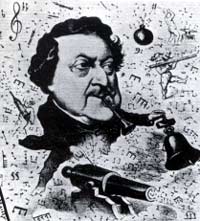 In Bartolo's study room.
In Bartolo's study room.
The old man is always more suspicious and afraid, when the Count arrives again at the door, pretending to be Don Alonzo, a music teacher sent by Don Basilio, who lies ill, to substitute him. Bartolo is diffident, so to be trusted the Count gives to Bartolo the note from Rosina, as if it were addressed to the Count of Almaviva, to be used as a calumny against the Count. Don Bartolo, happy, trusts him and calls Rosina for the music lesson.
While the two lovers are simulating a music lesson, Figaro
arrives and starts shaving Bartolo. He succeeds in stealing
the balcony key, needed by the lovers to flee away in the night.
At once, Don Basilio arrives and is going to discover the truth: he is
convinced to pretend being ill by a heavy money bag; but Don Bartolo finally understands all.
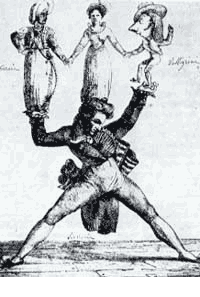 Don Bartolo asks Basilio to bring immediately a Notary. He shows to Rosina the note given him by Lindoro, and convinces her that Lindoro doesn't love her, as he is only a servant of the Count. She is convinced and accepts to marry Bartolo.
Don Bartolo asks Basilio to bring immediately a Notary. He shows to Rosina the note given him by Lindoro, and convinces her that Lindoro doesn't love her, as he is only a servant of the Count. She is convinced and accepts to marry Bartolo.
But Figaro and Lindoro thrive to enter the house, and they reveal to Rosina that Lindoro and the Count are the same person. While the two lovers try to escape the house, they discover that the stair prepared by Figaro to go down the balcony has been removed, and in the same moment Don Basilio comes with the Notary. Figaro tries the last chance, and introduces the two youngs as the betrothed. Don Basilio is convinced to stay silent by a gift and is kept quiet with a gun.
When Don Bartolo arrives with the guards, the two lovers are already married. The Count reveals his real identity, and to calm down the desperate old Bartolo he offers him Rosina's dowry. The opera ends in happiness and laughing.
|
top |
|
Giuseppe Verdi
IL TROVATORE
|
|
| Pavarotti as Trovatore. Wow! |
|
| SYNOPSIS |
|
|
Environs of Zaragoza, the capital of the Kingdom of Aragon, and in the mountains of Vizcaya (Biscay), around 1412
Outside the guardroom of Aliaferia Palace in Aragon, Count di Luna's soldiers are waiting to apprehend Manrico, a troubadour, who rivals the count for the favors of the Lady Leonora. Ferrando, captain of the guard, keeps his men awake by telling them of a Gypsy woman burned at the stake years ago for bewitching Di Luna's younger brother. The Gypsy's daughter sought vengeance by kidnaping the child and, so the story goes, burning him at the very stake where her mother died. Di Luna, though, still hopes his brother lives.
 In the palace gardens, Leonora confides to Inez how at a tournament she placed the victory wreath on the brow of an unknown knight in black armor; she saw him no more until he came to serenade her. Though Inez has misgivings, Leonora declares her love for the handsome stranger. No sooner do the women reenter the palace than Di Luna arrives to court Leonora. Simultaneously Manrico's song is heard in the distance, and Leonora rushes to greet him. The jealous count challenges Manrico to a duel, and they hurry away.
In the palace gardens, Leonora confides to Inez how at a tournament she placed the victory wreath on the brow of an unknown knight in black armor; she saw him no more until he came to serenade her. Though Inez has misgivings, Leonora declares her love for the handsome stranger. No sooner do the women reenter the palace than Di Luna arrives to court Leonora. Simultaneously Manrico's song is heard in the distance, and Leonora rushes to greet him. The jealous count challenges Manrico to a duel, and they hurry away.
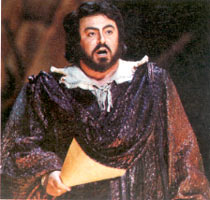 As dawn breaks in the Biscay mountains, Gypsies sing at work with hammer and anvil. Azucena - the Gypsy's daughter described by Ferrando - relives her mother's fiery execution, recalling the dying woman's plea for vengeance. Manrico asks to hear her full story, becoming confused when Azucena, overwhelmed with memories, blurts out that by mistake she hurled her own son into the flames. Assuring him of a mother's love, Azucena makes Manrico swear revenge, but he says a strange power stayed his hand when he could have killed Di Luna in the duel. A messenger brings news that Leonora, thinking Manrico dead, plans to enter a convent. Despite Azucena's pleas, Manrico rushes away.
As dawn breaks in the Biscay mountains, Gypsies sing at work with hammer and anvil. Azucena - the Gypsy's daughter described by Ferrando - relives her mother's fiery execution, recalling the dying woman's plea for vengeance. Manrico asks to hear her full story, becoming confused when Azucena, overwhelmed with memories, blurts out that by mistake she hurled her own son into the flames. Assuring him of a mother's love, Azucena makes Manrico swear revenge, but he says a strange power stayed his hand when he could have killed Di Luna in the duel. A messenger brings news that Leonora, thinking Manrico dead, plans to enter a convent. Despite Azucena's pleas, Manrico rushes away.
Di Luna, burning with passion for Leonora, waits by the cloister to kidnap her. When she enters with the nuns, he strides forward, only to be halted by Manrico, who suddenly appears with his men. As the forces struggle, the lovers escape.
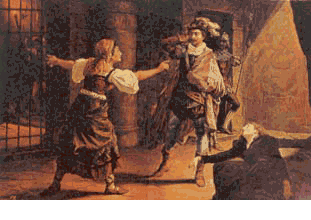 Di Luna has pitched camp near the bastion of Castellor, where Manrico has taken Leonora. After soldiers sing of their eagerness for victory, Ferrando leads in Azucena, who was found nearby. The Gypsy describes her poor, lonely life and says she is only searching for her son. Di Luna reveals his identity, at which Azucena recoils and is recognized by Ferrando as the supposed murderer of Di Luna's baby brother. The count orders her burned at the stake.
Di Luna has pitched camp near the bastion of Castellor, where Manrico has taken Leonora. After soldiers sing of their eagerness for victory, Ferrando leads in Azucena, who was found nearby. The Gypsy describes her poor, lonely life and says she is only searching for her son. Di Luna reveals his identity, at which Azucena recoils and is recognized by Ferrando as the supposed murderer of Di Luna's baby brother. The count orders her burned at the stake.
Inside the castle, Manrico assures Leonora her love makes him invincible. As the couple prepares to go to the wedding chapel, Manrico's aide Ruiz bursts in to say that Azucena has been seized and tied to a stake. Manrico stares in horror at the distant pyre, which has been lit. He runs to his mother's rescue, vowing vengeance.
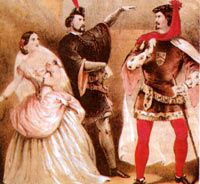 Ruiz brings Leonora to the foot of the captured Manrico's prison tower, where she voices her undying love and prays for his release. Monks are heard intoning a doleful Miserere for the soul of the condemned, while Manrico sings farewell from inside the bastion. Leonora resolves to save him. When Di Luna appears, Leonora agrees to yield to him but secretly swallows poison.
Ruiz brings Leonora to the foot of the captured Manrico's prison tower, where she voices her undying love and prays for his release. Monks are heard intoning a doleful Miserere for the soul of the condemned, while Manrico sings farewell from inside the bastion. Leonora resolves to save him. When Di Luna appears, Leonora agrees to yield to him but secretly swallows poison.
In their cell, Manrico comforts Azucena, who longs for their home in the mountains. No sooner does the old Gypsy fall asleep than Leonora rushes in to tell her lover he is saved, urging him to flee. Manrico comprehends the price of his freedom and denounces her, but the poison begins to take effect. He takes her in his arms as she dies. Furious at being cheated of his prize, Di Luna sends Manrico to the executioner's block, while Azucena staggers to her feet to see the ax fall. "He was your brother!" she cries; "Mother, you are avenged!"
|
top |
|
Giuseppe Verdi
OTELLO
|
|
| The evil force of jealousy. Lots of corpses. After Shakespeare. |
|
| SYNOPSIS |
|
|
Cyprus, late fifteenth century.
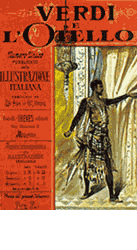 The Moor Otello, governor of the island and a general in the Venetian army, arrives in port as a tempest rages. Iago, Otello's ensign, confers with Roderigo, a fop who has come to Cyprus because of his unrequited love for Desdemona, a Venetian beauty recently married to Otello. Promising to help Roderigo, Iago says Desdemona should soon tire of her Moorish husband, adding that he himself has reasons for revenge on Otello, who passed him over for advancement, promoting Cassio instead. Iago proposes a toast; when Cassio declines any more drink, Iago says he cannot refuse to salute Otello's new wife. Cassio consents and grows tipsy as Iago provokes Roderigo to a duel with Cassio. When Montano, Otello's predecessor in command, tries to separate the two, Cassio attacks him as well. Otello comes out of the castle to restore order. When he sees Desdemona disturbed by the fray, he takes away Cassio's recent promotion. Sending everyone home, Otello turns to his bride, and they recall their courtship. Leading her back into the castle, Otello kisses her.
The Moor Otello, governor of the island and a general in the Venetian army, arrives in port as a tempest rages. Iago, Otello's ensign, confers with Roderigo, a fop who has come to Cyprus because of his unrequited love for Desdemona, a Venetian beauty recently married to Otello. Promising to help Roderigo, Iago says Desdemona should soon tire of her Moorish husband, adding that he himself has reasons for revenge on Otello, who passed him over for advancement, promoting Cassio instead. Iago proposes a toast; when Cassio declines any more drink, Iago says he cannot refuse to salute Otello's new wife. Cassio consents and grows tipsy as Iago provokes Roderigo to a duel with Cassio. When Montano, Otello's predecessor in command, tries to separate the two, Cassio attacks him as well. Otello comes out of the castle to restore order. When he sees Desdemona disturbed by the fray, he takes away Cassio's recent promotion. Sending everyone home, Otello turns to his bride, and they recall their courtship. Leading her back into the castle, Otello kisses her.
A room in the castle, opening on a garden.
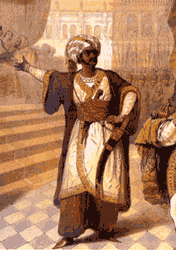 Iago tells Cassio that by presenting his case to Desdemona he can be reinstated, because Otello is influenced by his wife. As soon as Cassio is out of sight, Iago declares his belief that a cruel God created man wicked, and life has no meaning. Iago watches as Cassio approaches Desdemona in the garden, and when Otello comes in, the lieutenant makes casual remarks about Desdemona's fidelity. Softened by his wife's beauty, Otello greets her, but she brings up the question of Cassio's demotion, annoying him. When she offers a handkerchief to wipe his brow, he throws it to the ground, where her attendant, Emilia, retrieves it. As Desdemona tries to calm Otello, Iago orders Emilia (his wife) to give him the handkerchief. Otello asks to be alone, and the others leave, except for Iago, who hangs back to observe Otello's growing suspicion. To fan the flames, Iago invents a story about how Cassio spoke lovingly of Desdemona in his sleep. Then he mentions her handkerchief, saying he saw it in Cassio's hand. Beside himself, Otello swears to have vengeance, and Iago joins in the oath.
Iago tells Cassio that by presenting his case to Desdemona he can be reinstated, because Otello is influenced by his wife. As soon as Cassio is out of sight, Iago declares his belief that a cruel God created man wicked, and life has no meaning. Iago watches as Cassio approaches Desdemona in the garden, and when Otello comes in, the lieutenant makes casual remarks about Desdemona's fidelity. Softened by his wife's beauty, Otello greets her, but she brings up the question of Cassio's demotion, annoying him. When she offers a handkerchief to wipe his brow, he throws it to the ground, where her attendant, Emilia, retrieves it. As Desdemona tries to calm Otello, Iago orders Emilia (his wife) to give him the handkerchief. Otello asks to be alone, and the others leave, except for Iago, who hangs back to observe Otello's growing suspicion. To fan the flames, Iago invents a story about how Cassio spoke lovingly of Desdemona in his sleep. Then he mentions her handkerchief, saying he saw it in Cassio's hand. Beside himself, Otello swears to have vengeance, and Iago joins in the oath.
In the armory.
 Iago tells Otello that more proof is forthcoming of his betrayal by his wife and Cassio. Desdemona enters, and Otello speaks calmly until she revives the subject of Cassio. When Otello demands the handkerchief he gave her, she again pleads for Cassio. Otello calls the shocked woman a courtesan and dismisses her. He cries out that heaven could have afflicted him with anything but this, then hides as Iago returns with Cassio. Iago flashes the handkerchief he stole and leads Cassio on in banter in such a way that Otello overhears only fragments and thinks they are talking about Desdemona. As trumpets announce dignitaries from Venice, Otello vows to kill his wife that very night. The Moor greets Lodovico, who recalls him to Venice and appoints Cassio to govern Cyprus. Losing control at this news, Otello pushes his wife to the floor with insults. He orders everyone out and collapses in a seizure as Iago gloats over him, crying, "Behold the Lion!"
Iago tells Otello that more proof is forthcoming of his betrayal by his wife and Cassio. Desdemona enters, and Otello speaks calmly until she revives the subject of Cassio. When Otello demands the handkerchief he gave her, she again pleads for Cassio. Otello calls the shocked woman a courtesan and dismisses her. He cries out that heaven could have afflicted him with anything but this, then hides as Iago returns with Cassio. Iago flashes the handkerchief he stole and leads Cassio on in banter in such a way that Otello overhears only fragments and thinks they are talking about Desdemona. As trumpets announce dignitaries from Venice, Otello vows to kill his wife that very night. The Moor greets Lodovico, who recalls him to Venice and appoints Cassio to govern Cyprus. Losing control at this news, Otello pushes his wife to the floor with insults. He orders everyone out and collapses in a seizure as Iago gloats over him, crying, "Behold the Lion!"
|
top |
|
Antonio Salieri
FALSTAFF
|
|
| 2 hours to humiliate Falstaff 3 times to general merriment. Jealous husbands, but all ends well. Based on Shakespeare. |
|
| SYNOPSIS |
|
|
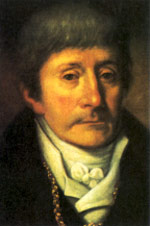 "Antonio Salieri (1750-1825) was a thoroughly competent professional composer, despite his unfortunate fictitious reputation, perpetuated by Rimsky Korsakov and Peter Shaffer. His Falstaff is frankly populist in its aim, but has quite a few special effects in the orchestration, with solos for cello and clarinet. After a slowish start one gradually becomes involved in the considerable subtlety of the text, which is available in subtitled translations in several languages.
"Antonio Salieri (1750-1825) was a thoroughly competent professional composer, despite his unfortunate fictitious reputation, perpetuated by Rimsky Korsakov and Peter Shaffer. His Falstaff is frankly populist in its aim, but has quite a few special effects in the orchestration, with solos for cello and clarinet. After a slowish start one gradually becomes involved in the considerable subtlety of the text, which is available in subtitled translations in several languages.
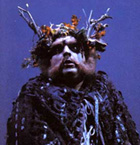 This production at the little rococo theatre in Schwetzingen Palace is ideal for home viewing. The sets are simplified but fully adequate to suggest the different scenes, the costumes are muted in colour and all the emphasis is upon inventive acting based on excellent teamwork and fine singing. John de Carlo as Falstaff gives a marvellous characterisation of this archetypal figure, who is easily inveigled to bounce back and hasten to another certain humiliation, for us to relish in anticipation and delivery. A cruel story about total denial of personal shortcomings and enduring confidence in certain reciprocation of his roving sexual fancies.
This production at the little rococo theatre in Schwetzingen Palace is ideal for home viewing. The sets are simplified but fully adequate to suggest the different scenes, the costumes are muted in colour and all the emphasis is upon inventive acting based on excellent teamwork and fine singing. John de Carlo as Falstaff gives a marvellous characterisation of this archetypal figure, who is easily inveigled to bounce back and hasten to another certain humiliation, for us to relish in anticipation and delivery. A cruel story about total denial of personal shortcomings and enduring confidence in certain reciprocation of his roving sexual fancies.
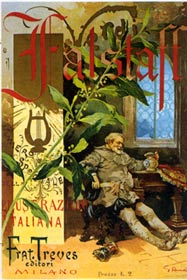 It is a joy to watch and the direction for stage (Michael Hampe) and for the TV cameras is ideal. The understatement of the stage picture benefits from the high quality of DVD screen viewing. In summary, it is an opera which looks good on screen and is far more enjoyable with vision than would be possible on CD.
It is a joy to watch and the direction for stage (Michael Hampe) and for the TV cameras is ideal. The understatement of the stage picture benefits from the high quality of DVD screen viewing. In summary, it is an opera which looks good on screen and is far more enjoyable with vision than would be possible on CD.
 The collage picture shown gives a good idea of the staging and style.With this one, you feel that you are not missing any important dimension. I recommend it warmly."
The collage picture shown gives a good idea of the staging and style.With this one, you feel that you are not missing any important dimension. I recommend it warmly."
Peter Grahame Woolf
|
top |
|
Giuseppe Verdi
LA TRAVIATA
|
|
| Courtesan Violetta falls in love with Alfredo. His father finds a way to get rid of second-hand daughter in law. Moving and dramatic. |
|
| SYNOPSIS |
|
|
Violetta's House. August in 1850s Paris.
 A party is being given at the house of the city's most beautiful and adored courtesan, Violetta Valéry. She greets her guests. Gastone introduces Alfredo Germont to Violetta, and the young man tells Violetta that he admires her and thinks of her constantly. Gastone proposes a toast and Alfredo responds with a drinking song. When the guests move into the ballroom to dance, Violetta feels indisposed and begs her guests to go on without her. Alfredo remains behind and declares how much he loves her. She tells him she can only offer friendship. She gives him a flower, asking him to return when it has faded. Alone, she thinks about Alfredo, but resolves to enjoy herself and her whirlwind lifestyle.
A party is being given at the house of the city's most beautiful and adored courtesan, Violetta Valéry. She greets her guests. Gastone introduces Alfredo Germont to Violetta, and the young man tells Violetta that he admires her and thinks of her constantly. Gastone proposes a toast and Alfredo responds with a drinking song. When the guests move into the ballroom to dance, Violetta feels indisposed and begs her guests to go on without her. Alfredo remains behind and declares how much he loves her. She tells him she can only offer friendship. She gives him a flower, asking him to return when it has faded. Alone, she thinks about Alfredo, but resolves to enjoy herself and her whirlwind lifestyle.
A country house near Paris. The following November.
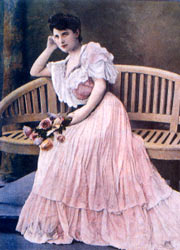 Alfredo and Violetta have been living together in the country for three months, when Alfredo learns from Annina that Violetta has been selling her possessions to support them. Disgraced, he rushes off to Paris to get money. Alfredo's father, Giorgio Germont, surprises Violetta with a visit and requests that she leave Alfredo because his sister may have trouble marrying if her brother is linked to a courtesan. Violetta confesses that Alfredo's love has redeemed her, and that she is very sick and might not live long, but Germont is unmoved and insists on a definite separation. Violetta finally agrees to make the sacrifice and only begs that after she dies, Alfredo should know the reason she left him. She writes a letter and, when Alfredo returns, says good-bye. He assumes she will only be gone for a short while, but a messenger delivers the letter announcing that she has returned to her former lover. Alfredo's father tries to comfort his son, but to no avail.
Alfredo and Violetta have been living together in the country for three months, when Alfredo learns from Annina that Violetta has been selling her possessions to support them. Disgraced, he rushes off to Paris to get money. Alfredo's father, Giorgio Germont, surprises Violetta with a visit and requests that she leave Alfredo because his sister may have trouble marrying if her brother is linked to a courtesan. Violetta confesses that Alfredo's love has redeemed her, and that she is very sick and might not live long, but Germont is unmoved and insists on a definite separation. Violetta finally agrees to make the sacrifice and only begs that after she dies, Alfredo should know the reason she left him. She writes a letter and, when Alfredo returns, says good-bye. He assumes she will only be gone for a short while, but a messenger delivers the letter announcing that she has returned to her former lover. Alfredo's father tries to comfort his son, but to no avail.
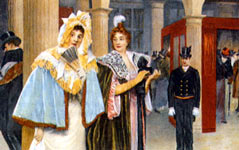 A room in Flora's house. Later that day.
A room in Flora's house. Later that day.
Violetta's friend Flora is hosting a party. Alfredo's arrival startles the guests, but his disinterest in Violetta garners approval. He joins a game of cards as Violetta and her lover, Baron Douphol, enter. The Baron challenges Alfredo and promptly loses. The guests disperse when dinner is announced. Violetta returns to warn Alfredo that his life is in danger and that he should leave the party. He agrees to go only if she follows him. Remembering her oath to his father, Violetta refuses and, furious, Alfredo calls the guests to witness that he has paid her back for their time together. His father arrives and denounces his son for such shameful behaviour, and Douphol vows to avenge Violetta.
Violetta's bedroom. February 20.
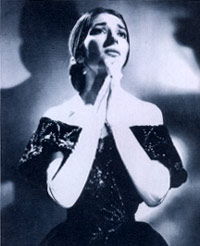 Violetta lies on her deathbed, knowing she will not live much longer. She reads a letter from Alfredo's father, relating how Alfredo fled the country after wounding Douphol in a duel, but promising that he will return to seek her pardon. When Alfredo enters the bedroom, the two reunite joyfully and dream of living in Paris, but Violetta collapses. Alfredo's father arrives and asks foregiveness for the pain he has caused the lovers. Violetta presses a miniature portrait of herself into Alfredo's hands, telling him to give it to the pure bride whom he will marry one day. Violetta suddenly feels that her pains have ceased and that she is coming back to life. But it is too late. . . she dies in Alfredo's arms.
Violetta lies on her deathbed, knowing she will not live much longer. She reads a letter from Alfredo's father, relating how Alfredo fled the country after wounding Douphol in a duel, but promising that he will return to seek her pardon. When Alfredo enters the bedroom, the two reunite joyfully and dream of living in Paris, but Violetta collapses. Alfredo's father arrives and asks foregiveness for the pain he has caused the lovers. Violetta presses a miniature portrait of herself into Alfredo's hands, telling him to give it to the pure bride whom he will marry one day. Violetta suddenly feels that her pains have ceased and that she is coming back to life. But it is too late. . . she dies in Alfredo's arms.
|
top |
|
Wolfgang Amadeus Mozart
COSI FAN TUTTE
|
|
| A story about womens' virtue. Sic! |
|
| SYNOPSIS |
|
|
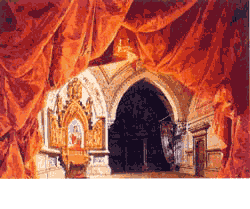 In eighteenth-century Naples, the elderly cynic Don Alfonso discusses women with two young officers, Ferrando and Guglielmo. The gallants insist their sweet-hearts are paragons of virtue and accept Alfonso's bet that he can prove the ladies fickle if they do as he says for twenty-four hours.
In eighteenth-century Naples, the elderly cynic Don Alfonso discusses women with two young officers, Ferrando and Guglielmo. The gallants insist their sweet-hearts are paragons of virtue and accept Alfonso's bet that he can prove the ladies fickle if they do as he says for twenty-four hours.
The sisters Fiordiligi and Dorabella revel in their love for Guglielmo and Ferrando. Alfonso comes in with sad news: the young men have been called to their regiment. They appear, and the five make elaborate farewells. As soldiers march by, Ferrando and Guglielmo fall in.
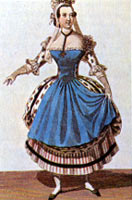 The maid, Despina, offers the sisters advice about forgetting old lovers with the help of new ones, but her mistresses resent her capricious approach to love. Despina is bribed by Don Alfonso to introduce two foreign friends of his to the ladies. The sisters, returning, are scandalized to see the strangers, whom they do not recognize as their lovers, heavily disguised as Albanians. The newcomers declare their admiration for the ladies, but both repulse them.
The maid, Despina, offers the sisters advice about forgetting old lovers with the help of new ones, but her mistresses resent her capricious approach to love. Despina is bribed by Don Alfonso to introduce two foreign friends of his to the ladies. The sisters, returning, are scandalized to see the strangers, whom they do not recognize as their lovers, heavily disguised as Albanians. The newcomers declare their admiration for the ladies, but both repulse them.
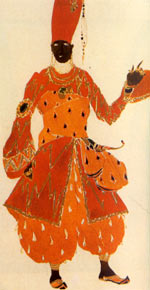 The men are thrilled, but Alfonso warns the bet isn't won yet. As Ferrando blissfully reiterates his passion for Dorabella, Despina suggests a plan to Alfonso to win the ladies' sympathy.
The men are thrilled, but Alfonso warns the bet isn't won yet. As Ferrando blissfully reiterates his passion for Dorabella, Despina suggests a plan to Alfonso to win the ladies' sympathy.
Alone in their garden, the sisters lament the absence of their lovers. Suddenly the "Albanians" stagger in, pretending to have poisoned themselves in despair over their rejection. Alfonso and Despina run for a doctor while the ladies begin to waver: pity for the strangers will be their undoing. Despina returns, disguised as a doctor using Dr. Mesmer's invention, the magnet, to draw out the poison, and urging the sisters to nurse the patients as they recover. The men revive, but their increased ardor alarms the women, who angrily refuse their demands for a kiss.
 Attending her mistresses, Despina lectures them on their stubbornness and describes how to handle men Dorabella is persuaded there could be no harm in a little flirtation, and surprisingly, Fiordiligi agrees. They decide who will pair off with whom
Attending her mistresses, Despina lectures them on their stubbornness and describes how to handle men Dorabella is persuaded there could be no harm in a little flirtation, and surprisingly, Fiordiligi agrees. They decide who will pair off with whom
The young men have arranged a serenade in the garden. Seeing their wager through, Guglielmo ardently pursues Dorabella while Ferrando woos Fiordiligi who admits he has touched her heart hoping her absent lover will forgive her. When the men compare notes, Guglielmo is glad to see Fiordiligi standing fast - or so he thinks - but Ferrando is dismayed that Dorabella has given in to Guglielmo, who comments on the waywardness of the fair sex. Left alone, Ferrando expresses his love for Dorabella, though he feels betrayed.
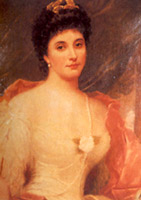 Fiordiligi rebukes Dorabella for being fickle, although she admits that in her heart she has succumbed to the stranger. Despina coaxes her to find a way, saying love is a thief and people get robbed every day. Alone, Fiordiligi decides to drag her sister off to join their sweethearts at the front, but Ferrando, pursuing the wager, threatens suicide, and Fiordiligi gives in. Now Guglielmo is furious, but Alfonso counsels forgiveness: that's the way women are, he claims.
Fiordiligi rebukes Dorabella for being fickle, although she admits that in her heart she has succumbed to the stranger. Despina coaxes her to find a way, saying love is a thief and people get robbed every day. Alone, Fiordiligi decides to drag her sister off to join their sweethearts at the front, but Ferrando, pursuing the wager, threatens suicide, and Fiordiligi gives in. Now Guglielmo is furious, but Alfonso counsels forgiveness: that's the way women are, he claims.
 A double wedding is arranged between the sisters and the "Albanians." Alfonso brings in the notary - Despina in another disguise. Just as the ladies have signed the marriage contract, familiar martial strains outside herald the return of the former lovers' regiment. In panic the sisters push their intended husbands from the room and go more or less to pieces when the men reappear without their "Albanian" mufti. Ferrando and Guglielmo storm at the ladies when the marriage contract is discovered. But Alfonso explains the deception, reasoning that true happiness lies not in romantic illusions but in accepting things as they are. Agreeing a trick can work both ways, the lovers reconcile.
A double wedding is arranged between the sisters and the "Albanians." Alfonso brings in the notary - Despina in another disguise. Just as the ladies have signed the marriage contract, familiar martial strains outside herald the return of the former lovers' regiment. In panic the sisters push their intended husbands from the room and go more or less to pieces when the men reappear without their "Albanian" mufti. Ferrando and Guglielmo storm at the ladies when the marriage contract is discovered. But Alfonso explains the deception, reasoning that true happiness lies not in romantic illusions but in accepting things as they are. Agreeing a trick can work both ways, the lovers reconcile.
|
top |
|
Sergei Prokofiev
ROMEO AND JULIET
Ballet
|
|
| Romeo and Juliet. Need to say more? |
|
| SYNOPSIS |
|
|
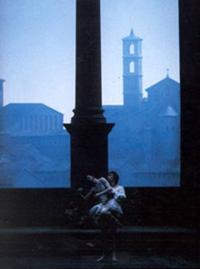 Verona, fourteenth century.
Verona, fourteenth century.
It is the day before the festival of San Zeno, the patron saint of Verona.
Brother Lorenzo, a friend of Romeo's, finds him asleep on the steps leading to the Capulet's house. Romeo is infatuated with Rosalind, a cousin of Juliet's who is shortly to arrive for the festival. Juliet comes out onto the balcony to greet Rosalind but she does not see Romeo. A group of actors arrives in the market place to perform during the festival, and Romeo recognizes his acquaintances Isabella and Valentino among them. Mercutio and Benvolio, friends of Romeo's, are just as pleased to see the actors. Juliet's Nurse has come to the market to make some purchases. With her is the servant Pietro who is annoyed by one of the Montague family's servants. An argument between the servants of both feuding families, the Capulets and the Montagues, develops into a street fight in which the heads of both houses - but also Romeo, and Juliet's cousin Tybalt take part. The appearance of Escalus, Prince of Verona, puts an end to the tumult, and he confiscates the swords of both Montague and Capulet to symbolize the end of enmity between them. Capulet gives the Nurse a list of guests he expects at the ball to take place that evening. Pietro, to whom she in turn gives it, cannot read and passes it on until it reaches Romeo, who is entranced to find Rosalind's name among those who have been invited.
Juliet, playing with her cousins in the bath, is presented with a medallion by her mother as a symbol of her parents' intention of marrying her off.
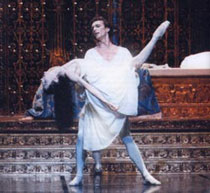 Capulet receives his guests in the courtyard of his house.
Capulet receives his guests in the courtyard of his house.
Capulet, his wife, and Tybalt open the ball. Juliet and her cousins present themselves to the guests with an allegorical dance in honour of the San Zeno festival. Juliet, sensing the gaze of a young man fixed upon her, forgets her steps. Count Paris, chosen by Juliet's parents to be her fiancé, is introduced to her. When the guests leave the ballroom Juliet stays behind and is surprised by Romeo, who has come to the ball masked and suddenly appears beside her. Tybalt rudely interrupts their tender colloquy.
The guests make their farewells and leave the house.
Romeo, however, remains in the Capulets' courtyard. When Juliet appears on her balcony, they confess their love for each other.
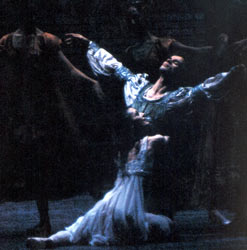 The celebrations in the city have begun. Romeo sends Brother Lorenzo to Juliet to prepare her for their marriage. The actors perform a play. The Nurse brings Romeo an affirmative letter from Juliet.
The celebrations in the city have begun. Romeo sends Brother Lorenzo to Juliet to prepare her for their marriage. The actors perform a play. The Nurse brings Romeo an affirmative letter from Juliet.
Romeo arrives at Brother Lorenzo's.
Brother Lorenzo marries Romeo and Juliet secretly in hopes of thus ending the feud between their families.
The festivities continue. The drunken Tybalt molests Mercutio and kills him in a duel, but Romeo revenges the death of his friend. Juliet's mother collapses on Tybalt's corpse. The actors hide Romeo.
Tybalt is buried.
Romeo, banished from Verona, has returned in disguise and spent the night with Juliet, but must leave her at dawn. Juliet's parents announce their intention of marrying her to Paris that very day, but she refuses to comply with their wishes.
Scene Thoughts of Romeo lend Juliet the courage to seek help from Brother Lorenzo. He gives her a vial containing the potion that will put her into a death-like sleep for twenty four hours. Visions seem to promise her a happy existence at Romeo's side.
When Paris comes to Juliet a second time she makes a pretence of agreeing to the marriage. Though tormented by fears, Juliet drinks the sleeping potion.
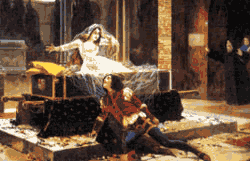 Her Nurse and her cousins find Juliet in a sleep so sound that they believe her to have died.
Her Nurse and her cousins find Juliet in a sleep so sound that they believe her to have died.
En route to Mantua, Romeo learns of Juliet's supposed death and hurries back to
Verona. The desperate Brother Lorenzo looks for Romeo to tell him what has really happened.
Juliet is buried in state in the Capulet vault. The procession of mourners leaves.
Romeo appears. But as he can do naught else but believe that Juliet is indeed dead, he stabs himself. Juliet awakes and finds Romeo. Despairingly, she joins him in death.
|
top |
|
Giuseppe Verdi
RIGOLETTO
|
|
| Hunchback jester Rigoletto jests too much and gets cursed. His master, the Duke of Mantua seduces his daughter. And much worse. |
|
| SYNOPSIS |
|
|
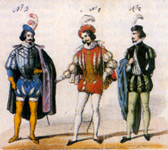 At the ducal court of Mantua, the hunchbacked jester Rigoletto mocks the courtiers cuckolded by the profligate Duke, stirring them to plans of vengeance. Count Monterone appeals to the Duke for the return of his dishonoured daughter, but is cruelly mocked by Rigoletto. Enraged, Monterone calls down a father's curse on the terrified jester.
At the ducal court of Mantua, the hunchbacked jester Rigoletto mocks the courtiers cuckolded by the profligate Duke, stirring them to plans of vengeance. Count Monterone appeals to the Duke for the return of his dishonoured daughter, but is cruelly mocked by Rigoletto. Enraged, Monterone calls down a father's curse on the terrified jester.
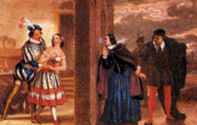 Outside his house, Rigoletto encounters Sparafucile, a professional assassin, but has no need of his services. Rigoletto warns his daughter Gilda to remain concealed in their home. She does not reveal to him that she has fallen in love with a handsome young man she has encountered on her way to church. The object of her affections is the Duke, who appears as soon as Rigoletto has left, bribing Gilda's nurse to admit him and to speak well of him to Gilda. He tells her he is a poor student. After he leaves, the courtiers come to abduct Gilda, believing her to be Rigoletto's mistress. They trick Rigoletto into assisting them, assuring him that it is the Countess Ceprano they are abducting from the neighbouring house. When he realizes what has happened, he is distraught. He remembers the curse.
Outside his house, Rigoletto encounters Sparafucile, a professional assassin, but has no need of his services. Rigoletto warns his daughter Gilda to remain concealed in their home. She does not reveal to him that she has fallen in love with a handsome young man she has encountered on her way to church. The object of her affections is the Duke, who appears as soon as Rigoletto has left, bribing Gilda's nurse to admit him and to speak well of him to Gilda. He tells her he is a poor student. After he leaves, the courtiers come to abduct Gilda, believing her to be Rigoletto's mistress. They trick Rigoletto into assisting them, assuring him that it is the Countess Ceprano they are abducting from the neighbouring house. When he realizes what has happened, he is distraught. He remembers the curse.
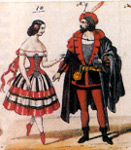 The courtiers describe their abduction of Gilda to the Duke. He is delighted to discover that she has been brought to his palace and awaits him in his bedroom. Rigoletto now enters, feigning indifference but desperately seeking signs of the whereabouts of his daughter. When he realizes what has happened he first curses, then pleads with the courtiers for her return, but to no avail. Gilda appears en deshabillé, and Rigoletto swears vengeance on the Duke.
The courtiers describe their abduction of Gilda to the Duke. He is delighted to discover that she has been brought to his palace and awaits him in his bedroom. Rigoletto now enters, feigning indifference but desperately seeking signs of the whereabouts of his daughter. When he realizes what has happened he first curses, then pleads with the courtiers for her return, but to no avail. Gilda appears en deshabillé, and Rigoletto swears vengeance on the Duke.
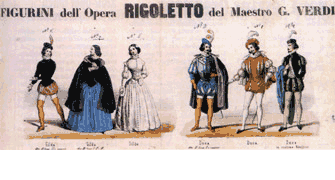 The Duke has been lured to a remote inn by Sparafucile's sister Maddalena. Rigoletto has paid Sparafucile to kill the Duke and to deliver his body in a sack so that he may himself throw it into the Mincio. Rigoletto brings Gilda with him to spy on the inn, hoping to reinforce the notion that the Duke is not a man of honour in affairs of the heart. Gilda is unimpressed.
The Duke has been lured to a remote inn by Sparafucile's sister Maddalena. Rigoletto has paid Sparafucile to kill the Duke and to deliver his body in a sack so that he may himself throw it into the Mincio. Rigoletto brings Gilda with him to spy on the inn, hoping to reinforce the notion that the Duke is not a man of honour in affairs of the heart. Gilda is unimpressed.
 Rigoletto sends her home to change into men's clothing for their flight to Verona. Infatuated with the Duke herself, Maddalena begs her brother to spare him and to murder the jester instead. His sense of professional responsibility offended, Sparafucile refuses, but does go so far as to agree that if anyone else should happen to show up at the inn on this wild and stormy night, he will murder them instead. Gilda, returning and hearing all this, sees her chance to help the man she loves. She boldly walks up to the door of the inn, knocks, is admitted and promptly stabbed and stuffed into the sack for Rigoletto. Rigoletto is just about to throw the sack in the river when he hears the Duke still singing in the inn. Wildly he opens the sack to find his dying daughter, who with her last breath assures him that she will pray for him with her mother in heaven. Again, Rigoletto recalls Monterone's curse.
Rigoletto sends her home to change into men's clothing for their flight to Verona. Infatuated with the Duke herself, Maddalena begs her brother to spare him and to murder the jester instead. His sense of professional responsibility offended, Sparafucile refuses, but does go so far as to agree that if anyone else should happen to show up at the inn on this wild and stormy night, he will murder them instead. Gilda, returning and hearing all this, sees her chance to help the man she loves. She boldly walks up to the door of the inn, knocks, is admitted and promptly stabbed and stuffed into the sack for Rigoletto. Rigoletto is just about to throw the sack in the river when he hears the Duke still singing in the inn. Wildly he opens the sack to find his dying daughter, who with her last breath assures him that she will pray for him with her mother in heaven. Again, Rigoletto recalls Monterone's curse.
|
top |
|
Johann Strauss
DIE FLEDERMAUS
|
|
| Charming comedy with lots of waltz. |
|
| SYNOPSIS |
|
|
Vienna, 1890s.
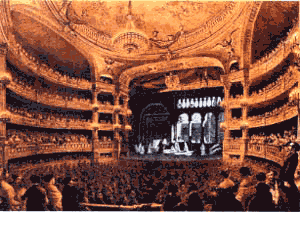 Through the windows of the Eisenstein home floats the serenade of Alfred, a tenor still in love with his old flame Rosalinde, now the wife of Gabriel von Eisenstein. Adele, a chambermaid, saunters in reading an invitation to a masked ball; Rosalinde, bedeviled by a headache and believing she has heard Alfred's voice, enters but finds only Adele. The maid asks for the evening off to visit a "sick aunt," a plea her mistress dismisses. Alfred steps into the room and begins to woo Rosalinde, who resists his verbal blandishments but melts on hearing his high A.
Through the windows of the Eisenstein home floats the serenade of Alfred, a tenor still in love with his old flame Rosalinde, now the wife of Gabriel von Eisenstein. Adele, a chambermaid, saunters in reading an invitation to a masked ball; Rosalinde, bedeviled by a headache and believing she has heard Alfred's voice, enters but finds only Adele. The maid asks for the evening off to visit a "sick aunt," a plea her mistress dismisses. Alfred steps into the room and begins to woo Rosalinde, who resists his verbal blandishments but melts on hearing his high A.
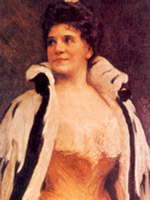 The suitor leaves as Eisenstein and his lawyer, Blind, arrive from a session in court: Eisenstein has been sentenced to a fortnight in jail for a civil offense. No sooner does he dismiss the incompetent advocate than his friend Falke comes to invite Eisenstein to a masquerade, suggesting he bring along his repeater stop-watch, which charms all the ladies, so he can accumulate pleasant memories to sustain him during his confinement in jail. Rosalinde joins Adele in a bittersweet farewell to Eisenstein before he goes off to prison, got up, to his wife's surprise, in full evening dress. Sending Adele to her "aunt," Rosalinde receives the ardent Alfred. Their tête-à-tête is interrupted by the warden Frank, who mistakes Alfred for the man he has come to arrest. Rosalinde persuades Alfred to save her name by posing as her husband, and Frank carts him off to jail.
The suitor leaves as Eisenstein and his lawyer, Blind, arrive from a session in court: Eisenstein has been sentenced to a fortnight in jail for a civil offense. No sooner does he dismiss the incompetent advocate than his friend Falke comes to invite Eisenstein to a masquerade, suggesting he bring along his repeater stop-watch, which charms all the ladies, so he can accumulate pleasant memories to sustain him during his confinement in jail. Rosalinde joins Adele in a bittersweet farewell to Eisenstein before he goes off to prison, got up, to his wife's surprise, in full evening dress. Sending Adele to her "aunt," Rosalinde receives the ardent Alfred. Their tête-à-tête is interrupted by the warden Frank, who mistakes Alfred for the man he has come to arrest. Rosalinde persuades Alfred to save her name by posing as her husband, and Frank carts him off to jail.
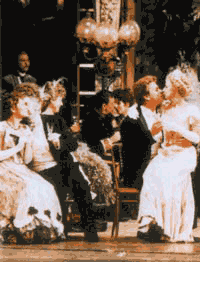 In an antechamber at the palace of Prince Orlofsky, the nobleman's guests, Adele and her cousin Ida among them, await the arrival of their host. Orlofsky enters, quite bored - even with Falke's promise of a comedy of errors. The prince proclaims his guests free to do anything that suits their fancy - "Chacun à son gout." Adele, dressed in one of Rosalinde's most elegant gowns, laughs off Eisenstein's suggestion that she resembles his wife's chambermaid. Frank enters, and Rosalinde, also invited by Falke, arrives disguised as a temperamental Hungarian countess; she is soon wooed by her own reeling husband, whose pocket watch she steals to hold as proof of his philandering. Rosalinde agrees to sing a song about her "native" land, a spirited czardas, after which the guests move on to a magnificent dining area to toast the joys of wine, good fellowship and love. Champagne flows, and the guests dance wildly until dawn. When the clock strikes six, Eisenstein staggers off to keep his appointment at the jail.
In an antechamber at the palace of Prince Orlofsky, the nobleman's guests, Adele and her cousin Ida among them, await the arrival of their host. Orlofsky enters, quite bored - even with Falke's promise of a comedy of errors. The prince proclaims his guests free to do anything that suits their fancy - "Chacun à son gout." Adele, dressed in one of Rosalinde's most elegant gowns, laughs off Eisenstein's suggestion that she resembles his wife's chambermaid. Frank enters, and Rosalinde, also invited by Falke, arrives disguised as a temperamental Hungarian countess; she is soon wooed by her own reeling husband, whose pocket watch she steals to hold as proof of his philandering. Rosalinde agrees to sing a song about her "native" land, a spirited czardas, after which the guests move on to a magnificent dining area to toast the joys of wine, good fellowship and love. Champagne flows, and the guests dance wildly until dawn. When the clock strikes six, Eisenstein staggers off to keep his appointment at the jail.
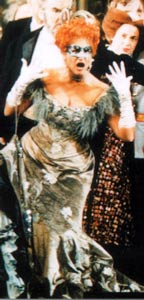 Moments later at the prison, Frosch, a drunken jailer, tries to keep order among the inmates, who are unable to sleep because of Alfred's singing. Frank arrives, still giddy with champagne, followed shortly by Ida and Adele, who, thinking him a theatrical agent, believes he might further her stage aspirations. Frank, hearing someone at the door, hides the girls in a cell and then admits Eisenstein, who has come to begin his sentence. The new prisoner is surprised to learn his cell is already occupied by a man who claims to be Eisenstein and who was found supping with Rosalinde; to obtain an explanation from the impostor, Eisenstein snatches a legal robe and wig from his astonished lawyer. No sooner is he disguised than Rosalinde hurries in to secure Alfred's release and press divorce charges against her errant husband. With her would-be paramour, she confides her flirtation to the "lawyer." Enraged, Eisenstein removes his disguise and accuses his wife of promiscuity, at which Rosalinde whips forth the watch she took from him at the ball. Orlofsky and his guests arrive to celebrate the reconciliation of Rosalinde and Eisenstein, singing a final toast as Eisenstein is taken away.
Moments later at the prison, Frosch, a drunken jailer, tries to keep order among the inmates, who are unable to sleep because of Alfred's singing. Frank arrives, still giddy with champagne, followed shortly by Ida and Adele, who, thinking him a theatrical agent, believes he might further her stage aspirations. Frank, hearing someone at the door, hides the girls in a cell and then admits Eisenstein, who has come to begin his sentence. The new prisoner is surprised to learn his cell is already occupied by a man who claims to be Eisenstein and who was found supping with Rosalinde; to obtain an explanation from the impostor, Eisenstein snatches a legal robe and wig from his astonished lawyer. No sooner is he disguised than Rosalinde hurries in to secure Alfred's release and press divorce charges against her errant husband. With her would-be paramour, she confides her flirtation to the "lawyer." Enraged, Eisenstein removes his disguise and accuses his wife of promiscuity, at which Rosalinde whips forth the watch she took from him at the ball. Orlofsky and his guests arrive to celebrate the reconciliation of Rosalinde and Eisenstein, singing a final toast as Eisenstein is taken away.
|
top |
|
Georg Friedrich Haendel
XERXES
|
|
| King Xerxes loves, kills and sings. |
|
| SYNOPSIS |
|
|
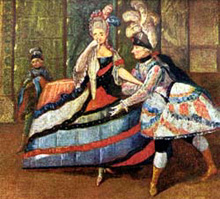 The three-act opera opens with Xerxes hearing the young Romilda singing on her terrace. His brother, Arsamene, also hears her and is provoked to jealousy for he is in love with Romilda. Arsamene wants to test Romilda's faithfulness to him so he hides when Xerxes invites Romilda to share his throne. She protests she cannot aspire to such giddy heights and, when Arsamene shows himself, Xerxes banishes him and goes off to Romilda to reproach her for spurning him. Romilda is determined to keep faith with Arsamene.
The three-act opera opens with Xerxes hearing the young Romilda singing on her terrace. His brother, Arsamene, also hears her and is provoked to jealousy for he is in love with Romilda. Arsamene wants to test Romilda's faithfulness to him so he hides when Xerxes invites Romilda to share his throne. She protests she cannot aspire to such giddy heights and, when Arsamene shows himself, Xerxes banishes him and goes off to Romilda to reproach her for spurning him. Romilda is determined to keep faith with Arsamene.
Amastre, who has previously been pledged to Xerxes in marriage, appears disguised as a soldier, and listens unseen while Xerxes longs to wed Romilda. Amastre is determined to get what is owed to her and discovers that while Xerxes loves Romilda, the lady does not return his affections.
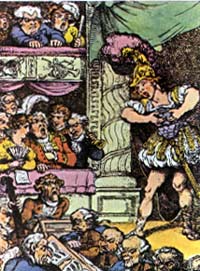
Xerxes tells Arsamene that he can marry the woman he chooses on the day Xerxes gets married himself and informs Romilda for good measure that Arsamene does not love her. Alone, Xerxes reflects that life would be simpler if one could either love another person, or not, as one chooses. At the same time, Romilda is alone reflecting that someone who gives up in the face of difficulties does not know what true love is.
Arsamene and Romilda fight since Romilda is accusing him of writing love-letters to her sister. Arsamene and Romilda reconcile only to discover Xerxes' plans to marry Romilda. The lovers are desperate, saying farewell to each other: Arsamene will go wherever fate wills and Romilda to her death. But fate intervenes and the lovers eventually see the return of peace and joy, and the reconciliation of the requirements of love with those of honour.
|
top |
|
Wolfgang Amadeus Mozart
DON GIOVANNI
|
|
| 23.997th affair turns sour. Lots of angry women. Don Giovanni goes to hell. |
|
| SYNOPSIS |
|
|
Seville, Spain, 17th century
Outside the Commendatore's house at night
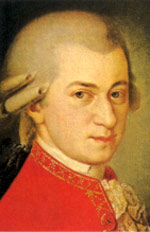 Leporello (Don Giovanni's servant) is standing guard outside the Commendatore's house as his master is inside on yet another amorous adventure. Donna Anna approaches, chasing Don Giovanni, who is concealing his face. Donna Anna's father, the Commendatore, appears and confronts Giovanni, demanding a duel for his daughter's honor. Giovanni doesn't wish to fight one as old as the Commendatore, but the fight begins with the Commendatore receiving a mortal wound. Donna Anna has fled to find help. Giovanni and Leporello escape and Donna Anna returns with Ottavio and faints over the body of her dead father . Ottavio invites her to marry him and take an oath of vengeance.
Leporello (Don Giovanni's servant) is standing guard outside the Commendatore's house as his master is inside on yet another amorous adventure. Donna Anna approaches, chasing Don Giovanni, who is concealing his face. Donna Anna's father, the Commendatore, appears and confronts Giovanni, demanding a duel for his daughter's honor. Giovanni doesn't wish to fight one as old as the Commendatore, but the fight begins with the Commendatore receiving a mortal wound. Donna Anna has fled to find help. Giovanni and Leporello escape and Donna Anna returns with Ottavio and faints over the body of her dead father . Ottavio invites her to marry him and take an oath of vengeance.
A street in Seville at dawn
Giovanni and Leporello see Donna Elvira, in travelling clothes so she is unrecognizable, pursuing a former lover. It turns out that Elvira is a former Giovanni conquest. Giovanni and Elvira recognize each other after Giovanni has made advances towards her. She is furious and he escapes her venom leaving Leporello to discuss Giovanni's many, many women. And although Giovanni is willing to take anyone, he prefers the young novice.
In the countryside, mid-morning
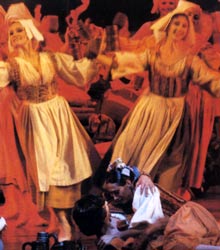 A peasant wedding is underway with Zerlina marrying Masetto. Giovanni is immediately attracted to Zerlina and invites the entire wedding party back to his house. Masetto immediately recognizes Giovanni and upbraids Zerlina. Giovanni flatters Zerlina with an offer of marriage. She wavers, still thinking about Masetto, but eventually submits to Giovanni's charms . Anna and Ottavio talk with Giovanni about their plans for vengeance (they are unaware that it was he who killed Anna's father), and he offers his assistance. Elvira interrupts and tells Anna not to trust Giovanni. While Anna and Ottavio are confused, Giovanni tries to quiet Elvira and tells everyone that she is quite mad. Elvira grows more vehement in her denunciation of Giovanni. In Giovanni's farewell to Elvira, Anna believes she recognizes him as the man who tried to seduce her the previous evening. She shares her concerns with Ottavio, who has a hard time believing in Giovanni's villainy. Giovanni congratulates Leporello on getting rid of Elvira and prepares for the afternoons activities which will include at least ten more conquests.
A peasant wedding is underway with Zerlina marrying Masetto. Giovanni is immediately attracted to Zerlina and invites the entire wedding party back to his house. Masetto immediately recognizes Giovanni and upbraids Zerlina. Giovanni flatters Zerlina with an offer of marriage. She wavers, still thinking about Masetto, but eventually submits to Giovanni's charms . Anna and Ottavio talk with Giovanni about their plans for vengeance (they are unaware that it was he who killed Anna's father), and he offers his assistance. Elvira interrupts and tells Anna not to trust Giovanni. While Anna and Ottavio are confused, Giovanni tries to quiet Elvira and tells everyone that she is quite mad. Elvira grows more vehement in her denunciation of Giovanni. In Giovanni's farewell to Elvira, Anna believes she recognizes him as the man who tried to seduce her the previous evening. She shares her concerns with Ottavio, who has a hard time believing in Giovanni's villainy. Giovanni congratulates Leporello on getting rid of Elvira and prepares for the afternoons activities which will include at least ten more conquests.
Giovanni's garden in the afternoon
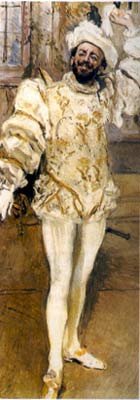 Zerlina wins back Masetto, though when she hears Giovanni's voice she becomes flustered. Giovanni gives orders to his servants and upon seeing the hiding Zerlina begins his amorous advances again. Masetto comes out of hiding to lead Zerlina into the house. Elvira, Anna and Ottavio approach the house in masks. Leporello sees them and invites them to the party (not recognizing them due to their masks). They pray for vengeance and enter.
Zerlina wins back Masetto, though when she hears Giovanni's voice she becomes flustered. Giovanni gives orders to his servants and upon seeing the hiding Zerlina begins his amorous advances again. Masetto comes out of hiding to lead Zerlina into the house. Elvira, Anna and Ottavio approach the house in masks. Leporello sees them and invites them to the party (not recognizing them due to their masks). They pray for vengeance and enter.
The ballroom in Giovanni's house
Giovanni and Leporello are entertaining the guests, while Masetto warns Zerlina to be careful. Everyone begins dancing. Giovanni drags Zerlina out to go to his bedroom, but she screams and Masetto rushes after them. Giovanni blames Leporello and offers to kill him on the spot. The vengeful trio unmask and, with Zerlina, denounce Giovanni. Using Leporello as a human shield, Giovanni and Leporello escape.
A street in Seville outside Donna Elvira's house
Leporello threatens to leave Giovanni unless Giovanni is willing to give up women. Giovanni claims he needs women as much as food and air. Giovanni suggests that he and Leporello exchange outfits so Giovanni can pursue Elvira's maid. Elvira appears at her window, still in love with Giovanni. Giovanni returns her affections, but she denounces him although weakening with his continued pleas. She comes down to the disguised Leporello (thinking him Giovanni) who has been told by Giovanni to keep her busy while he serenades the maid. But Masetto and his friends have arrived to kill Giovanni. The disguised Giovanni sympathizes with them and gives them directions on how to recognize Giovanni. Masetto stays with the disguised Giovanni while the remainder of the group goes out to search for him. After the group leaves, Giovanni beats Masetto and disappears. Hearing groans, Zerlina comes in to comfort Masetto.
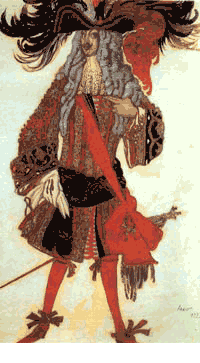 A courtyard at Donna Anna's house
A courtyard at Donna Anna's house
Seeing lights, Leporello and Elvira hide in the yard as Leporello intends to leave Elvira. She begs him not to leave her as he searches for an exit. Anna and Ottavio appear and he renews his marriage pledge. Elvira's search for "Giovanni" and Leporello's search for an exit are interrupted by Zerlina and Masetto. All denounce Giovanni, though Elvira pleads for mercy and Leporello identifies himself as just the servant following his master's orders. Everyone turns on Leporello who makes excuses as he escapes. Ottavio wants to go to the authorities and asks everyone else to watch over Anna while he avenges her.
A graveyard at night
Giovanni scales the walls of the graveyard to avoid another "adventure". Leporello joins him and is upset to discover that Giovanni's latest conquest has been a girl whom Leporello fancies. Giovanni's laughter is interrupted by a solemn voice that seems to be coming from the statue of the Commendatore. Giovanni and Leporello read the inscription on the tomb "I await vengeance on the villain who slew me". Giovanni forces Leporello to invite the statue to supper. The statue agrees and Giovanni and Leporello exit to prepare for the meal.
A darkened room in Donna Anna's house
Ottavio is pressuring Anna to marry him but she feels it is a most inappropriate time so close to her father's death. So be it, responds Ottavio.
The dining room in Don Giovanni's house
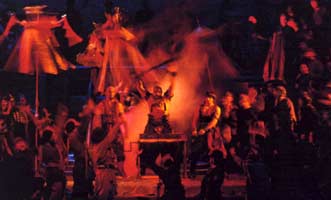 Giovanni is eating without waiting for his guest. Musicians are playing a variety of tunes as Leporello gets caught with his mouth full of stolen food. Elvira comes in and begs Giovanni to repent his ways. He laughs and says that wine and women are his two most favorite things and he will never give them up. Elvira, dejected, leaves. Outside, her scream is heard and when Leporello investigates, he returns in terror babbling about a white stone man. A knock is heard and Giovanni answers. It is the statue of the Commendatore. While the statue cannot eat, he invites Giovanni to join him and Giovanni accepts with a handshake. The Commendatore tells him he must repent which Giovanni refuses and is dragged into the flames of hell.
Giovanni is eating without waiting for his guest. Musicians are playing a variety of tunes as Leporello gets caught with his mouth full of stolen food. Elvira comes in and begs Giovanni to repent his ways. He laughs and says that wine and women are his two most favorite things and he will never give them up. Elvira, dejected, leaves. Outside, her scream is heard and when Leporello investigates, he returns in terror babbling about a white stone man. A knock is heard and Giovanni answers. It is the statue of the Commendatore. While the statue cannot eat, he invites Giovanni to join him and Giovanni accepts with a handshake. The Commendatore tells him he must repent which Giovanni refuses and is dragged into the flames of hell.
All rush in to discover a terrified Leporello. Ottavio again asks Anna to marry him, Anna replies that she will in a year, Elvira decides to enter a convent, Zerlina and Masetto will marry and Leporello will find a better job. All agree that Giovanni met an appropriate end "This is the end of the evil-doer: his death is as bad as his life."
|
top |
|
Richard Wagner
DER RING DES NIBELUNGEN
Tetralogy
|
|
|
|
DAS RHEINGOLD
|
|
|
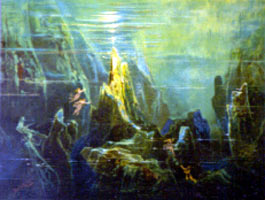 Deep in the Rhine, three of the river's daughters, custodians of a golden treasure, laugh while they play, scarcely noticing when Alberich emerges from a crevice. Seized by desire, the gnome tries to catch the Rhinemaidens as they dart through the waters, but his clumsy attempts lead to frustration. Taunts from his quarry merely quicken the Nibelung's lust and anger. Suddenly sunlight illuminates the summit of a rock - the Rhinegold. Hailing the precious hoard, the nymphs are astonished that Alberich does not know what it represents. The Rhinegold is all-powerful, they explain to him, and were it fashioned into a Ring, the wearer would rule the world. But the gold is safe, they continue confidently, for whoever would steal the treasure must renounce love. The Nibelung vows to seize the gold. Scrambling up the rock, Alberich forswears love, wrests the prize free and escapes. The waters are plunged into darkness as the Rhinemaidens lament their loss.
Deep in the Rhine, three of the river's daughters, custodians of a golden treasure, laugh while they play, scarcely noticing when Alberich emerges from a crevice. Seized by desire, the gnome tries to catch the Rhinemaidens as they dart through the waters, but his clumsy attempts lead to frustration. Taunts from his quarry merely quicken the Nibelung's lust and anger. Suddenly sunlight illuminates the summit of a rock - the Rhinegold. Hailing the precious hoard, the nymphs are astonished that Alberich does not know what it represents. The Rhinegold is all-powerful, they explain to him, and were it fashioned into a Ring, the wearer would rule the world. But the gold is safe, they continue confidently, for whoever would steal the treasure must renounce love. The Nibelung vows to seize the gold. Scrambling up the rock, Alberich forswears love, wrests the prize free and escapes. The waters are plunged into darkness as the Rhinemaidens lament their loss.
 As the sun rises over a mountainous plateau, Fricka and Wotan slumber on a bank of flowers. A fortress, their new home, gleams in the distance. When the two gods awaken, Wotan hails the building as a fulfillment of his dreams. Fricka reproaches her husband for having promised her sister Freia to the giants Fafner and Fasolt as payment for constructing the castle. Wotan replies that he never meant to keep the bargain. As the terrified Freia runs in, pursued by Fafner and Fasolt, Wotan says Loge (fire) will help the gods out of their dilemma. The giants advance to claim their reward. When Wotan protests he made the pact in jest, that they must settle for another fee, Fasolt, smitten with Freia, balks. Fafner, intrigued that the loss of Freia's golden apples would cost the gods their eternal youth and therefore their power, decides the goddess must be abducted. As the giants drag her away, Froh (spring) and Donner (thunder) bar their path, Donner brandishing his hammer. Wotan intervenes, saying all treaties are guaranteed on his spear. Denied Freia's golden apples, the gods begin to age.
As the sun rises over a mountainous plateau, Fricka and Wotan slumber on a bank of flowers. A fortress, their new home, gleams in the distance. When the two gods awaken, Wotan hails the building as a fulfillment of his dreams. Fricka reproaches her husband for having promised her sister Freia to the giants Fafner and Fasolt as payment for constructing the castle. Wotan replies that he never meant to keep the bargain. As the terrified Freia runs in, pursued by Fafner and Fasolt, Wotan says Loge (fire) will help the gods out of their dilemma. The giants advance to claim their reward. When Wotan protests he made the pact in jest, that they must settle for another fee, Fasolt, smitten with Freia, balks. Fafner, intrigued that the loss of Freia's golden apples would cost the gods their eternal youth and therefore their power, decides the goddess must be abducted. As the giants drag her away, Froh (spring) and Donner (thunder) bar their path, Donner brandishing his hammer. Wotan intervenes, saying all treaties are guaranteed on his spear. Denied Freia's golden apples, the gods begin to age.
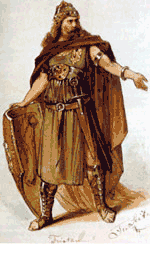 Loge, who originated the contract with the giants, and who at Wotan's command has been trying to find a suitable payment in lieu of Freia, materializes in a puff of smoke. The crafty god suggests that perhaps the Rhinegold might be an acceptable substitute. He then relates how Alberich stole the hoard, forging it into a Ring through which he can gain world dominance. Wotan is enthralled by the absolute power the Ring imparts, and when Fricka learns a wife could use the Ring to keep a philandering husband faithful, she urges Wotan to obtain it. Since the Rhinemaidens want Wotan to restore the gold to them, proposes Loge, why not steal it, as Alberich did? Fafner, who wants the gold, advises Wotan to use his wits to gain the treasure. Then, taking Freia hostage until evening, when the Nibelung's hoard must be delivered as ransom, the giants leave. No sooner does Freia disappear than the gods begin to weaken and age. Wotan, forced to make a decision, bids Loge accompany him to the nether world to seek Alberich's treasure.
Loge, who originated the contract with the giants, and who at Wotan's command has been trying to find a suitable payment in lieu of Freia, materializes in a puff of smoke. The crafty god suggests that perhaps the Rhinegold might be an acceptable substitute. He then relates how Alberich stole the hoard, forging it into a Ring through which he can gain world dominance. Wotan is enthralled by the absolute power the Ring imparts, and when Fricka learns a wife could use the Ring to keep a philandering husband faithful, she urges Wotan to obtain it. Since the Rhinemaidens want Wotan to restore the gold to them, proposes Loge, why not steal it, as Alberich did? Fafner, who wants the gold, advises Wotan to use his wits to gain the treasure. Then, taking Freia hostage until evening, when the Nibelung's hoard must be delivered as ransom, the giants leave. No sooner does Freia disappear than the gods begin to weaken and age. Wotan, forced to make a decision, bids Loge accompany him to the nether world to seek Alberich's treasure.
The clang of anvils pervades the dark caverns of Nibelheim, Alberich's domain, where he drives his slaves to mine gold to swell his hoard. Wearing the all-powerful Ring, the gnome torments Mime for the Tarnhelm he is fashioning. Mime, who covets this latest marvel for himself, must submit, and Alberich tries on the helmet, which transforms the wearer into any size or shape. The Tarnhelm also enables Alberich to become invisible, and he thrashes his defenseless brother, then vanishes to terrorize others.
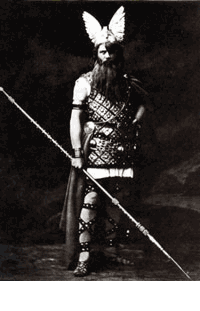 Soon Wotan and Loge descend through a shaft before the cowering Mime, who complains of Alberich's tyranny, saying he had hoped to outwit his brother by means of the Tarnhelm, regaining the Ring he forged. Unrecognized and amused by the complaining gnome, the gods offer to help the Nibelungs free themselves. Now Alberich returns, driving slaves who bear mounds of gold. He knows Wotan and Loge and suspiciously questions their trip to Nibelheim, arrogantly warning of his plan to overthrow the gods and rule the world. Loge asks the Nibelung what would happen if someone stole the Ring while he slept. How could they, the gnome asks, extolling the powers of the Tarnhelm. When Loge, feigning disbelief, asks for a demonstration, Alberich transforms himself into a large serpent, then back again. Loge asks whether the Tarnhelm can turn him into something small - a toad, for instance - so he can hide. Obligingly, Alberich becomes a toad, whereupon Wotan traps him under his foot and Loge seizes the Tarnhelm. As Alberich resumes his accustomed shape, he is tied and dragged by his captors to the surface of the earth.
Soon Wotan and Loge descend through a shaft before the cowering Mime, who complains of Alberich's tyranny, saying he had hoped to outwit his brother by means of the Tarnhelm, regaining the Ring he forged. Unrecognized and amused by the complaining gnome, the gods offer to help the Nibelungs free themselves. Now Alberich returns, driving slaves who bear mounds of gold. He knows Wotan and Loge and suspiciously questions their trip to Nibelheim, arrogantly warning of his plan to overthrow the gods and rule the world. Loge asks the Nibelung what would happen if someone stole the Ring while he slept. How could they, the gnome asks, extolling the powers of the Tarnhelm. When Loge, feigning disbelief, asks for a demonstration, Alberich transforms himself into a large serpent, then back again. Loge asks whether the Tarnhelm can turn him into something small - a toad, for instance - so he can hide. Obligingly, Alberich becomes a toad, whereupon Wotan traps him under his foot and Loge seizes the Tarnhelm. As Alberich resumes his accustomed shape, he is tied and dragged by his captors to the surface of the earth.
Once more on the plateau, Loge and Wotan inform their prisoner he cannot go free without forfeiting his hoard as ransom. Though outraged, he acquiesces, certain that through the Ring he can replenish his fortune. Loge unties his right hand, enabling Alberich to kiss the Ring to summon his slaves, who haul up the gold. The gods' command obeyed, he asks for the return of the Tarnhelm, but Loge says the gods will keep it. Wotan adds that the Ring also must be part of the booty, reminding the gnome that it was not rightfully his. Alberich retorts that Wotan is as much a thief as he, but this does not prevent the god from tearing the Ring from Alberich's finger. As Loge unfastens the Nibelung's bonds, the embittered gnome hurls forth a curse on the Ring: until it returns to his hand, may care, envy and death befall all who possess it.
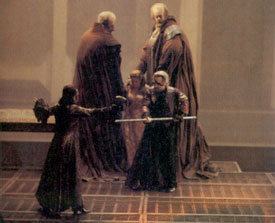 Alberich disappears as the other gods approach, followed by the giants with their hostage, Freia. Saddened at losing the goddess, Fasolt agrees to accept the Nibelung hoard only if it hides her from his view. The brothers thrust their clubs into the ground to support the treasure, which Loge and Froh heap up in front of Freia. Fafner complains that the gold is not quite enough - he can still see Freia's hair through a crack - forcing Loge to add the Tarnhelm to the hoard. Then Fasolt complains he can see the gleam of Freia's eye through a chink. At this Fafner demands the Ring, now on Wotan's finger. When Wotan refuses, the giants pull Freia from behind the hoard to abduct her. But darkness covers the mountaintop as a cleft in the ground opens and Erda materializes, roused from perpetual sleep by the conflict. The earth goddess warns Wotan to yield the Ring, which spells doom for the gods. Persuaded, Wotan tosses the Ring onto the hoard, whereupon Freia is released. At once Alberich's curse takes effect: the brothers quarrel over the spoils. Fafner kills Fasolt, claiming Ring, Tarnhelm and hoard for himself.
Alberich disappears as the other gods approach, followed by the giants with their hostage, Freia. Saddened at losing the goddess, Fasolt agrees to accept the Nibelung hoard only if it hides her from his view. The brothers thrust their clubs into the ground to support the treasure, which Loge and Froh heap up in front of Freia. Fafner complains that the gold is not quite enough - he can still see Freia's hair through a crack - forcing Loge to add the Tarnhelm to the hoard. Then Fasolt complains he can see the gleam of Freia's eye through a chink. At this Fafner demands the Ring, now on Wotan's finger. When Wotan refuses, the giants pull Freia from behind the hoard to abduct her. But darkness covers the mountaintop as a cleft in the ground opens and Erda materializes, roused from perpetual sleep by the conflict. The earth goddess warns Wotan to yield the Ring, which spells doom for the gods. Persuaded, Wotan tosses the Ring onto the hoard, whereupon Freia is released. At once Alberich's curse takes effect: the brothers quarrel over the spoils. Fafner kills Fasolt, claiming Ring, Tarnhelm and hoard for himself.
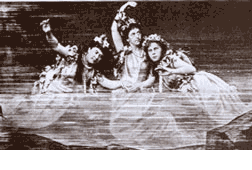 After he has gone, Fricka bids Wotan turn his thoughts to their new home. Donner summons
lightning and thunder to dispel thick mists that have enveloped the mountaintop.
As the heavens clear, a rainbow forms a bridge to the fortress.
Noting how the setting sun gilds the noble structure, Wotan tells Fricka their
abode is called Valhalla. As Wotan leads the other gods across the rainbow -
all except Loge, who mutters that they are going to their doom - the Rhinemaidens
are heard from the valley below, grieving for their lost treasure.
After he has gone, Fricka bids Wotan turn his thoughts to their new home. Donner summons
lightning and thunder to dispel thick mists that have enveloped the mountaintop.
As the heavens clear, a rainbow forms a bridge to the fortress.
Noting how the setting sun gilds the noble structure, Wotan tells Fricka their
abode is called Valhalla. As Wotan leads the other gods across the rainbow -
all except Loge, who mutters that they are going to their doom - the Rhinemaidens
are heard from the valley below, grieving for their lost treasure.
|
top |
|
|
DIE WALKÜRE
|
|
|
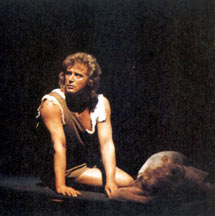 As a storm rages, Siegmund the Walsung, exhausted from pursuit by enemies in the forest, stumbles into an unfamiliar house for shelter. Sieglinde finds the stranger lying by the hearth, and the two feel an immediate attraction. But they are soon interrupted by Sieglinde's husband, Hunding, who asks the stranger who he is. Calling himself "Woeful," Siegmund tells of a disaster-filled life ("Friedmund darf ich nicht heissen"), only to learn that Hunding is a kinsman of his foes. Hunding, before retiring, tells his guest to defend himself in the morning. Left alone, Siegmund calls on his father, Walse, for the sword he once promised him. Sieglinde reappears, having given Hunding a sleeping potion. She tells of her wedding, at which a one-eyed stranger thrust into a tree a sword that thereafter resisted every effort to pull it out ("Der Manner Sippe"). Sieglinde confesses her unhappiness to Siegmund, whereupon he ardently embraces her and vows to free her from her forced marriage to Hunding. As moonlight floods the room, Siegmund compares their feeling to the marriage of love and spring ("Wintersturme"). Sieglinde hails him as "Spring" ("Du bist der Lenz") but asks if his father was really "Wolf," as he said earlier. When Siegmund gives his father's name as Walse instead, Sieglinde rapturously recognizes him as Siegmund, her twin brother. The Walsung now draws the sword from the tree and claims Sieglinde as his bride, rejoicing in the union of the Walsungs.
As a storm rages, Siegmund the Walsung, exhausted from pursuit by enemies in the forest, stumbles into an unfamiliar house for shelter. Sieglinde finds the stranger lying by the hearth, and the two feel an immediate attraction. But they are soon interrupted by Sieglinde's husband, Hunding, who asks the stranger who he is. Calling himself "Woeful," Siegmund tells of a disaster-filled life ("Friedmund darf ich nicht heissen"), only to learn that Hunding is a kinsman of his foes. Hunding, before retiring, tells his guest to defend himself in the morning. Left alone, Siegmund calls on his father, Walse, for the sword he once promised him. Sieglinde reappears, having given Hunding a sleeping potion. She tells of her wedding, at which a one-eyed stranger thrust into a tree a sword that thereafter resisted every effort to pull it out ("Der Manner Sippe"). Sieglinde confesses her unhappiness to Siegmund, whereupon he ardently embraces her and vows to free her from her forced marriage to Hunding. As moonlight floods the room, Siegmund compares their feeling to the marriage of love and spring ("Wintersturme"). Sieglinde hails him as "Spring" ("Du bist der Lenz") but asks if his father was really "Wolf," as he said earlier. When Siegmund gives his father's name as Walse instead, Sieglinde rapturously recognizes him as Siegmund, her twin brother. The Walsung now draws the sword from the tree and claims Sieglinde as his bride, rejoicing in the union of the Walsungs.
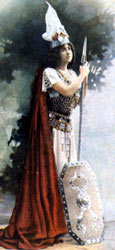 High in the mountains, Wotan, leader of the gods, tells his warrior daughter Brünnhilde she must defend his mortal son Siegmund. Leaving joyfully to do his bidding ("Hojotoho!"), the Valkyrie pauses to note the approach of Fricka, Wotan's wife and the goddess of marriage. Fricka insists he must defend Hunding's marriage rights against Siegmund, ignoring Wotan's implied argument that Siegmund could save the gods by winning back the Rhinegold from the dragon Fafner before the Nibelung dwarfs regain it. When Wotan realizes he is caught in his own trap - his power will leave him if he does not enforce the law - he agrees to his wife's demands. After Fricka has left in triumph, the frustrated god tells the returning Brünnhilde about the theft of the gold and Alberich's curse on it ("Als junger Liebe"). Brünnhilde is shocked to hear her father, his plans in ruins, order her to fight for Hunding. Then, alone in the darkness, she withdraws as Siegmund and Sieglinde approach. Siegmund comforts the distraught girl, who feels herself unworthy of him, and watches over her when she falls asleep.
High in the mountains, Wotan, leader of the gods, tells his warrior daughter Brünnhilde she must defend his mortal son Siegmund. Leaving joyfully to do his bidding ("Hojotoho!"), the Valkyrie pauses to note the approach of Fricka, Wotan's wife and the goddess of marriage. Fricka insists he must defend Hunding's marriage rights against Siegmund, ignoring Wotan's implied argument that Siegmund could save the gods by winning back the Rhinegold from the dragon Fafner before the Nibelung dwarfs regain it. When Wotan realizes he is caught in his own trap - his power will leave him if he does not enforce the law - he agrees to his wife's demands. After Fricka has left in triumph, the frustrated god tells the returning Brünnhilde about the theft of the gold and Alberich's curse on it ("Als junger Liebe"). Brünnhilde is shocked to hear her father, his plans in ruins, order her to fight for Hunding. Then, alone in the darkness, she withdraws as Siegmund and Sieglinde approach. Siegmund comforts the distraught girl, who feels herself unworthy of him, and watches over her when she falls asleep.
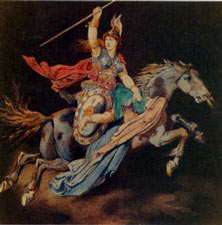 Brünnhilde appears to him as if in a vision, telling him he will soon go to Valhalla (Todesverkundigung: "Siegmund! Sieh auf mich!"), but when he says he will not leave Sieglinde and threatens to kill himself and his bride if his sword has no power against Hunding, she decides to help him in spite of Wotan's command. She vanishes. Siegmund bids farewell to Sieglinde when he hears the approaching Hunding's challenge. When Siegmund is about to win, however, Wotan appears and shatters his sword, leaving him to be killed by Hunding. Brünnhilde escapes with Sieglinde and the broken sword. Wotan contemptuously fells Hunding with a wave of his hand and leaves to punish Brünnhilde.
Brünnhilde appears to him as if in a vision, telling him he will soon go to Valhalla (Todesverkundigung: "Siegmund! Sieh auf mich!"), but when he says he will not leave Sieglinde and threatens to kill himself and his bride if his sword has no power against Hunding, she decides to help him in spite of Wotan's command. She vanishes. Siegmund bids farewell to Sieglinde when he hears the approaching Hunding's challenge. When Siegmund is about to win, however, Wotan appears and shatters his sword, leaving him to be killed by Hunding. Brünnhilde escapes with Sieglinde and the broken sword. Wotan contemptuously fells Hunding with a wave of his hand and leaves to punish Brünnhilde.
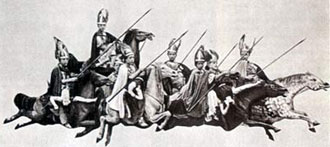 On the Valkyries' Rock, Brünnhilde's eight warrior sisters - who have gathered there briefly, bearing slain heroes to Valhalla - are surprised to see her enter with Sieglinde. When they hear she is fleeing Wotan's wrath, they are afraid to hide her. Sieglinde is numb with despair until Brünnhilde tells her she bears Siegmund's child. Eager to be saved, she receives the pieces of the sword from Brünnhilde and ecstatically thanks her rescuer as she rushes off into the forest to hide near Fafner's cave, a place safe from Wotan. When the god appears, he sentences Brünnhilde to become a mortal woman, silencing her sisters' objections by threatening to do the same to them.
On the Valkyries' Rock, Brünnhilde's eight warrior sisters - who have gathered there briefly, bearing slain heroes to Valhalla - are surprised to see her enter with Sieglinde. When they hear she is fleeing Wotan's wrath, they are afraid to hide her. Sieglinde is numb with despair until Brünnhilde tells her she bears Siegmund's child. Eager to be saved, she receives the pieces of the sword from Brünnhilde and ecstatically thanks her rescuer as she rushes off into the forest to hide near Fafner's cave, a place safe from Wotan. When the god appears, he sentences Brünnhilde to become a mortal woman, silencing her sisters' objections by threatening to do the same to them.
Left alone with her father, Brünnhilde pleads that in disobeying his orders she was really doing what he wished ("War es so schmahlich"). Wotan will not relent: she must lie in sleep, booty for any man who finds her. But as his anger abates she asks the favor of being surrounded in sleep by a wall of fire that only the bravest hero can pierce. Both sense this hero must be the child that Sieglinde will bear. Sadly renouncing his daughter ("Leb' wohl"), Wotan kisses Brünnhilde's eyes with sleep and mortality before summoning Loge, the spirit of fire, to encircle the rock. As flames spring up, the departing Wotan invokes a spell forbidding the rock to anyone who fears his spear (Fire Music).
|
top |
|
|
SIEGFRIED
|
|
|
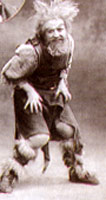 In his cavern workshop near Fafner's lair, Mime complains bitterly as he toils at an anvil to forge a new sword for Siegfried, who has grown to manhood. The impotent, hate-filled Nibelung has fashioned many blades for his ward, but they always broke into pieces when tested. Though Mime secretly has kept the shattered Nothung, the magic sword wielded by Siegfried's father, he lacks the skill to restore its fragments. If he could do so, with Siegfried's help, he would fulfill his dream of obtaining Fafner's Ring and becoming ruler of the world. A hunting horn announces the approach of Siegfried, who bounds in with a bear he has captured, playfully scaring Mime before releasing the animal to the forest. Impatient for a new sword, Siegfried grasps Mime's latest effort, only to have the weapon snap like a toy in his hands. To avoid the headstrong youth's anger, the Nibelung offers kind words and food, both brusquely rebuffed. At this, Mime whiningly reminds Siegfried of the long years he has looked after him and all he has taught him. Siegfried retorts he has never learned to tolerate the sight of Mime, nor does he know why he continues to live with him. They do not resemble each other, he says, and grabbing Mime by the throat, he demands to know who his real parents were. The Nibelung confesses that years ago he found a woman in distress in the woods and nursed her as she died giving birth. Her name was Sieglinde, and the baby's father had fallen in combat; Siegfried's name is a legacy from his mother. Moved by the story, Siegfried asks for proof of what he has been told, at which Mime takes forth the splintered remnants of the sword Nothung. At once the youth insists the weapon be welded whole, so he can go forth into the world to seek adventure. Siegfried runs back into the forest.
In his cavern workshop near Fafner's lair, Mime complains bitterly as he toils at an anvil to forge a new sword for Siegfried, who has grown to manhood. The impotent, hate-filled Nibelung has fashioned many blades for his ward, but they always broke into pieces when tested. Though Mime secretly has kept the shattered Nothung, the magic sword wielded by Siegfried's father, he lacks the skill to restore its fragments. If he could do so, with Siegfried's help, he would fulfill his dream of obtaining Fafner's Ring and becoming ruler of the world. A hunting horn announces the approach of Siegfried, who bounds in with a bear he has captured, playfully scaring Mime before releasing the animal to the forest. Impatient for a new sword, Siegfried grasps Mime's latest effort, only to have the weapon snap like a toy in his hands. To avoid the headstrong youth's anger, the Nibelung offers kind words and food, both brusquely rebuffed. At this, Mime whiningly reminds Siegfried of the long years he has looked after him and all he has taught him. Siegfried retorts he has never learned to tolerate the sight of Mime, nor does he know why he continues to live with him. They do not resemble each other, he says, and grabbing Mime by the throat, he demands to know who his real parents were. The Nibelung confesses that years ago he found a woman in distress in the woods and nursed her as she died giving birth. Her name was Sieglinde, and the baby's father had fallen in combat; Siegfried's name is a legacy from his mother. Moved by the story, Siegfried asks for proof of what he has been told, at which Mime takes forth the splintered remnants of the sword Nothung. At once the youth insists the weapon be welded whole, so he can go forth into the world to seek adventure. Siegfried runs back into the forest.
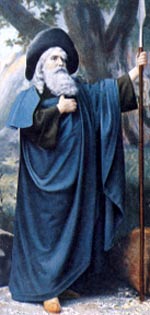 As Mime sits dejected, an aged Wanderer (Wotan) appears. Soon the unwanted guest proposes a battle of wits in which he will forfeit his head should he lose. Mime, though suspicious, agrees, then proceeds to ask the Wanderer three questions: what race lives under the earth (the Nibelungs), on the face of the earth (the giants) and on the cloudy heights (the gods)? The Wanderer answers correctly, then declares that Mime too must answer three questions, to save his own head: what is the race Wotan mistreats but loves most (the Walsungs), what is the sword Siegfried must use if he is to kill the dragon Fafner (Nothung), and who will repair the weapon? When Mime cannot answer the last question, the Wanderer tells him the sword can be forged only by one who has never known fear - and he leaves the gnome's head as bounty to that person.
As Mime sits dejected, an aged Wanderer (Wotan) appears. Soon the unwanted guest proposes a battle of wits in which he will forfeit his head should he lose. Mime, though suspicious, agrees, then proceeds to ask the Wanderer three questions: what race lives under the earth (the Nibelungs), on the face of the earth (the giants) and on the cloudy heights (the gods)? The Wanderer answers correctly, then declares that Mime too must answer three questions, to save his own head: what is the race Wotan mistreats but loves most (the Walsungs), what is the sword Siegfried must use if he is to kill the dragon Fafner (Nothung), and who will repair the weapon? When Mime cannot answer the last question, the Wanderer tells him the sword can be forged only by one who has never known fear - and he leaves the gnome's head as bounty to that person.
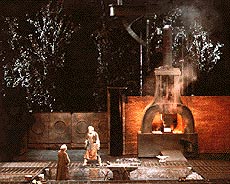 Hearing distant growls, Mime panics, thinking Fafner is coming, but it is only Siegfried, eager to wield his father's sword. Mime tries to find out whether the youth comprehends the meaning of fear. Since he does not, Mime decides to take him to Fafner's lair, where surely he will learn. When Siegfried once more orders Mime to finish Nothung, the Nibelung sobs that he lacks the craft, at which Siegfried repairs the sword himself, launching into a spirited forging song as he works. While the youth toils, Mime plots to get rid of him once the dragon has been killed and the treasure recovered. Siegfried brandishes the finished sword, splits the anvil with it and rushes into the forest.
Hearing distant growls, Mime panics, thinking Fafner is coming, but it is only Siegfried, eager to wield his father's sword. Mime tries to find out whether the youth comprehends the meaning of fear. Since he does not, Mime decides to take him to Fafner's lair, where surely he will learn. When Siegfried once more orders Mime to finish Nothung, the Nibelung sobs that he lacks the craft, at which Siegfried repairs the sword himself, launching into a spirited forging song as he works. While the youth toils, Mime plots to get rid of him once the dragon has been killed and the treasure recovered. Siegfried brandishes the finished sword, splits the anvil with it and rushes into the forest.
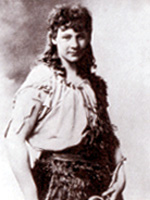 That night, Alberich keeps vigil near Fafner's cave, brooding over his lost treasure, determined to regain the Ring. When the Wanderer approaches, bathed in eerie light, the Nibelung at once recognizes him as Wotan. The god assures him that he no longer cares about the Ring - he is now only an observer of destiny. He adds that it is Mime whom Alberich should fear, for Mime wants the gold and brings a valiant young hero to slay Fafner. The Nibelung is perplexed that his enemy seems to be helping him. Wotan and Alberich rouse the sleeping Fafner to warn him of approaching danger, urging him to surrender the Ring, but Fafner only mumbles he will devour any attacker. God and Nibelung disappear in the shadows.
That night, Alberich keeps vigil near Fafner's cave, brooding over his lost treasure, determined to regain the Ring. When the Wanderer approaches, bathed in eerie light, the Nibelung at once recognizes him as Wotan. The god assures him that he no longer cares about the Ring - he is now only an observer of destiny. He adds that it is Mime whom Alberich should fear, for Mime wants the gold and brings a valiant young hero to slay Fafner. The Nibelung is perplexed that his enemy seems to be helping him. Wotan and Alberich rouse the sleeping Fafner to warn him of approaching danger, urging him to surrender the Ring, but Fafner only mumbles he will devour any attacker. God and Nibelung disappear in the shadows.
As dawn breaks, sunlight penetrates the dense foliage of the forest. Mime enters with Siegfried, showing him Fafner's lair. Dismissed by the youth, the treacherous gnome hobbles off. Siegfried stretches on the ground under a lime tree to rest, enchanted by the murmur of the forest, yearning for the mother he never knew. High in the branches over his head, a Forest Bird warbles a song he wishes he could understand. Cutting a reed and blowing on it, Siegfried tries to imitate the bird.
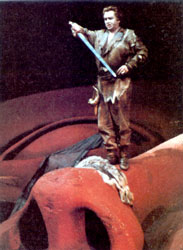 Then he raises his silver hunting horn to his lips, inadvertently awakening Fafner, who rumbles forth from his den. During the ensuing struggle, Siegfried plunges his sword into the monster's heart. Dying, Fafner warns that whoever put Siegfried up to this deed is plotting his death as well. When Siegfried draws Nothung from the beast, his fingers are burned by blood, so he touches them to his lips. The taste of the dragon's blood enables him to understand the language of the Forest Bird, who tells him of the Nibelung hoard, the Tarnhelm and all-powerful Ring. As Siegfried disappears into the cave to inspect the treasure, Mime slinks back, only to be confronted by Alberich. The brothers quarrel over the spoils, withdrawing when Siegfried reappears, carrying proof of his victory - the Tarnhelm, which he fastens to his belt, and the Ring, which he places on his hand. Now the Forest Bird warns Siegfried about Mime, who soon creeps forward, bearing a poisoned drink. Reading the dwarf's true thoughts, the youth loses patience with the Nibelung and kills him, as Alberich's laughter echoes in the distance. While Siegfried rests, lamenting his solitude, the bird tells of a maiden who sleeps on a fire-encircled rock - Brünnhilde, a bride who can be won only by a hero who knows no fear. The youth runs through the forest toward the mountain where she sleeps.
Then he raises his silver hunting horn to his lips, inadvertently awakening Fafner, who rumbles forth from his den. During the ensuing struggle, Siegfried plunges his sword into the monster's heart. Dying, Fafner warns that whoever put Siegfried up to this deed is plotting his death as well. When Siegfried draws Nothung from the beast, his fingers are burned by blood, so he touches them to his lips. The taste of the dragon's blood enables him to understand the language of the Forest Bird, who tells him of the Nibelung hoard, the Tarnhelm and all-powerful Ring. As Siegfried disappears into the cave to inspect the treasure, Mime slinks back, only to be confronted by Alberich. The brothers quarrel over the spoils, withdrawing when Siegfried reappears, carrying proof of his victory - the Tarnhelm, which he fastens to his belt, and the Ring, which he places on his hand. Now the Forest Bird warns Siegfried about Mime, who soon creeps forward, bearing a poisoned drink. Reading the dwarf's true thoughts, the youth loses patience with the Nibelung and kills him, as Alberich's laughter echoes in the distance. While Siegfried rests, lamenting his solitude, the bird tells of a maiden who sleeps on a fire-encircled rock - Brünnhilde, a bride who can be won only by a hero who knows no fear. The youth runs through the forest toward the mountain where she sleeps.
By night, as thunder and lightning threaten a wild mountain gorge, the Wanderer summons Erda from sleep. Concealing his identity, he seeks knowledge of the future. Erda evades the questions, and the god, resigning himself to Valhalla's doom, bequeaths the world to the redemptive power of Brünnhilde's love. When Siegfried ventures into the gorge, the Wanderer encounters his grandson, inquiring with humor about his exploits and the sword he wears. Siegfried responds arrogantly, angering the god, who tries to block his path. Drawing Nothung, the youth splinters the Wanderer's spear with a single stroke. Realizing his power has ended, the deity retrieves the broken pieces, then vanishes as Siegfried scales the mountain.
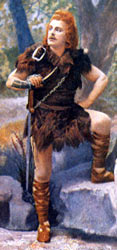 Dawn breaks on the rocky height where Brünnhilde rests. Reaching the summit, Siegfried discovers an armed, sleeping figure, which he assumes to be a man. When he removes the Valkyrie's shield, helmet and breastplate, however, he finds instead the first woman he has ever seen. At last sensing fear, he invokes the spirit of his mother, finally summoning the courage to kiss the maiden's lips. Brünnhilde, roused from her long slumber, slowly realizes she is not dreaming, that Siegfried has come. She hails the sunlight and her return to life. When Siegfried tries to embrace her, she starts in alarm, protesting that earthly passion would destroy her immortality. But she is mortal, no longer a Valkyrie, and womanly ardor soon replaces shame and fear. Throwing herself into Siegfried's arms, she bids farewell to memories of Valhalla, abandoning herself to human love, exulting even in thoughts of death.
Dawn breaks on the rocky height where Brünnhilde rests. Reaching the summit, Siegfried discovers an armed, sleeping figure, which he assumes to be a man. When he removes the Valkyrie's shield, helmet and breastplate, however, he finds instead the first woman he has ever seen. At last sensing fear, he invokes the spirit of his mother, finally summoning the courage to kiss the maiden's lips. Brünnhilde, roused from her long slumber, slowly realizes she is not dreaming, that Siegfried has come. She hails the sunlight and her return to life. When Siegfried tries to embrace her, she starts in alarm, protesting that earthly passion would destroy her immortality. But she is mortal, no longer a Valkyrie, and womanly ardor soon replaces shame and fear. Throwing herself into Siegfried's arms, she bids farewell to memories of Valhalla, abandoning herself to human love, exulting even in thoughts of death.
|
top |
|
|
GÖTTERDÄMMERUNG
|
|
|
 On the Valkyries' rock, three Norns spin the rope of Fate, recalling Wotan's days of power and predicting the end of the Gods. When the rope breaks they descend in terror to their mother, Erda, goddess of the earth. At dawn Siegfried and his bride, Brünnhilde, emerge from their cave ("Zu neuen Taten"). Though fearful that she may lose the hero, she sends him forth to deeds of valor. As a token of his love, Siegfried gives Brünnhilde the magic Ring he took from Fafner, and she gives him her horse Grane in exchange. Passionately they bid farewell as Siegfried sets off into the world (Rhine Journey).
On the Valkyries' rock, three Norns spin the rope of Fate, recalling Wotan's days of power and predicting the end of the Gods. When the rope breaks they descend in terror to their mother, Erda, goddess of the earth. At dawn Siegfried and his bride, Brünnhilde, emerge from their cave ("Zu neuen Taten"). Though fearful that she may lose the hero, she sends him forth to deeds of valor. As a token of his love, Siegfried gives Brünnhilde the magic Ring he took from Fafner, and she gives him her horse Grane in exchange. Passionately they bid farewell as Siegfried sets off into the world (Rhine Journey).
 In their castle on the Rhine, Gunther, Lord of the Gibichungs, and his sister Gutrune, both unwed, ask counsel of their half-brother, Hagen. Plotting to secure the Ring, Hagen advises Gunther to marry Brünnhilde: by means of a magic potion Siegfried can be induced to forget his bride and win her for Gunther in return for Gutrune's hand. The hero's horn announces his approach. Gunther welcomes him, and Gutrune offers him the potion. Remembering Brünnhilde, he drinks and forgets all, quickly succumbing to Gutrune's beauty and agreeing to bring Brünnhilde to Gunther. The two men swear an oath of blood brotherhood ("Bluhenden Lebens"), and then depart. Hagen, left to keep watch, broods on his plot's success ("Hier sitz ich zur Wacht").
In their castle on the Rhine, Gunther, Lord of the Gibichungs, and his sister Gutrune, both unwed, ask counsel of their half-brother, Hagen. Plotting to secure the Ring, Hagen advises Gunther to marry Brünnhilde: by means of a magic potion Siegfried can be induced to forget his bride and win her for Gunther in return for Gutrune's hand. The hero's horn announces his approach. Gunther welcomes him, and Gutrune offers him the potion. Remembering Brünnhilde, he drinks and forgets all, quickly succumbing to Gutrune's beauty and agreeing to bring Brünnhilde to Gunther. The two men swear an oath of blood brotherhood ("Bluhenden Lebens"), and then depart. Hagen, left to keep watch, broods on his plot's success ("Hier sitz ich zur Wacht").
On the Valkyries' rock, Brünnhilde greets her sister Waltraute, who says Wotan has warned the gods their doom is sealed unless Brünnhilde yields the Ring to the Rhinemaidens. But Brünnhilde's new love for Siegfried is more important to her than concern for the Gods. She refuses to give up the Ring, and Waltraute rides off in despair. Dusk falls as Siegfried returns transformed by the Tarnhelm into Gunther's form. He tears the Ring from the terrified Brünnhilde's finger and claims her as Gunther's Bride.
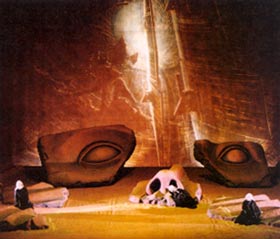 At night, before the Gibichung hall, Hagen dreams of his father, the Nibelung Alberich, who forces him to swear he will regain the Ring ("Schlafst du, Hagen?"). As dawn breaks, Siegfried returns with cheerful greetings for Hagen and Gutrune: he has won Brünnhilde for Gunther. Hagen summons the vassals to welcome the king and his bride ("Hoiho, Hoiho!"). When Gunther leads in Brünnhilde, she is startled at seeing Siegfried; observing the Ring on his finger, she decries his treachery and proclaims Siegfried her true husband ("Heilige Gotter!"). Still under the potion's spell, the hero vows upon Hagen's spear that he has never wronged her ("Helle Wehr! Heilige Waffe!"). Brünnhilde swears he lies, but Siegfried dismisses her charge and leaves with Gutrune. The dazed Brünnhilde, bent on revenge ("Welches Unhold's List"), reveals to Hagen the hero's one vulnerable spot: a spear in the back will kill him. Taunted by Brünnhilde and lured by Hagen's description of the Ring's power, Gunther joins the murder plot. The couples proceed to the wedding feast.
At night, before the Gibichung hall, Hagen dreams of his father, the Nibelung Alberich, who forces him to swear he will regain the Ring ("Schlafst du, Hagen?"). As dawn breaks, Siegfried returns with cheerful greetings for Hagen and Gutrune: he has won Brünnhilde for Gunther. Hagen summons the vassals to welcome the king and his bride ("Hoiho, Hoiho!"). When Gunther leads in Brünnhilde, she is startled at seeing Siegfried; observing the Ring on his finger, she decries his treachery and proclaims Siegfried her true husband ("Heilige Gotter!"). Still under the potion's spell, the hero vows upon Hagen's spear that he has never wronged her ("Helle Wehr! Heilige Waffe!"). Brünnhilde swears he lies, but Siegfried dismisses her charge and leaves with Gutrune. The dazed Brünnhilde, bent on revenge ("Welches Unhold's List"), reveals to Hagen the hero's one vulnerable spot: a spear in the back will kill him. Taunted by Brünnhilde and lured by Hagen's description of the Ring's power, Gunther joins the murder plot. The couples proceed to the wedding feast.
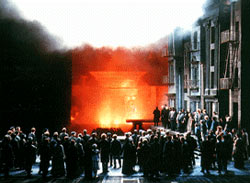 On the bank of the Rhine the three Rhinemaidens bewail their lost treasure ("Frau Sonne sendet lichte Strahlen"). Soon Siegfried approaches, separated from his hunting party. The maidens plead for the Ring, but he ignores both their entreaties and warnings. When the hunters arrive, Siegfried at Hagen's urging describes his boyhood with Mime (his Nibelung foster father), his slaying of the dragon Fafner and finally - after Hagen gives him a potion to restore his memory - his wooing of Brünnhilde ("Mime hiess ein murrischer Zwerg"). Pretending indignation, Hagen plunges a spear into the hero's back. Remembering Brünnhilde with his last breath, Siegfried dies and is borne off (Funeral Music).
On the bank of the Rhine the three Rhinemaidens bewail their lost treasure ("Frau Sonne sendet lichte Strahlen"). Soon Siegfried approaches, separated from his hunting party. The maidens plead for the Ring, but he ignores both their entreaties and warnings. When the hunters arrive, Siegfried at Hagen's urging describes his boyhood with Mime (his Nibelung foster father), his slaying of the dragon Fafner and finally - after Hagen gives him a potion to restore his memory - his wooing of Brünnhilde ("Mime hiess ein murrischer Zwerg"). Pretending indignation, Hagen plunges a spear into the hero's back. Remembering Brünnhilde with his last breath, Siegfried dies and is borne off (Funeral Music).
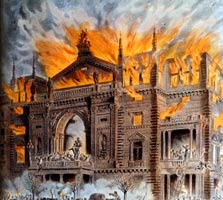 At the Gibichung hall, Gutrune nervously awaits her bridegroom's return. Hagen tells her Siegfried has been killed by a wild boar, but when his body is carried in she accuses Gunther of murder. Hagen admits the crime ("Ja denn! Ich hab'ihn erschlegen"). Quarreling over the Ring, Gunther is killed by Hagen, who falls back in fear when the dead Siegfried raises his hand. Brünnhilde, entering, orders a funeral pyre for Siegfried ("Starke Scheite"). She condemns the gods for their guilt in his death, takes the Ring, and promises it to the Rhinemaidens. Placing it on her finger, she throws a torch onto the pyre and joyfully rushes into the flames. As the river overflows its banks and the Gibichung hall is consumed, the Rhinemaidens, dragging Hagen to his death, regain their gold, at last purified of its curse. Flames engulf Valhalla, leaving a human world redeemed by love.
At the Gibichung hall, Gutrune nervously awaits her bridegroom's return. Hagen tells her Siegfried has been killed by a wild boar, but when his body is carried in she accuses Gunther of murder. Hagen admits the crime ("Ja denn! Ich hab'ihn erschlegen"). Quarreling over the Ring, Gunther is killed by Hagen, who falls back in fear when the dead Siegfried raises his hand. Brünnhilde, entering, orders a funeral pyre for Siegfried ("Starke Scheite"). She condemns the gods for their guilt in his death, takes the Ring, and promises it to the Rhinemaidens. Placing it on her finger, she throws a torch onto the pyre and joyfully rushes into the flames. As the river overflows its banks and the Gibichung hall is consumed, the Rhinemaidens, dragging Hagen to his death, regain their gold, at last purified of its curse. Flames engulf Valhalla, leaving a human world redeemed by love.
|
top |
|
Giacomo Puccini
TOSCA
|
|
|
| SYNOPSIS |
|
|
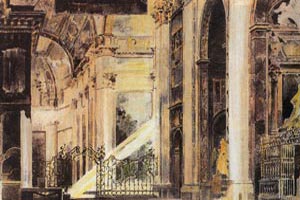 Cesare Angelotti, an escaped political prisoner, rushes into the church of Sant' Andrea della Valle to hide in the Attavanti chapel. As he vanishes, an old Sacristan shuffles in, praying at the sound of the Angelus. Mario Cavaradossi enters to work on his portrait of Mary Magdalene - inspired by the Marchesa Attavanti (Angelotti's sister), whom he has seen but does not know. Taking out a miniature of the singer Floria Tosca, he compares her raven beauty with that of the blonde Magdalene. The Sacristan grumbles disapproval and leaves.
Cesare Angelotti, an escaped political prisoner, rushes into the church of Sant' Andrea della Valle to hide in the Attavanti chapel. As he vanishes, an old Sacristan shuffles in, praying at the sound of the Angelus. Mario Cavaradossi enters to work on his portrait of Mary Magdalene - inspired by the Marchesa Attavanti (Angelotti's sister), whom he has seen but does not know. Taking out a miniature of the singer Floria Tosca, he compares her raven beauty with that of the blonde Magdalene. The Sacristan grumbles disapproval and leaves.
Angelotti ventures out and is recognized by his friend and fellow liberal Mario, who gives him food and hurries him back into the chapel as Tosca is heard calling outside. Forever suspicious, she jealously questions him, then prays, and reminds him of their rendezvous that evening at his villa. Suddenly recognizing the Marchesa Attavanti in the painting, she explodes with renewed suspicions, but he reassures her.
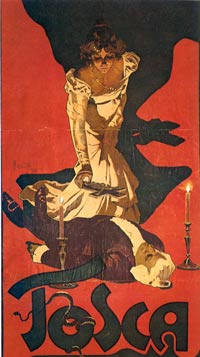
When she has gone, Mario summons Angelotti from the chapel; a cannon signals that the police have discovered the escape, so the two flee to Mario's villa. Meanwhile, the Sacristan returns with choirboys who are to sing in a Te Deum that day. Their excitement is silenced by the entrance of Baron Scarpia, chief of the secret police, in search of Angelotti. When Tosca comes back to her lover, Scarpia shows her a fan with the Attavanti crest, which he has just found. Thinking Mario faithless, Tosca tearfully vows vengeance and leaves as the church fills with worshipers. Scarpia, sending his men to follow her to Angelotti, schemes to get the diva in his power ("Va, Tosca!").
In the Farnese Palace, Scarpia anticipates the sadistic pleasure of bending Tosca
to his will. The spy Spoletta arrives, not having found Angelotti; to placate the baron he brings in Mario, who is interrogated while Tosca is heard singing a cantata at a royal gala downstairs. She enters just as her lover is being taken to an adjoining room: his arrogant silence is to be broken under torture. Unnerved by Scarpia's questioning and the sound of Mario's screams, she reveals Angelotti's hiding place. Mario is carried in; realizing what has happened, he turns on Tosca, but the officer Sciarrone rushes in to announce that Napoleon has won the Battle of Marengo, a defeat for Scarpia's side.
Mario shouts his defiance of tyranny and is dragged to prison. Scarpia, resuming his supper, suggests that Tosca yield herself to him in exchange for her lover's life. Fighting off his embraces, she protests her fate to God, having dedicated her life to art and love. Scarpia again insists, but Spoletta interrupts: faced with capture, Angelotti has killed himself. Tosca, forced to give in or lose her lover, agrees to Scarpia's proposition. The baron pretends to order a mock execution for the prisoner, after which he is to be freed; Spoletta leaves. No sooner has Scarpia written a safe-conduct for the lovers than Tosca snatches a knife from the table and kills him. Wrenching the document from his stiffening fingers and placing candles at his head and a crucifix on his chest, she slips from the room.
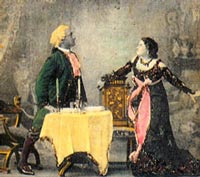 The voice of a shepherd boy is heard as church bells toll the dawn. Mario awaits execution at the Castel Sant'Angelo; he bribes the jailer to convey a farewell note to Tosca. Writing it, overcome with memories of love, he gives way to despair.
The voice of a shepherd boy is heard as church bells toll the dawn. Mario awaits execution at the Castel Sant'Angelo; he bribes the jailer to convey a farewell note to Tosca. Writing it, overcome with memories of love, he gives way to despair.
Suddenly Tosca runs in, filled with the story of her recent adventures. Mario caresses the hands that committed murder for his sake, and the two hail their future. As the firing squad appears, the diva coaches Mario on how to fake his death convincingly; the soldiers fire and depart. Tosca urges Mario to hurry, but when he fails to move, she discovers that Scarpia's treachery has transcended the grave: the bullets were real. When Spoletta rushes in to arrest Tosca for Scarpia's murder, she cries to Scarpia to meet her before God, then leaps to her death.
|
top |
|
Giacomo Puccini
MADAMA BUTTERFLY
|
|
|
| SYNOPSIS |
|
|
Japan, early twentieth century.
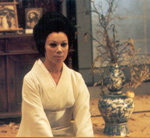 On a flowering terrace above Nagasaki harbor, U.S. Navy Lieutenant B. F. Pinkerton
inspects the house he has leased from a marriage broker, Goro, who has just procured
him three servants and a geisha wife, Cio-Cio-San, known as Madama Butterfly.
To the American consul, Sharpless, who arrives breathless from climbing the hill,
Pinkerton describes the carefree philosophy of a sailor roaming the world in search of
pleasure. At the moment, he is enchanted with the fragile Cio-Cio-San, but his 999-year
marriage contract contains a monthly renewal option. When Sharpless warns that the girl
may not take her vows so lightly, Pinkerton brushes aside such scruples, saying he will one day marry a "real" American wife.
On a flowering terrace above Nagasaki harbor, U.S. Navy Lieutenant B. F. Pinkerton
inspects the house he has leased from a marriage broker, Goro, who has just procured
him three servants and a geisha wife, Cio-Cio-San, known as Madama Butterfly.
To the American consul, Sharpless, who arrives breathless from climbing the hill,
Pinkerton describes the carefree philosophy of a sailor roaming the world in search of
pleasure. At the moment, he is enchanted with the fragile Cio-Cio-San, but his 999-year
marriage contract contains a monthly renewal option. When Sharpless warns that the girl
may not take her vows so lightly, Pinkerton brushes aside such scruples, saying he will one day marry a "real" American wife.

Cio-Cio-San is heard in the distance joyously singing of her wedding.
Entering surrounded by friends, she tells Pinkerton how, when her family fell on
hard times, she had to earn her living as a geisha. Her relatives bustle in,
noisily expressing their opinions on the marriage. In a quiet moment, Cio-Cio-San
shows her bridegroom her few earthly treasures and tells him of her intention to
embrace his Christian faith. The Imperial Commissioner performs the wedding ceremony,
and the guests toast the couple. The celebration is interrupted by Cio-Cio-San's uncle,
a Buddhist priest, who bursts in, cursing the girl for having renounced her ancestors'
religion. Pinkerton angrily sends the guests away. Alone with Cio-Cio-San in the moonlit
garden, he dries her tears, and she joins him in singing of their love.
Three years later.
Cio-Cio-San waits for her husband's return. As Suzuki prays to her gods for aid, her mistress stands by the doorway with her eyes fixed on the harbor. When the maid shows her how little money is left, Cio-Cio-San urges her to have faith: one fine day Pinkerton's ship will appear on the horizon. Sharpless brings a letter from the lieutenant, but before he can read it to Cio-Cio-San, Goro comes with a suitor, the wealthy Prince Yamadori. The girl dismisses both marriage broker and prince, insisting her American husband has not deserted her. When they are alone, Sharpless again starts to read the letter and suggests Pinkerton may not return. Cio-Cio-San proudly carries forth her child, Dolore (Trouble), saying that as soon as Pinkerton knows he has a son he surely will come back; if he does not, she would rather die than return to her former life. Moved by her devotion, Sharpless leaves, without having revealed the full contents of the letter. Cio-Cio-San, on the point of despair, hears a cannon report; seizing a spyglass, she discovers Pinkerton's ship entering the harbor. Now delirious with joy, she orders Suzuki to help her fill the house with flowers. As night falls, Cio-Cio-San, Suzuki and the child begin their vigil.
 As dawn breaks, Suzuki insists that Cio-Cio-San rest. Humming a lullaby to her child, she carries him to another room. Before long, Sharpless enters with Pinkerton, followed by Kate, his new wife. When Suzuki realizes who the American woman is, she collapses in despair but agrees to aid in breaking the news to her mistress. Pinkerton, seized with remorse, bids an anguished farewell to the scene of his former happiness, then rushes away. When Cio-Cio-San comes forth expecting to find him, she finds Kate instead. Guessing the truth, the shattered Cio-Cio-San agrees to give up her child if his father will return for him.
Then, sending even Suzuki away, she takes out the dagger with which her father committed suicide and bows before a statue of Buddha, choosing to die with honor rather than live in disgrace. As she raises the blade, Suzuki pushes the child into the room. Sobbing farewell, Cio-Cio-San sends him into the garden to play, then stabs herself. As she dies, Pinkerton is heard calling her name.
As dawn breaks, Suzuki insists that Cio-Cio-San rest. Humming a lullaby to her child, she carries him to another room. Before long, Sharpless enters with Pinkerton, followed by Kate, his new wife. When Suzuki realizes who the American woman is, she collapses in despair but agrees to aid in breaking the news to her mistress. Pinkerton, seized with remorse, bids an anguished farewell to the scene of his former happiness, then rushes away. When Cio-Cio-San comes forth expecting to find him, she finds Kate instead. Guessing the truth, the shattered Cio-Cio-San agrees to give up her child if his father will return for him.
Then, sending even Suzuki away, she takes out the dagger with which her father committed suicide and bows before a statue of Buddha, choosing to die with honor rather than live in disgrace. As she raises the blade, Suzuki pushes the child into the room. Sobbing farewell, Cio-Cio-San sends him into the garden to play, then stabs herself. As she dies, Pinkerton is heard calling her name.
|
top |
|
Giacomo Puccini
LA BOHEME
|
|
|
| SYNOPSIS |
|
|
Paris, Christmas Eve, c. 1830.
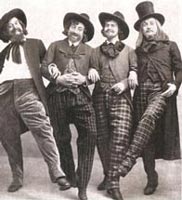
In their Latin Quarter garret, the painter Marcello and poet Rodolfo try to keep warm by burning pages from Rodolfo's latest drama. They are joined by their comrades - Colline, a young philosopher, and Schaunard, a musician who has landed a job and brings food, fuel and funds. But while they celebrate their unexpected fortune, the landlord, Benoit, arrives to collect the rent. Plying the older man with wine, they urge him to tell of his flirtations, then throw him out in mock indignation. As the friends depart for a celebration at the nearby Café Momus, Rodolfo promises to join them soon, staying behind to finish writing an article.
There is another knock: a neighbor, Mimì, says her candle has gone out on the drafty stairs. Offering her wine when she feels faint, Rodolfo relights her candle and helps her to the door. Mimì realizes she has dropped her key, and as the two search for it, both candles are blown out. In the moonlight the poet takes the girl's shivering hand, telling her his dreams. She then recounts her solitary life, embroidering flowers and waiting for spring. Drawn to each other, Mimì and Rodolfo leave for the café.
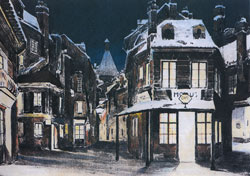 Amid shouts of street hawkers, Rodolfo buys Mimì a bonnet near the Café Momus before introducing her to his friends. They all sit down and order supper. A toy vendor, Parpignol, passes by, besieged by children. Marcello's former lover, Musetta, enters ostentatiously on the arm of the elderly, wealthy Alcindoro. Trying to regain the painter's attention, she sings a waltz about her popularity. Complaining that her shoe pinches, Musetta sends Alcindoro to fetch a new pair, then falls into Marcello's arms. Joining a group of marching soldiers, the Bohemians leave Alcindoro to face the bill when he returns.
Amid shouts of street hawkers, Rodolfo buys Mimì a bonnet near the Café Momus before introducing her to his friends. They all sit down and order supper. A toy vendor, Parpignol, passes by, besieged by children. Marcello's former lover, Musetta, enters ostentatiously on the arm of the elderly, wealthy Alcindoro. Trying to regain the painter's attention, she sings a waltz about her popularity. Complaining that her shoe pinches, Musetta sends Alcindoro to fetch a new pair, then falls into Marcello's arms. Joining a group of marching soldiers, the Bohemians leave Alcindoro to face the bill when he returns.
At dawn on the snowy outskirts of Paris.
A Customs Officer admits farm women to the city. Musetta and revelers are heard inside a tavern. Soon Mimì walks by, searching for the place where the reunited Marcello and Musetta now live. When the painter emerges, she pours out her distress over Rodolfo's incessant jealousy. It is best they part, she says. Rodolfo, who has been asleep in the tavern, is heard, and Mimì hides; Marcello thinks she has left. The poet tells Marcello he wants to separate from his fickle sweetheart. Pressed further, he breaks down, saying Mimì is dying; her ill health can only worsen in the poverty they share. Overcome, Mimì stumbles forward to bid her lover farewell as Marcello runs back into the tavern to investigate Musetta's raucous laughter. While Mimì and Rodolfo recall their happiness, Musetta quarrels with Marcello. The painter and his mistress part in fury, but Mimì and Rodolfo decide to stay together until spring.
Some months later.
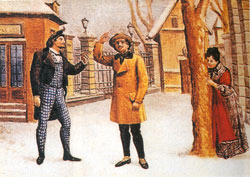 Rodolfo and Marcello lament their loneliness in the garret. Colline and Schaunard bring a meager meal. The four stage a dance, which turns into a mock fight. The merrymaking is ended when Musetta bursts in, saying Mimì is downstairs, too weak to climb up. As Rodolfo runs to her, Musetta tells how Mimì has begged to be taken to her lover to die. While Mimì is made comfortable, Marcello goes with Musetta to sell her earrings for medicine, and Colline leaves to pawn his cherished overcoat. Alone, Mimì and Rodolfo recall their first days together, but she is seized with coughing. When the others return, Musetta gives Mimì a muff to warm her hands and prays for her life. Mimì dies quietly, and when Schaunard discovers she is dead, Rodolfo runs to her side, calling her name.
Rodolfo and Marcello lament their loneliness in the garret. Colline and Schaunard bring a meager meal. The four stage a dance, which turns into a mock fight. The merrymaking is ended when Musetta bursts in, saying Mimì is downstairs, too weak to climb up. As Rodolfo runs to her, Musetta tells how Mimì has begged to be taken to her lover to die. While Mimì is made comfortable, Marcello goes with Musetta to sell her earrings for medicine, and Colline leaves to pawn his cherished overcoat. Alone, Mimì and Rodolfo recall their first days together, but she is seized with coughing. When the others return, Musetta gives Mimì a muff to warm her hands and prays for her life. Mimì dies quietly, and when Schaunard discovers she is dead, Rodolfo runs to her side, calling her name.
|
top |
|
Giacchino Rossini
LA CENERENTOLA
|
|
|
| SYNOPSIS |
|
|
Late eighteenth or early nineteenth century.
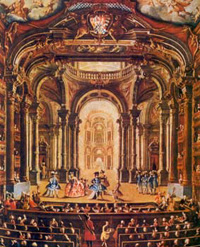 In the run-down mansion of Don Magnifico, Baron of Montefiascone, his two daughters, Clorinda and Tisbe, try on finery while Cenerentola (Cinderella), his stepdaughter, whose given name is Angelina and who serves as the family maid, sings a forlorn ditty about a king who found a wife among the common folk.
When a beggar appears, the stepsisters want to send him away, but Cenerentola offers him bread and coffee. While he stands by the door, several courtiers arrive to announce that Prince Ramiro will soon pay a visit: he is looking for the most beautiful girl in the land to be his bride. The sisters order Cenerentola to fetch them more jewels. Magnifico, awakened by the commotion, comes to investigate, scolding the girls for interrupting his dream of a donkey that sprouted wings. When he learns of the prince's visit, he exhorts the girls to save the family fortunes by capturing the young man's fancy.
In the run-down mansion of Don Magnifico, Baron of Montefiascone, his two daughters, Clorinda and Tisbe, try on finery while Cenerentola (Cinderella), his stepdaughter, whose given name is Angelina and who serves as the family maid, sings a forlorn ditty about a king who found a wife among the common folk.
When a beggar appears, the stepsisters want to send him away, but Cenerentola offers him bread and coffee. While he stands by the door, several courtiers arrive to announce that Prince Ramiro will soon pay a visit: he is looking for the most beautiful girl in the land to be his bride. The sisters order Cenerentola to fetch them more jewels. Magnifico, awakened by the commotion, comes to investigate, scolding the girls for interrupting his dream of a donkey that sprouted wings. When he learns of the prince's visit, he exhorts the girls to save the family fortunes by capturing the young man's fancy.
All retire to their rooms, and Prince Ramiro - disguised as his own valet - arrives alone, so as to see the women of the household without their knowing who he is. Cenerentola is startled by the handsome stranger, and each admires the other. Asked who she is, Cenerentola gives a flustered explanation about her mother's death and her own servile position, then excuses herself to respond to her stepsisters' call. When Magnifico enters, Ramiro says the prince will be along shortly.
Magnifico fetches Clorinda and Tisbe, and they greet Dandini - the prince's valet, disguised as the prince himself - playing his role to the hilt as he searches for the fairest in the realm. The sisters fawn over Dandini, who invites them to a ball.
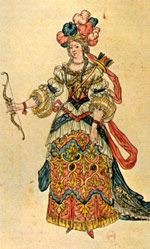
Don Magnifico also prepares to leave, arguing with Cenerentola, who does not want to be left behind. Ramiro notes how badly Cenerentola is treated. His tutor, Alidoro, still dressed as the beggar who came earlier, reads from a census list and asks for the third daughter of the household. Magnifico denies she is still alive.
Once Dandini has left with Magnifico, Alidoro tells Cenerentola she is to accompany him to the ball. Casting off his rags, he identifies himself as a member of the court and assures the girl that heaven will reward her purity of heart.
Dandini, still posing as the prince, escorts the two sisters into the royal country house and offers Magnifico a tour of the wine cellar, hoping to get him drunk. Dandini disentangles himself from the sisters and says he will see them later.
In a drawing room of the palace.
Magnifico is hailed as the prince's new wine counselor. No one, he decrees, shall mix a drop of water with any wine for the next fifteen years. Looking forward to the feast, he and his attendants leave. Dandini reports to the prince with his negative opinion of the two sisters. This confuses Ramiro, who has heard Alidoro speak well of one of Magnifico's daughters.
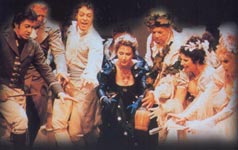 Clorinda and Tisbe rejoin Dandini; when he offers Ramiro as an escort for one of them, they turn their noses up at a mere groom. Alidoro announces the arrival of an unknown, veiled lady. Ramiro recognizes something in her voice. When she lifts her veil, he and Dandini, as well as the sisters, sense something familiar about her appearance. Their confusion is shared by Magnifico, who comes to announce supper and notices the newcomer's resemblance to Cenerentola. All feel they are in a dream but on the verge of being awakened by some rude shock.
Clorinda and Tisbe rejoin Dandini; when he offers Ramiro as an escort for one of them, they turn their noses up at a mere groom. Alidoro announces the arrival of an unknown, veiled lady. Ramiro recognizes something in her voice. When she lifts her veil, he and Dandini, as well as the sisters, sense something familiar about her appearance. Their confusion is shared by Magnifico, who comes to announce supper and notices the newcomer's resemblance to Cenerentola. All feel they are in a dream but on the verge of being awakened by some rude shock.
In a room of the palace.
Magnifico stews over this new threat to his daughters' eligibility, telling them not to forget his importance when either of them ascends the throne. He leaves with the girls, whereupon Ramiro wanders in, smitten with the newly arrived guest because of her resemblance to the girl he met that morning. He conceals himself as Dandini arrives with the magnificently attired Cenerentola, courting her. She politely declines, saying she is in love with someone else - his groom. At this the delighted Ramiro steps forth. To test his sincerity, she gives him one of a pair of matching bracelets, saying that if he really cares for her, he will find her. After she leaves, Ramiro, with Alidoro's encouragement, calls his men together, so that the search can begin
Once again the prince's valet, Dandini, faces Magnifico, who still believes he is the prince and insists he decide which daughter to marry. Dandini confesses he is a valet. When Magnifico turns indignant, Dandini orders him out of the palace.
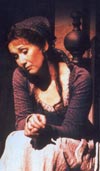 At Magnifico's house, Cenerentola once more in rags, tends the fire and sings her ballad. Magnifico and the sisters return, all in a vile mood, and order Cenerentola to prepare supper. She obeys, as a thunderstorm rages.
At Magnifico's house, Cenerentola once more in rags, tends the fire and sings her ballad. Magnifico and the sisters return, all in a vile mood, and order Cenerentola to prepare supper. She obeys, as a thunderstorm rages.
Dandini appears at the door, saying the prince's carriage has overturned outside. Cenerentola, bringing a chair for the prince, realizes he is Ramiro; he in turn recognizes her bracelet. Confusion reigns as Magnifico and his daughters smart from their defeat; angered by such meanness, Ramiro threatens them, but Cenerentola asks him to show mercy. Her family still against her, Cenerentola leaves with the prince, while Alidoro gives thanks to heaven for this happy outcome.
In the throne room of Ramiro's palace, Magnifico curries favor with the newly created princess, but she asks only to be acknowledged at last as his daughter. Secure in her happiness, she asks the prince to forgive Magnifico and the two stepsisters; born to misfortune, she has seen her fortunes change. Chastened, her father and stepsisters embrace her as she declares that her days of sitting by the fire are over.
|
top |
|
Wolfgang Amadeus Mozart
THE MAGIC FLUTE
|
|
|
| SYNOPSIS |
|
|
An imaginary Egypt.
Three Ladies attendant on the Queen of the Night save the fainting Prince Tamino from a serpent. When they leave to tell the Queen, the birdcatcher Papageno bounces in and boasts to Tamino that it was he who slew the serpent. The Ladies return to give Tamino a portrait of the Queen's daughter, Pamina, who they say is enslaved by the evil Sarastro, and they padlock Papageno's mouth for lying. The Queen, appearing in a burst of thunder, laments the loss of her daughter; she charges Tamino with Pamina's rescue. The Ladies hand a magic flute to Tamino and magic silver bells to Papageno to ensure their safety, appointing Three Genii to guide them.
Sarastro's Moorish slave Monostatos pursues Pamina but is frightened away by the feather-covered Papageno, who tells Pamina that Tamino loves her and intends to save her.

Led to the Temple of Sarastro, Tamino is advised by a High Priest that it is the Queen, not Sarastro, who is evil. Hearing that Pamina is safe, Tamino charms the animals with his flute, then rushes to follow the sound of Papageno's pipes. Monostatos and his retainers chase Papageno and Pamina but are rendered helpless by Papageno's magic bells. Sarastro, entering in ceremony, promises Pamina eventual freedom and punishes Monostatos. Pamina is enchanted by a glimpse of Tamino, who is led into the temple with Papageno.
Sarastro tells his priests that Tamino will undergo initiation rites. Sworn to silence, Tamino is impervious to the temptations of the Queen's Ladies, who have no trouble derailing the cheerful Papageno from his course of virtue.
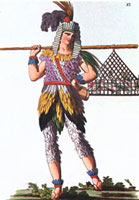
The Queen of the Night dismisses Monostatos, whom she finds kissing the sleeping Pamina, and gives her daughter a dagger with which to murder Sarastro. The weeping Pamina is confronted and consoled by Sarastro.
The gourmand Papageno is just as quick to break a new oath of fasting, and he jokes with a flirtatious old lady, who vanishes when asked her name. Tamino remains steadfast, breaking Pamina's heart: she cannot understand his silence.
The priests inform Tamino that he has only two more trials to complete his initiation. Papageno is eliminated but settles for the old lady, who turns into a young Papagena when the resigned Papageno promises to be faithful. She disappears, however.
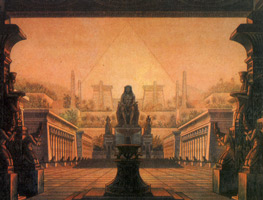 After the Genii save the despairing Pamina from suicide, she finds Tamino and walks with him through the ordeals by water and fire, protected by the magic flute.
Papageno also is saved from attempted suicide by the Genii, who remind him to use his magic bells, which summon Papagena. The two plan for the future and move into a bird's nest.
After the Genii save the despairing Pamina from suicide, she finds Tamino and walks with him through the ordeals by water and fire, protected by the magic flute.
Papageno also is saved from attempted suicide by the Genii, who remind him to use his magic bells, which summon Papagena. The two plan for the future and move into a bird's nest.
The Queen of the Night, her Three Ladies and Monostatos attack the temple but are defeated and banished. Sarastro joins Pamina and Tamino as the throng hails Isis and Osiris, the triumph of courage, virtue and wisdom.
|
top |
|
 |
|
 |



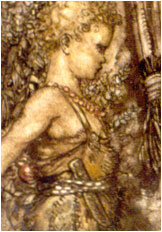
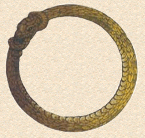

 The factory bell rings and the men of Seville gather round the female workers as they return after their lunch break. The gypsy Carmen is awaited with anticipation. When the men gather round her, she tells them love obeys no known laws (Habañera). Only one man pays no attention to her - Don José. Carmen throws a flower at him. The women go back into the factory and the crowd disperses.
The factory bell rings and the men of Seville gather round the female workers as they return after their lunch break. The gypsy Carmen is awaited with anticipation. When the men gather round her, she tells them love obeys no known laws (Habañera). Only one man pays no attention to her - Don José. Carmen throws a flower at him. The women go back into the factory and the crowd disperses.

 Carmen and her friends Frasquita and Mercédès entertain Zuniga and other officers. Zuniga tells Carmen that José has been released this very day. A torchlight procession in honor of the bullfighter Escamillo is heard, and the officers invite him in. He describes the excitements of his profession, in particular the amorous rewards that follow a successful bullfight. Escamillo then propositions Carmen, but she replies that she is engaged for the moment. He says he will wait. Carmen refuses to leave with Zuniga, who threatens to return later.
Carmen and her friends Frasquita and Mercédès entertain Zuniga and other officers. Zuniga tells Carmen that José has been released this very day. A torchlight procession in honor of the bullfighter Escamillo is heard, and the officers invite him in. He describes the excitements of his profession, in particular the amorous rewards that follow a successful bullfight. Escamillo then propositions Carmen, but she replies that she is engaged for the moment. He says he will wait. Carmen refuses to leave with Zuniga, who threatens to return later.
 When the company has departed, the smugglers Dancaïre and Remendado enter. They have business in hand for which their regular female accomplices are essential. Frasquita and Mercédès are game, but Carmen refuses to leave Seville: she is in love. Her friends are incredulous. José's song is heard in the distance. The smugglers withdraw. Carmen tells José that she has been dancing for his officers. When he reacts jealously, she agrees to entertain him alone. Bugles are heard sounding the retreat. José says that he must return to barracks. Stupefied, Carmen mocks him, but he answers by producing the flower she threw and telling her how its faded scent sustained his love during the long weeks in prison (Flower Song). But she replies that he doesn't love her; if he did he would desert and join her in a life of freedom in the mountains. When, torn with doubts, he finally refuses, she dismisses him contemptuously. As he leaves, Zuniga bursts in. In jealous rage José attacks him. The smugglers return, separate them, and put Zuniga under temporary constraint José now has no choice but to desert and join the smugglers.
When the company has departed, the smugglers Dancaïre and Remendado enter. They have business in hand for which their regular female accomplices are essential. Frasquita and Mercédès are game, but Carmen refuses to leave Seville: she is in love. Her friends are incredulous. José's song is heard in the distance. The smugglers withdraw. Carmen tells José that she has been dancing for his officers. When he reacts jealously, she agrees to entertain him alone. Bugles are heard sounding the retreat. José says that he must return to barracks. Stupefied, Carmen mocks him, but he answers by producing the flower she threw and telling her how its faded scent sustained his love during the long weeks in prison (Flower Song). But she replies that he doesn't love her; if he did he would desert and join her in a life of freedom in the mountains. When, torn with doubts, he finally refuses, she dismisses him contemptuously. As he leaves, Zuniga bursts in. In jealous rage José attacks him. The smugglers return, separate them, and put Zuniga under temporary constraint José now has no choice but to desert and join the smugglers.
 The gang enters with contraband and pauses for a brief rest while Dancaïre and Remendado go on a reconnaissance mission. Carmen and José quarrel, and José gazes regretfully down to the valley where his mother is living. Carmen advises him to join her. The women turn the cards to tell their fortunes: Frasquita and Mercédès foresee rich and gallant lovers, but Carmen's cards spell death, for her and for José. She accepts the prophecy. Remendado and Dancaïre return announcing that customs officers are guarding the pass: Carmen, Frasquita, and Mercédès know how to deal with them. All depart. Micaëla appears, led by a mountaineer. She says that she fears nothing so much as meeting the woman who has turned the man she once loved into a criminal. But she hurries away in fear when a shot rings out. It is José firing at an intruder, who turns out to be Escamillo, transporting bulls to Seville. When he refers to the soldier whom Carmen once loved, José reveals himself and they fight. Carmen and the smugglers return and separate them. Escamillo invites everyone, especially Carmen, to be his guests at the next bullfight in Seville. José is at the end of his tether. Micaëla is discovered, and she begs José to go with her to his mother but he furiously refuses. Micaëla then reveals that his mother is dying. José promises Carmen that they will meet again. As José and Micaëla leave, Escamillo is heard singing in the distance.
The gang enters with contraband and pauses for a brief rest while Dancaïre and Remendado go on a reconnaissance mission. Carmen and José quarrel, and José gazes regretfully down to the valley where his mother is living. Carmen advises him to join her. The women turn the cards to tell their fortunes: Frasquita and Mercédès foresee rich and gallant lovers, but Carmen's cards spell death, for her and for José. She accepts the prophecy. Remendado and Dancaïre return announcing that customs officers are guarding the pass: Carmen, Frasquita, and Mercédès know how to deal with them. All depart. Micaëla appears, led by a mountaineer. She says that she fears nothing so much as meeting the woman who has turned the man she once loved into a criminal. But she hurries away in fear when a shot rings out. It is José firing at an intruder, who turns out to be Escamillo, transporting bulls to Seville. When he refers to the soldier whom Carmen once loved, José reveals himself and they fight. Carmen and the smugglers return and separate them. Escamillo invites everyone, especially Carmen, to be his guests at the next bullfight in Seville. José is at the end of his tether. Micaëla is discovered, and she begs José to go with her to his mother but he furiously refuses. Micaëla then reveals that his mother is dying. José promises Carmen that they will meet again. As José and Micaëla leave, Escamillo is heard singing in the distance.
 Among the excited crowd cheering the bullfighters are Frasquita and Mercédès. Carmen enters on Escamillo's arm. Frasquita and Mercédès warn Carmen that José has been seen in the crowd. She says that she is not afraid. José enters. He implores her to forget the past and start a new life with him. She tells him calmly that everything between them is over. She will never give in: she was born free and free she will die. While the crowd is heard cheering Escamillo, José tries to prevent Carmen from joining her new lover. Carmen finally loses her temper, takes from her finger the ring that José once gave her, and throws it at his feet. José stabs her, and then confesses to the murder of the woman he loved.
Among the excited crowd cheering the bullfighters are Frasquita and Mercédès. Carmen enters on Escamillo's arm. Frasquita and Mercédès warn Carmen that José has been seen in the crowd. She says that she is not afraid. José enters. He implores her to forget the past and start a new life with him. She tells him calmly that everything between them is over. She will never give in: she was born free and free she will die. While the crowd is heard cheering Escamillo, José tries to prevent Carmen from joining her new lover. Carmen finally loses her temper, takes from her finger the ring that José once gave her, and throws it at his feet. José stabs her, and then confesses to the murder of the woman he loved.
 Carlo, in his misery, visits the cloister of the monastery of St. Just, where his grandfather, Carlo V, became a friar and retreated from the cares of the throne. When Carlo confesses to his friend Rodrigo, Marquis of Posa, his love for his father's wife, Rodrigo urges him to devote himself instead to the cause of Flemish independence from Spanish oppression. The two men pledge friendship and devotion to liberty.
Carlo, in his misery, visits the cloister of the monastery of St. Just, where his grandfather, Carlo V, became a friar and retreated from the cares of the throne. When Carlo confesses to his friend Rodrigo, Marquis of Posa, his love for his father's wife, Rodrigo urges him to devote himself instead to the cause of Flemish independence from Spanish oppression. The two men pledge friendship and devotion to liberty.
 Carlo goes to the queen's gardens at midnight to see Elisabetta but instead is met by the masked Eboli, who is in love with him. When he realizes who she is and shows his disappointment, Eboli threatens to bring about his downfall. To protect him, Rodrigo takes incriminating papers from the Infante.
Carlo goes to the queen's gardens at midnight to see Elisabetta but instead is met by the masked Eboli, who is in love with him. When he realizes who she is and shows his disappointment, Eboli threatens to bring about his downfall. To protect him, Rodrigo takes incriminating papers from the Infante.
 Alone in his study, Filippo laments his wife's indifference. He then calls in the aged Grand Inquisitor, who urges the death penalty for both Carlo and Rodrigo. After the implacable old priest has left, Elisabetta bursts in, crying that her jewel casket has been stolen. The king produces it, and when he forces it open, Carlo's portrait falls out. He accuses his wife of adultery. The queen faints, and Filippo summons Eboli and Rodrigo for help. When the men withdraw, Eboli confesses responsibility for Elisabetta's betrayal - it was she who stole the jewel casket - and when she goes on to confess that she once was the king's mistress, the queen banishes her to a convent. Eboli, cursing her own fatal beauty, vows to save Carlo.
Alone in his study, Filippo laments his wife's indifference. He then calls in the aged Grand Inquisitor, who urges the death penalty for both Carlo and Rodrigo. After the implacable old priest has left, Elisabetta bursts in, crying that her jewel casket has been stolen. The king produces it, and when he forces it open, Carlo's portrait falls out. He accuses his wife of adultery. The queen faints, and Filippo summons Eboli and Rodrigo for help. When the men withdraw, Eboli confesses responsibility for Elisabetta's betrayal - it was she who stole the jewel casket - and when she goes on to confess that she once was the king's mistress, the queen banishes her to a convent. Eboli, cursing her own fatal beauty, vows to save Carlo.
 "The stars were well aligned when this production was staged at the Théàtre du Châtelet in Paris during March of 1996, when it was recorded live for this DVD. To have this many major stars together, all of them fine singing actors, in one place at one time was already remarkable. But to combine them in a major Verdi opus, staged by famed filmmaker Luc Bondy and conducted by one of the hottest young talents in the pit today, deserved the attention it received.
"The stars were well aligned when this production was staged at the Théàtre du Châtelet in Paris during March of 1996, when it was recorded live for this DVD. To have this many major stars together, all of them fine singing actors, in one place at one time was already remarkable. But to combine them in a major Verdi opus, staged by famed filmmaker Luc Bondy and conducted by one of the hottest young talents in the pit today, deserved the attention it received.
 Figaro is renowned in Bartolo's home not only as a barber, but also as speziale. This will allow him to introduce the Count to Bartolo without too much suspicions.
Figaro is renowned in Bartolo's home not only as a barber, but also as speziale. This will allow him to introduce the Count to Bartolo without too much suspicions.
 Rosina would like to send another note to Lindoro and asks for Figaro's help. The conversation is abruptly truncated by the coming of Bartolo with Rosina's music teacher, Don Basilio. Bartolo and Basilio start a conversation: the old man wants to hurry with the wedding and to send Almaviva out of Seville. Basilio gives his advice: to get rid of the Count by a calumny. Shortly after they go away to write the wedding contract, so Figaro and Rosina can meet again.
Rosina would like to send another note to Lindoro and asks for Figaro's help. The conversation is abruptly truncated by the coming of Bartolo with Rosina's music teacher, Don Basilio. Bartolo and Basilio start a conversation: the old man wants to hurry with the wedding and to send Almaviva out of Seville. Basilio gives his advice: to get rid of the Count by a calumny. Shortly after they go away to write the wedding contract, so Figaro and Rosina can meet again.
 In Bartolo's study room.
In Bartolo's study room. Don Bartolo asks Basilio to bring immediately a Notary. He shows to Rosina the note given him by Lindoro, and convinces her that Lindoro doesn't love her, as he is only a servant of the Count. She is convinced and accepts to marry Bartolo.
Don Bartolo asks Basilio to bring immediately a Notary. He shows to Rosina the note given him by Lindoro, and convinces her that Lindoro doesn't love her, as he is only a servant of the Count. She is convinced and accepts to marry Bartolo.
 As dawn breaks in the Biscay mountains, Gypsies sing at work with hammer and anvil. Azucena - the Gypsy's daughter described by Ferrando - relives her mother's fiery execution, recalling the dying woman's plea for vengeance. Manrico asks to hear her full story, becoming confused when Azucena, overwhelmed with memories, blurts out that by mistake she hurled her own son into the flames. Assuring him of a mother's love, Azucena makes Manrico swear revenge, but he says a strange power stayed his hand when he could have killed Di Luna in the duel. A messenger brings news that Leonora, thinking Manrico dead, plans to enter a convent. Despite Azucena's pleas, Manrico rushes away.
As dawn breaks in the Biscay mountains, Gypsies sing at work with hammer and anvil. Azucena - the Gypsy's daughter described by Ferrando - relives her mother's fiery execution, recalling the dying woman's plea for vengeance. Manrico asks to hear her full story, becoming confused when Azucena, overwhelmed with memories, blurts out that by mistake she hurled her own son into the flames. Assuring him of a mother's love, Azucena makes Manrico swear revenge, but he says a strange power stayed his hand when he could have killed Di Luna in the duel. A messenger brings news that Leonora, thinking Manrico dead, plans to enter a convent. Despite Azucena's pleas, Manrico rushes away.
 Di Luna has pitched camp near the bastion of Castellor, where Manrico has taken Leonora. After soldiers sing of their eagerness for victory, Ferrando leads in Azucena, who was found nearby. The Gypsy describes her poor, lonely life and says she is only searching for her son. Di Luna reveals his identity, at which Azucena recoils and is recognized by Ferrando as the supposed murderer of Di Luna's baby brother. The count orders her burned at the stake.
Di Luna has pitched camp near the bastion of Castellor, where Manrico has taken Leonora. After soldiers sing of their eagerness for victory, Ferrando leads in Azucena, who was found nearby. The Gypsy describes her poor, lonely life and says she is only searching for her son. Di Luna reveals his identity, at which Azucena recoils and is recognized by Ferrando as the supposed murderer of Di Luna's baby brother. The count orders her burned at the stake.
 Ruiz brings Leonora to the foot of the captured Manrico's prison tower, where she voices her undying love and prays for his release. Monks are heard intoning a doleful Miserere for the soul of the condemned, while Manrico sings farewell from inside the bastion. Leonora resolves to save him. When Di Luna appears, Leonora agrees to yield to him but secretly swallows poison.
Ruiz brings Leonora to the foot of the captured Manrico's prison tower, where she voices her undying love and prays for his release. Monks are heard intoning a doleful Miserere for the soul of the condemned, while Manrico sings farewell from inside the bastion. Leonora resolves to save him. When Di Luna appears, Leonora agrees to yield to him but secretly swallows poison.
 The Moor Otello, governor of the island and a general in the Venetian army, arrives in port as a tempest rages. Iago, Otello's ensign, confers with Roderigo, a fop who has come to Cyprus because of his unrequited love for Desdemona, a Venetian beauty recently married to Otello. Promising to help Roderigo, Iago says Desdemona should soon tire of her Moorish husband, adding that he himself has reasons for revenge on Otello, who passed him over for advancement, promoting Cassio instead. Iago proposes a toast; when Cassio declines any more drink, Iago says he cannot refuse to salute Otello's new wife. Cassio consents and grows tipsy as Iago provokes Roderigo to a duel with Cassio. When Montano, Otello's predecessor in command, tries to separate the two, Cassio attacks him as well. Otello comes out of the castle to restore order. When he sees Desdemona disturbed by the fray, he takes away Cassio's recent promotion. Sending everyone home, Otello turns to his bride, and they recall their courtship. Leading her back into the castle, Otello kisses her.
The Moor Otello, governor of the island and a general in the Venetian army, arrives in port as a tempest rages. Iago, Otello's ensign, confers with Roderigo, a fop who has come to Cyprus because of his unrequited love for Desdemona, a Venetian beauty recently married to Otello. Promising to help Roderigo, Iago says Desdemona should soon tire of her Moorish husband, adding that he himself has reasons for revenge on Otello, who passed him over for advancement, promoting Cassio instead. Iago proposes a toast; when Cassio declines any more drink, Iago says he cannot refuse to salute Otello's new wife. Cassio consents and grows tipsy as Iago provokes Roderigo to a duel with Cassio. When Montano, Otello's predecessor in command, tries to separate the two, Cassio attacks him as well. Otello comes out of the castle to restore order. When he sees Desdemona disturbed by the fray, he takes away Cassio's recent promotion. Sending everyone home, Otello turns to his bride, and they recall their courtship. Leading her back into the castle, Otello kisses her.
 Iago tells Cassio that by presenting his case to Desdemona he can be reinstated, because Otello is influenced by his wife. As soon as Cassio is out of sight, Iago declares his belief that a cruel God created man wicked, and life has no meaning. Iago watches as Cassio approaches Desdemona in the garden, and when Otello comes in, the lieutenant makes casual remarks about Desdemona's fidelity. Softened by his wife's beauty, Otello greets her, but she brings up the question of Cassio's demotion, annoying him. When she offers a handkerchief to wipe his brow, he throws it to the ground, where her attendant, Emilia, retrieves it. As Desdemona tries to calm Otello, Iago orders Emilia (his wife) to give him the handkerchief. Otello asks to be alone, and the others leave, except for Iago, who hangs back to observe Otello's growing suspicion. To fan the flames, Iago invents a story about how Cassio spoke lovingly of Desdemona in his sleep. Then he mentions her handkerchief, saying he saw it in Cassio's hand. Beside himself, Otello swears to have vengeance, and Iago joins in the oath.
Iago tells Cassio that by presenting his case to Desdemona he can be reinstated, because Otello is influenced by his wife. As soon as Cassio is out of sight, Iago declares his belief that a cruel God created man wicked, and life has no meaning. Iago watches as Cassio approaches Desdemona in the garden, and when Otello comes in, the lieutenant makes casual remarks about Desdemona's fidelity. Softened by his wife's beauty, Otello greets her, but she brings up the question of Cassio's demotion, annoying him. When she offers a handkerchief to wipe his brow, he throws it to the ground, where her attendant, Emilia, retrieves it. As Desdemona tries to calm Otello, Iago orders Emilia (his wife) to give him the handkerchief. Otello asks to be alone, and the others leave, except for Iago, who hangs back to observe Otello's growing suspicion. To fan the flames, Iago invents a story about how Cassio spoke lovingly of Desdemona in his sleep. Then he mentions her handkerchief, saying he saw it in Cassio's hand. Beside himself, Otello swears to have vengeance, and Iago joins in the oath.
 Iago tells Otello that more proof is forthcoming of his betrayal by his wife and Cassio. Desdemona enters, and Otello speaks calmly until she revives the subject of Cassio. When Otello demands the handkerchief he gave her, she again pleads for Cassio. Otello calls the shocked woman a courtesan and dismisses her. He cries out that heaven could have afflicted him with anything but this, then hides as Iago returns with Cassio. Iago flashes the handkerchief he stole and leads Cassio on in banter in such a way that Otello overhears only fragments and thinks they are talking about Desdemona. As trumpets announce dignitaries from Venice, Otello vows to kill his wife that very night. The Moor greets Lodovico, who recalls him to Venice and appoints Cassio to govern Cyprus. Losing control at this news, Otello pushes his wife to the floor with insults. He orders everyone out and collapses in a seizure as Iago gloats over him, crying, "Behold the Lion!"
Iago tells Otello that more proof is forthcoming of his betrayal by his wife and Cassio. Desdemona enters, and Otello speaks calmly until she revives the subject of Cassio. When Otello demands the handkerchief he gave her, she again pleads for Cassio. Otello calls the shocked woman a courtesan and dismisses her. He cries out that heaven could have afflicted him with anything but this, then hides as Iago returns with Cassio. Iago flashes the handkerchief he stole and leads Cassio on in banter in such a way that Otello overhears only fragments and thinks they are talking about Desdemona. As trumpets announce dignitaries from Venice, Otello vows to kill his wife that very night. The Moor greets Lodovico, who recalls him to Venice and appoints Cassio to govern Cyprus. Losing control at this news, Otello pushes his wife to the floor with insults. He orders everyone out and collapses in a seizure as Iago gloats over him, crying, "Behold the Lion!"
 "Antonio Salieri (1750-1825) was a thoroughly competent professional composer, despite his unfortunate fictitious reputation, perpetuated by Rimsky Korsakov and Peter Shaffer. His Falstaff is frankly populist in its aim, but has quite a few special effects in the orchestration, with solos for cello and clarinet. After a slowish start one gradually becomes involved in the considerable subtlety of the text, which is available in subtitled translations in several languages.
"Antonio Salieri (1750-1825) was a thoroughly competent professional composer, despite his unfortunate fictitious reputation, perpetuated by Rimsky Korsakov and Peter Shaffer. His Falstaff is frankly populist in its aim, but has quite a few special effects in the orchestration, with solos for cello and clarinet. After a slowish start one gradually becomes involved in the considerable subtlety of the text, which is available in subtitled translations in several languages.
 This production at the little rococo theatre in Schwetzingen Palace is ideal for home viewing. The sets are simplified but fully adequate to suggest the different scenes, the costumes are muted in colour and all the emphasis is upon inventive acting based on excellent teamwork and fine singing. John de Carlo as Falstaff gives a marvellous characterisation of this archetypal figure, who is easily inveigled to bounce back and hasten to another certain humiliation, for us to relish in anticipation and delivery. A cruel story about total denial of personal shortcomings and enduring confidence in certain reciprocation of his roving sexual fancies.
This production at the little rococo theatre in Schwetzingen Palace is ideal for home viewing. The sets are simplified but fully adequate to suggest the different scenes, the costumes are muted in colour and all the emphasis is upon inventive acting based on excellent teamwork and fine singing. John de Carlo as Falstaff gives a marvellous characterisation of this archetypal figure, who is easily inveigled to bounce back and hasten to another certain humiliation, for us to relish in anticipation and delivery. A cruel story about total denial of personal shortcomings and enduring confidence in certain reciprocation of his roving sexual fancies.
 It is a joy to watch and the direction for stage (Michael Hampe) and for the TV cameras is ideal. The understatement of the stage picture benefits from the high quality of DVD screen viewing. In summary, it is an opera which looks good on screen and is far more enjoyable with vision than would be possible on CD.
It is a joy to watch and the direction for stage (Michael Hampe) and for the TV cameras is ideal. The understatement of the stage picture benefits from the high quality of DVD screen viewing. In summary, it is an opera which looks good on screen and is far more enjoyable with vision than would be possible on CD.
 The collage picture shown gives a good idea of the staging and style.With this one, you feel that you are not missing any important dimension. I recommend it warmly."
The collage picture shown gives a good idea of the staging and style.With this one, you feel that you are not missing any important dimension. I recommend it warmly."
 A party is being given at the house of the city's most beautiful and adored courtesan, Violetta Valéry. She greets her guests. Gastone introduces Alfredo Germont to Violetta, and the young man tells Violetta that he admires her and thinks of her constantly. Gastone proposes a toast and Alfredo responds with a drinking song. When the guests move into the ballroom to dance, Violetta feels indisposed and begs her guests to go on without her. Alfredo remains behind and declares how much he loves her. She tells him she can only offer friendship. She gives him a flower, asking him to return when it has faded. Alone, she thinks about Alfredo, but resolves to enjoy herself and her whirlwind lifestyle.
A party is being given at the house of the city's most beautiful and adored courtesan, Violetta Valéry. She greets her guests. Gastone introduces Alfredo Germont to Violetta, and the young man tells Violetta that he admires her and thinks of her constantly. Gastone proposes a toast and Alfredo responds with a drinking song. When the guests move into the ballroom to dance, Violetta feels indisposed and begs her guests to go on without her. Alfredo remains behind and declares how much he loves her. She tells him she can only offer friendship. She gives him a flower, asking him to return when it has faded. Alone, she thinks about Alfredo, but resolves to enjoy herself and her whirlwind lifestyle.
 Alfredo and Violetta have been living together in the country for three months, when Alfredo learns from Annina that Violetta has been selling her possessions to support them. Disgraced, he rushes off to Paris to get money. Alfredo's father, Giorgio Germont, surprises Violetta with a visit and requests that she leave Alfredo because his sister may have trouble marrying if her brother is linked to a courtesan. Violetta confesses that Alfredo's love has redeemed her, and that she is very sick and might not live long, but Germont is unmoved and insists on a definite separation. Violetta finally agrees to make the sacrifice and only begs that after she dies, Alfredo should know the reason she left him. She writes a letter and, when Alfredo returns, says good-bye. He assumes she will only be gone for a short while, but a messenger delivers the letter announcing that she has returned to her former lover. Alfredo's father tries to comfort his son, but to no avail.
Alfredo and Violetta have been living together in the country for three months, when Alfredo learns from Annina that Violetta has been selling her possessions to support them. Disgraced, he rushes off to Paris to get money. Alfredo's father, Giorgio Germont, surprises Violetta with a visit and requests that she leave Alfredo because his sister may have trouble marrying if her brother is linked to a courtesan. Violetta confesses that Alfredo's love has redeemed her, and that she is very sick and might not live long, but Germont is unmoved and insists on a definite separation. Violetta finally agrees to make the sacrifice and only begs that after she dies, Alfredo should know the reason she left him. She writes a letter and, when Alfredo returns, says good-bye. He assumes she will only be gone for a short while, but a messenger delivers the letter announcing that she has returned to her former lover. Alfredo's father tries to comfort his son, but to no avail.
 A room in Flora's house. Later that day.
A room in Flora's house. Later that day. Violetta lies on her deathbed, knowing she will not live much longer. She reads a letter from Alfredo's father, relating how Alfredo fled the country after wounding Douphol in a duel, but promising that he will return to seek her pardon. When Alfredo enters the bedroom, the two reunite joyfully and dream of living in Paris, but Violetta collapses. Alfredo's father arrives and asks foregiveness for the pain he has caused the lovers. Violetta presses a miniature portrait of herself into Alfredo's hands, telling him to give it to the pure bride whom he will marry one day. Violetta suddenly feels that her pains have ceased and that she is coming back to life. But it is too late. . . she dies in Alfredo's arms.
Violetta lies on her deathbed, knowing she will not live much longer. She reads a letter from Alfredo's father, relating how Alfredo fled the country after wounding Douphol in a duel, but promising that he will return to seek her pardon. When Alfredo enters the bedroom, the two reunite joyfully and dream of living in Paris, but Violetta collapses. Alfredo's father arrives and asks foregiveness for the pain he has caused the lovers. Violetta presses a miniature portrait of herself into Alfredo's hands, telling him to give it to the pure bride whom he will marry one day. Violetta suddenly feels that her pains have ceased and that she is coming back to life. But it is too late. . . she dies in Alfredo's arms.
 In eighteenth-century Naples, the elderly cynic Don Alfonso discusses women with two young officers, Ferrando and Guglielmo. The gallants insist their sweet-hearts are paragons of virtue and accept Alfonso's bet that he can prove the ladies fickle if they do as he says for twenty-four hours.
In eighteenth-century Naples, the elderly cynic Don Alfonso discusses women with two young officers, Ferrando and Guglielmo. The gallants insist their sweet-hearts are paragons of virtue and accept Alfonso's bet that he can prove the ladies fickle if they do as he says for twenty-four hours.
 The maid, Despina, offers the sisters advice about forgetting old lovers with the help of new ones, but her mistresses resent her capricious approach to love. Despina is bribed by Don Alfonso to introduce two foreign friends of his to the ladies. The sisters, returning, are scandalized to see the strangers, whom they do not recognize as their lovers, heavily disguised as Albanians. The newcomers declare their admiration for the ladies, but both repulse them.
The maid, Despina, offers the sisters advice about forgetting old lovers with the help of new ones, but her mistresses resent her capricious approach to love. Despina is bribed by Don Alfonso to introduce two foreign friends of his to the ladies. The sisters, returning, are scandalized to see the strangers, whom they do not recognize as their lovers, heavily disguised as Albanians. The newcomers declare their admiration for the ladies, but both repulse them.
 The men are thrilled, but Alfonso warns the bet isn't won yet. As Ferrando blissfully reiterates his passion for Dorabella, Despina suggests a plan to Alfonso to win the ladies' sympathy.
The men are thrilled, but Alfonso warns the bet isn't won yet. As Ferrando blissfully reiterates his passion for Dorabella, Despina suggests a plan to Alfonso to win the ladies' sympathy.
 Attending her mistresses, Despina lectures them on their stubbornness and describes how to handle men Dorabella is persuaded there could be no harm in a little flirtation, and surprisingly, Fiordiligi agrees. They decide who will pair off with whom
Attending her mistresses, Despina lectures them on their stubbornness and describes how to handle men Dorabella is persuaded there could be no harm in a little flirtation, and surprisingly, Fiordiligi agrees. They decide who will pair off with whom
 Fiordiligi rebukes Dorabella for being fickle, although she admits that in her heart she has succumbed to the stranger. Despina coaxes her to find a way, saying love is a thief and people get robbed every day. Alone, Fiordiligi decides to drag her sister off to join their sweethearts at the front, but Ferrando, pursuing the wager, threatens suicide, and Fiordiligi gives in. Now Guglielmo is furious, but Alfonso counsels forgiveness: that's the way women are, he claims.
Fiordiligi rebukes Dorabella for being fickle, although she admits that in her heart she has succumbed to the stranger. Despina coaxes her to find a way, saying love is a thief and people get robbed every day. Alone, Fiordiligi decides to drag her sister off to join their sweethearts at the front, but Ferrando, pursuing the wager, threatens suicide, and Fiordiligi gives in. Now Guglielmo is furious, but Alfonso counsels forgiveness: that's the way women are, he claims.
 A double wedding is arranged between the sisters and the "Albanians." Alfonso brings in the notary - Despina in another disguise. Just as the ladies have signed the marriage contract, familiar martial strains outside herald the return of the former lovers' regiment. In panic the sisters push their intended husbands from the room and go more or less to pieces when the men reappear without their "Albanian" mufti. Ferrando and Guglielmo storm at the ladies when the marriage contract is discovered. But Alfonso explains the deception, reasoning that true happiness lies not in romantic illusions but in accepting things as they are. Agreeing a trick can work both ways, the lovers reconcile.
A double wedding is arranged between the sisters and the "Albanians." Alfonso brings in the notary - Despina in another disguise. Just as the ladies have signed the marriage contract, familiar martial strains outside herald the return of the former lovers' regiment. In panic the sisters push their intended husbands from the room and go more or less to pieces when the men reappear without their "Albanian" mufti. Ferrando and Guglielmo storm at the ladies when the marriage contract is discovered. But Alfonso explains the deception, reasoning that true happiness lies not in romantic illusions but in accepting things as they are. Agreeing a trick can work both ways, the lovers reconcile.
 Verona, fourteenth century.
Verona, fourteenth century. Capulet receives his guests in the courtyard of his house.
Capulet receives his guests in the courtyard of his house.
 The celebrations in the city have begun. Romeo sends Brother Lorenzo to Juliet to prepare her for their marriage. The actors perform a play. The Nurse brings Romeo an affirmative letter from Juliet.
The celebrations in the city have begun. Romeo sends Brother Lorenzo to Juliet to prepare her for their marriage. The actors perform a play. The Nurse brings Romeo an affirmative letter from Juliet.
 Her Nurse and her cousins find Juliet in a sleep so sound that they believe her to have died.
Her Nurse and her cousins find Juliet in a sleep so sound that they believe her to have died.
 At the ducal court of Mantua, the hunchbacked jester Rigoletto mocks the courtiers cuckolded by the profligate Duke, stirring them to plans of vengeance. Count Monterone appeals to the Duke for the return of his dishonoured daughter, but is cruelly mocked by Rigoletto. Enraged, Monterone calls down a father's curse on the terrified jester.
At the ducal court of Mantua, the hunchbacked jester Rigoletto mocks the courtiers cuckolded by the profligate Duke, stirring them to plans of vengeance. Count Monterone appeals to the Duke for the return of his dishonoured daughter, but is cruelly mocked by Rigoletto. Enraged, Monterone calls down a father's curse on the terrified jester.
 Outside his house, Rigoletto encounters Sparafucile, a professional assassin, but has no need of his services. Rigoletto warns his daughter Gilda to remain concealed in their home. She does not reveal to him that she has fallen in love with a handsome young man she has encountered on her way to church. The object of her affections is the Duke, who appears as soon as Rigoletto has left, bribing Gilda's nurse to admit him and to speak well of him to Gilda. He tells her he is a poor student. After he leaves, the courtiers come to abduct Gilda, believing her to be Rigoletto's mistress. They trick Rigoletto into assisting them, assuring him that it is the Countess Ceprano they are abducting from the neighbouring house. When he realizes what has happened, he is distraught. He remembers the curse.
Outside his house, Rigoletto encounters Sparafucile, a professional assassin, but has no need of his services. Rigoletto warns his daughter Gilda to remain concealed in their home. She does not reveal to him that she has fallen in love with a handsome young man she has encountered on her way to church. The object of her affections is the Duke, who appears as soon as Rigoletto has left, bribing Gilda's nurse to admit him and to speak well of him to Gilda. He tells her he is a poor student. After he leaves, the courtiers come to abduct Gilda, believing her to be Rigoletto's mistress. They trick Rigoletto into assisting them, assuring him that it is the Countess Ceprano they are abducting from the neighbouring house. When he realizes what has happened, he is distraught. He remembers the curse.
 The courtiers describe their abduction of Gilda to the Duke. He is delighted to discover that she has been brought to his palace and awaits him in his bedroom. Rigoletto now enters, feigning indifference but desperately seeking signs of the whereabouts of his daughter. When he realizes what has happened he first curses, then pleads with the courtiers for her return, but to no avail. Gilda appears en deshabillé, and Rigoletto swears vengeance on the Duke.
The courtiers describe their abduction of Gilda to the Duke. He is delighted to discover that she has been brought to his palace and awaits him in his bedroom. Rigoletto now enters, feigning indifference but desperately seeking signs of the whereabouts of his daughter. When he realizes what has happened he first curses, then pleads with the courtiers for her return, but to no avail. Gilda appears en deshabillé, and Rigoletto swears vengeance on the Duke.
 The Duke has been lured to a remote inn by Sparafucile's sister Maddalena. Rigoletto has paid Sparafucile to kill the Duke and to deliver his body in a sack so that he may himself throw it into the Mincio. Rigoletto brings Gilda with him to spy on the inn, hoping to reinforce the notion that the Duke is not a man of honour in affairs of the heart. Gilda is unimpressed.
The Duke has been lured to a remote inn by Sparafucile's sister Maddalena. Rigoletto has paid Sparafucile to kill the Duke and to deliver his body in a sack so that he may himself throw it into the Mincio. Rigoletto brings Gilda with him to spy on the inn, hoping to reinforce the notion that the Duke is not a man of honour in affairs of the heart. Gilda is unimpressed.
 Rigoletto sends her home to change into men's clothing for their flight to Verona. Infatuated with the Duke herself, Maddalena begs her brother to spare him and to murder the jester instead. His sense of professional responsibility offended, Sparafucile refuses, but does go so far as to agree that if anyone else should happen to show up at the inn on this wild and stormy night, he will murder them instead. Gilda, returning and hearing all this, sees her chance to help the man she loves. She boldly walks up to the door of the inn, knocks, is admitted and promptly stabbed and stuffed into the sack for Rigoletto. Rigoletto is just about to throw the sack in the river when he hears the Duke still singing in the inn. Wildly he opens the sack to find his dying daughter, who with her last breath assures him that she will pray for him with her mother in heaven. Again, Rigoletto recalls Monterone's curse.
Rigoletto sends her home to change into men's clothing for their flight to Verona. Infatuated with the Duke herself, Maddalena begs her brother to spare him and to murder the jester instead. His sense of professional responsibility offended, Sparafucile refuses, but does go so far as to agree that if anyone else should happen to show up at the inn on this wild and stormy night, he will murder them instead. Gilda, returning and hearing all this, sees her chance to help the man she loves. She boldly walks up to the door of the inn, knocks, is admitted and promptly stabbed and stuffed into the sack for Rigoletto. Rigoletto is just about to throw the sack in the river when he hears the Duke still singing in the inn. Wildly he opens the sack to find his dying daughter, who with her last breath assures him that she will pray for him with her mother in heaven. Again, Rigoletto recalls Monterone's curse.
 Through the windows of the Eisenstein home floats the serenade of Alfred, a tenor still in love with his old flame Rosalinde, now the wife of Gabriel von Eisenstein. Adele, a chambermaid, saunters in reading an invitation to a masked ball; Rosalinde, bedeviled by a headache and believing she has heard Alfred's voice, enters but finds only Adele. The maid asks for the evening off to visit a "sick aunt," a plea her mistress dismisses. Alfred steps into the room and begins to woo Rosalinde, who resists his verbal blandishments but melts on hearing his high A.
Through the windows of the Eisenstein home floats the serenade of Alfred, a tenor still in love with his old flame Rosalinde, now the wife of Gabriel von Eisenstein. Adele, a chambermaid, saunters in reading an invitation to a masked ball; Rosalinde, bedeviled by a headache and believing she has heard Alfred's voice, enters but finds only Adele. The maid asks for the evening off to visit a "sick aunt," a plea her mistress dismisses. Alfred steps into the room and begins to woo Rosalinde, who resists his verbal blandishments but melts on hearing his high A.
 The suitor leaves as Eisenstein and his lawyer, Blind, arrive from a session in court: Eisenstein has been sentenced to a fortnight in jail for a civil offense. No sooner does he dismiss the incompetent advocate than his friend Falke comes to invite Eisenstein to a masquerade, suggesting he bring along his repeater stop-watch, which charms all the ladies, so he can accumulate pleasant memories to sustain him during his confinement in jail. Rosalinde joins Adele in a bittersweet farewell to Eisenstein before he goes off to prison, got up, to his wife's surprise, in full evening dress. Sending Adele to her "aunt," Rosalinde receives the ardent Alfred. Their tête-à-tête is interrupted by the warden Frank, who mistakes Alfred for the man he has come to arrest. Rosalinde persuades Alfred to save her name by posing as her husband, and Frank carts him off to jail.
The suitor leaves as Eisenstein and his lawyer, Blind, arrive from a session in court: Eisenstein has been sentenced to a fortnight in jail for a civil offense. No sooner does he dismiss the incompetent advocate than his friend Falke comes to invite Eisenstein to a masquerade, suggesting he bring along his repeater stop-watch, which charms all the ladies, so he can accumulate pleasant memories to sustain him during his confinement in jail. Rosalinde joins Adele in a bittersweet farewell to Eisenstein before he goes off to prison, got up, to his wife's surprise, in full evening dress. Sending Adele to her "aunt," Rosalinde receives the ardent Alfred. Their tête-à-tête is interrupted by the warden Frank, who mistakes Alfred for the man he has come to arrest. Rosalinde persuades Alfred to save her name by posing as her husband, and Frank carts him off to jail.
 In an antechamber at the palace of Prince Orlofsky, the nobleman's guests, Adele and her cousin Ida among them, await the arrival of their host. Orlofsky enters, quite bored - even with Falke's promise of a comedy of errors. The prince proclaims his guests free to do anything that suits their fancy - "Chacun à son gout." Adele, dressed in one of Rosalinde's most elegant gowns, laughs off Eisenstein's suggestion that she resembles his wife's chambermaid. Frank enters, and Rosalinde, also invited by Falke, arrives disguised as a temperamental Hungarian countess; she is soon wooed by her own reeling husband, whose pocket watch she steals to hold as proof of his philandering. Rosalinde agrees to sing a song about her "native" land, a spirited czardas, after which the guests move on to a magnificent dining area to toast the joys of wine, good fellowship and love. Champagne flows, and the guests dance wildly until dawn. When the clock strikes six, Eisenstein staggers off to keep his appointment at the jail.
In an antechamber at the palace of Prince Orlofsky, the nobleman's guests, Adele and her cousin Ida among them, await the arrival of their host. Orlofsky enters, quite bored - even with Falke's promise of a comedy of errors. The prince proclaims his guests free to do anything that suits their fancy - "Chacun à son gout." Adele, dressed in one of Rosalinde's most elegant gowns, laughs off Eisenstein's suggestion that she resembles his wife's chambermaid. Frank enters, and Rosalinde, also invited by Falke, arrives disguised as a temperamental Hungarian countess; she is soon wooed by her own reeling husband, whose pocket watch she steals to hold as proof of his philandering. Rosalinde agrees to sing a song about her "native" land, a spirited czardas, after which the guests move on to a magnificent dining area to toast the joys of wine, good fellowship and love. Champagne flows, and the guests dance wildly until dawn. When the clock strikes six, Eisenstein staggers off to keep his appointment at the jail.
 Moments later at the prison, Frosch, a drunken jailer, tries to keep order among the inmates, who are unable to sleep because of Alfred's singing. Frank arrives, still giddy with champagne, followed shortly by Ida and Adele, who, thinking him a theatrical agent, believes he might further her stage aspirations. Frank, hearing someone at the door, hides the girls in a cell and then admits Eisenstein, who has come to begin his sentence. The new prisoner is surprised to learn his cell is already occupied by a man who claims to be Eisenstein and who was found supping with Rosalinde; to obtain an explanation from the impostor, Eisenstein snatches a legal robe and wig from his astonished lawyer. No sooner is he disguised than Rosalinde hurries in to secure Alfred's release and press divorce charges against her errant husband. With her would-be paramour, she confides her flirtation to the "lawyer." Enraged, Eisenstein removes his disguise and accuses his wife of promiscuity, at which Rosalinde whips forth the watch she took from him at the ball. Orlofsky and his guests arrive to celebrate the reconciliation of Rosalinde and Eisenstein, singing a final toast as Eisenstein is taken away.
Moments later at the prison, Frosch, a drunken jailer, tries to keep order among the inmates, who are unable to sleep because of Alfred's singing. Frank arrives, still giddy with champagne, followed shortly by Ida and Adele, who, thinking him a theatrical agent, believes he might further her stage aspirations. Frank, hearing someone at the door, hides the girls in a cell and then admits Eisenstein, who has come to begin his sentence. The new prisoner is surprised to learn his cell is already occupied by a man who claims to be Eisenstein and who was found supping with Rosalinde; to obtain an explanation from the impostor, Eisenstein snatches a legal robe and wig from his astonished lawyer. No sooner is he disguised than Rosalinde hurries in to secure Alfred's release and press divorce charges against her errant husband. With her would-be paramour, she confides her flirtation to the "lawyer." Enraged, Eisenstein removes his disguise and accuses his wife of promiscuity, at which Rosalinde whips forth the watch she took from him at the ball. Orlofsky and his guests arrive to celebrate the reconciliation of Rosalinde and Eisenstein, singing a final toast as Eisenstein is taken away.
 The three-act opera opens with Xerxes hearing the young Romilda singing on her terrace. His brother, Arsamene, also hears her and is provoked to jealousy for he is in love with Romilda. Arsamene wants to test Romilda's faithfulness to him so he hides when Xerxes invites Romilda to share his throne. She protests she cannot aspire to such giddy heights and, when Arsamene shows himself, Xerxes banishes him and goes off to Romilda to reproach her for spurning him. Romilda is determined to keep faith with Arsamene.
The three-act opera opens with Xerxes hearing the young Romilda singing on her terrace. His brother, Arsamene, also hears her and is provoked to jealousy for he is in love with Romilda. Arsamene wants to test Romilda's faithfulness to him so he hides when Xerxes invites Romilda to share his throne. She protests she cannot aspire to such giddy heights and, when Arsamene shows himself, Xerxes banishes him and goes off to Romilda to reproach her for spurning him. Romilda is determined to keep faith with Arsamene.

 Leporello (Don Giovanni's servant) is standing guard outside the Commendatore's house as his master is inside on yet another amorous adventure. Donna Anna approaches, chasing Don Giovanni, who is concealing his face. Donna Anna's father, the Commendatore, appears and confronts Giovanni, demanding a duel for his daughter's honor. Giovanni doesn't wish to fight one as old as the Commendatore, but the fight begins with the Commendatore receiving a mortal wound. Donna Anna has fled to find help. Giovanni and Leporello escape and Donna Anna returns with Ottavio and faints over the body of her dead father . Ottavio invites her to marry him and take an oath of vengeance.
Leporello (Don Giovanni's servant) is standing guard outside the Commendatore's house as his master is inside on yet another amorous adventure. Donna Anna approaches, chasing Don Giovanni, who is concealing his face. Donna Anna's father, the Commendatore, appears and confronts Giovanni, demanding a duel for his daughter's honor. Giovanni doesn't wish to fight one as old as the Commendatore, but the fight begins with the Commendatore receiving a mortal wound. Donna Anna has fled to find help. Giovanni and Leporello escape and Donna Anna returns with Ottavio and faints over the body of her dead father . Ottavio invites her to marry him and take an oath of vengeance.
 A peasant wedding is underway with Zerlina marrying Masetto. Giovanni is immediately attracted to Zerlina and invites the entire wedding party back to his house. Masetto immediately recognizes Giovanni and upbraids Zerlina. Giovanni flatters Zerlina with an offer of marriage. She wavers, still thinking about Masetto, but eventually submits to Giovanni's charms . Anna and Ottavio talk with Giovanni about their plans for vengeance (they are unaware that it was he who killed Anna's father), and he offers his assistance. Elvira interrupts and tells Anna not to trust Giovanni. While Anna and Ottavio are confused, Giovanni tries to quiet Elvira and tells everyone that she is quite mad. Elvira grows more vehement in her denunciation of Giovanni. In Giovanni's farewell to Elvira, Anna believes she recognizes him as the man who tried to seduce her the previous evening. She shares her concerns with Ottavio, who has a hard time believing in Giovanni's villainy. Giovanni congratulates Leporello on getting rid of Elvira and prepares for the afternoons activities which will include at least ten more conquests.
A peasant wedding is underway with Zerlina marrying Masetto. Giovanni is immediately attracted to Zerlina and invites the entire wedding party back to his house. Masetto immediately recognizes Giovanni and upbraids Zerlina. Giovanni flatters Zerlina with an offer of marriage. She wavers, still thinking about Masetto, but eventually submits to Giovanni's charms . Anna and Ottavio talk with Giovanni about their plans for vengeance (they are unaware that it was he who killed Anna's father), and he offers his assistance. Elvira interrupts and tells Anna not to trust Giovanni. While Anna and Ottavio are confused, Giovanni tries to quiet Elvira and tells everyone that she is quite mad. Elvira grows more vehement in her denunciation of Giovanni. In Giovanni's farewell to Elvira, Anna believes she recognizes him as the man who tried to seduce her the previous evening. She shares her concerns with Ottavio, who has a hard time believing in Giovanni's villainy. Giovanni congratulates Leporello on getting rid of Elvira and prepares for the afternoons activities which will include at least ten more conquests.
 Zerlina wins back Masetto, though when she hears Giovanni's voice she becomes flustered. Giovanni gives orders to his servants and upon seeing the hiding Zerlina begins his amorous advances again. Masetto comes out of hiding to lead Zerlina into the house. Elvira, Anna and Ottavio approach the house in masks. Leporello sees them and invites them to the party (not recognizing them due to their masks). They pray for vengeance and enter.
Zerlina wins back Masetto, though when she hears Giovanni's voice she becomes flustered. Giovanni gives orders to his servants and upon seeing the hiding Zerlina begins his amorous advances again. Masetto comes out of hiding to lead Zerlina into the house. Elvira, Anna and Ottavio approach the house in masks. Leporello sees them and invites them to the party (not recognizing them due to their masks). They pray for vengeance and enter.
 A courtyard at Donna Anna's house
A courtyard at Donna Anna's house
 Giovanni is eating without waiting for his guest. Musicians are playing a variety of tunes as Leporello gets caught with his mouth full of stolen food. Elvira comes in and begs Giovanni to repent his ways. He laughs and says that wine and women are his two most favorite things and he will never give them up. Elvira, dejected, leaves. Outside, her scream is heard and when Leporello investigates, he returns in terror babbling about a white stone man. A knock is heard and Giovanni answers. It is the statue of the Commendatore. While the statue cannot eat, he invites Giovanni to join him and Giovanni accepts with a handshake. The Commendatore tells him he must repent which Giovanni refuses and is dragged into the flames of hell.
Giovanni is eating without waiting for his guest. Musicians are playing a variety of tunes as Leporello gets caught with his mouth full of stolen food. Elvira comes in and begs Giovanni to repent his ways. He laughs and says that wine and women are his two most favorite things and he will never give them up. Elvira, dejected, leaves. Outside, her scream is heard and when Leporello investigates, he returns in terror babbling about a white stone man. A knock is heard and Giovanni answers. It is the statue of the Commendatore. While the statue cannot eat, he invites Giovanni to join him and Giovanni accepts with a handshake. The Commendatore tells him he must repent which Giovanni refuses and is dragged into the flames of hell.
 Deep in the Rhine, three of the river's daughters, custodians of a golden treasure, laugh while they play, scarcely noticing when Alberich emerges from a crevice. Seized by desire, the gnome tries to catch the Rhinemaidens as they dart through the waters, but his clumsy attempts lead to frustration. Taunts from his quarry merely quicken the Nibelung's lust and anger. Suddenly sunlight illuminates the summit of a rock - the Rhinegold. Hailing the precious hoard, the nymphs are astonished that Alberich does not know what it represents. The Rhinegold is all-powerful, they explain to him, and were it fashioned into a Ring, the wearer would rule the world. But the gold is safe, they continue confidently, for whoever would steal the treasure must renounce love. The Nibelung vows to seize the gold. Scrambling up the rock, Alberich forswears love, wrests the prize free and escapes. The waters are plunged into darkness as the Rhinemaidens lament their loss.
Deep in the Rhine, three of the river's daughters, custodians of a golden treasure, laugh while they play, scarcely noticing when Alberich emerges from a crevice. Seized by desire, the gnome tries to catch the Rhinemaidens as they dart through the waters, but his clumsy attempts lead to frustration. Taunts from his quarry merely quicken the Nibelung's lust and anger. Suddenly sunlight illuminates the summit of a rock - the Rhinegold. Hailing the precious hoard, the nymphs are astonished that Alberich does not know what it represents. The Rhinegold is all-powerful, they explain to him, and were it fashioned into a Ring, the wearer would rule the world. But the gold is safe, they continue confidently, for whoever would steal the treasure must renounce love. The Nibelung vows to seize the gold. Scrambling up the rock, Alberich forswears love, wrests the prize free and escapes. The waters are plunged into darkness as the Rhinemaidens lament their loss.
 As the sun rises over a mountainous plateau, Fricka and Wotan slumber on a bank of flowers. A fortress, their new home, gleams in the distance. When the two gods awaken, Wotan hails the building as a fulfillment of his dreams. Fricka reproaches her husband for having promised her sister Freia to the giants Fafner and Fasolt as payment for constructing the castle. Wotan replies that he never meant to keep the bargain. As the terrified Freia runs in, pursued by Fafner and Fasolt, Wotan says Loge (fire) will help the gods out of their dilemma. The giants advance to claim their reward. When Wotan protests he made the pact in jest, that they must settle for another fee, Fasolt, smitten with Freia, balks. Fafner, intrigued that the loss of Freia's golden apples would cost the gods their eternal youth and therefore their power, decides the goddess must be abducted. As the giants drag her away, Froh (spring) and Donner (thunder) bar their path, Donner brandishing his hammer. Wotan intervenes, saying all treaties are guaranteed on his spear. Denied Freia's golden apples, the gods begin to age.
As the sun rises over a mountainous plateau, Fricka and Wotan slumber on a bank of flowers. A fortress, their new home, gleams in the distance. When the two gods awaken, Wotan hails the building as a fulfillment of his dreams. Fricka reproaches her husband for having promised her sister Freia to the giants Fafner and Fasolt as payment for constructing the castle. Wotan replies that he never meant to keep the bargain. As the terrified Freia runs in, pursued by Fafner and Fasolt, Wotan says Loge (fire) will help the gods out of their dilemma. The giants advance to claim their reward. When Wotan protests he made the pact in jest, that they must settle for another fee, Fasolt, smitten with Freia, balks. Fafner, intrigued that the loss of Freia's golden apples would cost the gods their eternal youth and therefore their power, decides the goddess must be abducted. As the giants drag her away, Froh (spring) and Donner (thunder) bar their path, Donner brandishing his hammer. Wotan intervenes, saying all treaties are guaranteed on his spear. Denied Freia's golden apples, the gods begin to age.
 Loge, who originated the contract with the giants, and who at Wotan's command has been trying to find a suitable payment in lieu of Freia, materializes in a puff of smoke. The crafty god suggests that perhaps the Rhinegold might be an acceptable substitute. He then relates how Alberich stole the hoard, forging it into a Ring through which he can gain world dominance. Wotan is enthralled by the absolute power the Ring imparts, and when Fricka learns a wife could use the Ring to keep a philandering husband faithful, she urges Wotan to obtain it. Since the Rhinemaidens want Wotan to restore the gold to them, proposes Loge, why not steal it, as Alberich did? Fafner, who wants the gold, advises Wotan to use his wits to gain the treasure. Then, taking Freia hostage until evening, when the Nibelung's hoard must be delivered as ransom, the giants leave. No sooner does Freia disappear than the gods begin to weaken and age. Wotan, forced to make a decision, bids Loge accompany him to the nether world to seek Alberich's treasure.
Loge, who originated the contract with the giants, and who at Wotan's command has been trying to find a suitable payment in lieu of Freia, materializes in a puff of smoke. The crafty god suggests that perhaps the Rhinegold might be an acceptable substitute. He then relates how Alberich stole the hoard, forging it into a Ring through which he can gain world dominance. Wotan is enthralled by the absolute power the Ring imparts, and when Fricka learns a wife could use the Ring to keep a philandering husband faithful, she urges Wotan to obtain it. Since the Rhinemaidens want Wotan to restore the gold to them, proposes Loge, why not steal it, as Alberich did? Fafner, who wants the gold, advises Wotan to use his wits to gain the treasure. Then, taking Freia hostage until evening, when the Nibelung's hoard must be delivered as ransom, the giants leave. No sooner does Freia disappear than the gods begin to weaken and age. Wotan, forced to make a decision, bids Loge accompany him to the nether world to seek Alberich's treasure.
 Soon Wotan and Loge descend through a shaft before the cowering Mime, who complains of Alberich's tyranny, saying he had hoped to outwit his brother by means of the Tarnhelm, regaining the Ring he forged. Unrecognized and amused by the complaining gnome, the gods offer to help the Nibelungs free themselves. Now Alberich returns, driving slaves who bear mounds of gold. He knows Wotan and Loge and suspiciously questions their trip to Nibelheim, arrogantly warning of his plan to overthrow the gods and rule the world. Loge asks the Nibelung what would happen if someone stole the Ring while he slept. How could they, the gnome asks, extolling the powers of the Tarnhelm. When Loge, feigning disbelief, asks for a demonstration, Alberich transforms himself into a large serpent, then back again. Loge asks whether the Tarnhelm can turn him into something small - a toad, for instance - so he can hide. Obligingly, Alberich becomes a toad, whereupon Wotan traps him under his foot and Loge seizes the Tarnhelm. As Alberich resumes his accustomed shape, he is tied and dragged by his captors to the surface of the earth.
Soon Wotan and Loge descend through a shaft before the cowering Mime, who complains of Alberich's tyranny, saying he had hoped to outwit his brother by means of the Tarnhelm, regaining the Ring he forged. Unrecognized and amused by the complaining gnome, the gods offer to help the Nibelungs free themselves. Now Alberich returns, driving slaves who bear mounds of gold. He knows Wotan and Loge and suspiciously questions their trip to Nibelheim, arrogantly warning of his plan to overthrow the gods and rule the world. Loge asks the Nibelung what would happen if someone stole the Ring while he slept. How could they, the gnome asks, extolling the powers of the Tarnhelm. When Loge, feigning disbelief, asks for a demonstration, Alberich transforms himself into a large serpent, then back again. Loge asks whether the Tarnhelm can turn him into something small - a toad, for instance - so he can hide. Obligingly, Alberich becomes a toad, whereupon Wotan traps him under his foot and Loge seizes the Tarnhelm. As Alberich resumes his accustomed shape, he is tied and dragged by his captors to the surface of the earth.
 Alberich disappears as the other gods approach, followed by the giants with their hostage, Freia. Saddened at losing the goddess, Fasolt agrees to accept the Nibelung hoard only if it hides her from his view. The brothers thrust their clubs into the ground to support the treasure, which Loge and Froh heap up in front of Freia. Fafner complains that the gold is not quite enough - he can still see Freia's hair through a crack - forcing Loge to add the Tarnhelm to the hoard. Then Fasolt complains he can see the gleam of Freia's eye through a chink. At this Fafner demands the Ring, now on Wotan's finger. When Wotan refuses, the giants pull Freia from behind the hoard to abduct her. But darkness covers the mountaintop as a cleft in the ground opens and Erda materializes, roused from perpetual sleep by the conflict. The earth goddess warns Wotan to yield the Ring, which spells doom for the gods. Persuaded, Wotan tosses the Ring onto the hoard, whereupon Freia is released. At once Alberich's curse takes effect: the brothers quarrel over the spoils. Fafner kills Fasolt, claiming Ring, Tarnhelm and hoard for himself.
Alberich disappears as the other gods approach, followed by the giants with their hostage, Freia. Saddened at losing the goddess, Fasolt agrees to accept the Nibelung hoard only if it hides her from his view. The brothers thrust their clubs into the ground to support the treasure, which Loge and Froh heap up in front of Freia. Fafner complains that the gold is not quite enough - he can still see Freia's hair through a crack - forcing Loge to add the Tarnhelm to the hoard. Then Fasolt complains he can see the gleam of Freia's eye through a chink. At this Fafner demands the Ring, now on Wotan's finger. When Wotan refuses, the giants pull Freia from behind the hoard to abduct her. But darkness covers the mountaintop as a cleft in the ground opens and Erda materializes, roused from perpetual sleep by the conflict. The earth goddess warns Wotan to yield the Ring, which spells doom for the gods. Persuaded, Wotan tosses the Ring onto the hoard, whereupon Freia is released. At once Alberich's curse takes effect: the brothers quarrel over the spoils. Fafner kills Fasolt, claiming Ring, Tarnhelm and hoard for himself.
 After he has gone, Fricka bids Wotan turn his thoughts to their new home. Donner summons
lightning and thunder to dispel thick mists that have enveloped the mountaintop.
As the heavens clear, a rainbow forms a bridge to the fortress.
Noting how the setting sun gilds the noble structure, Wotan tells Fricka their
abode is called Valhalla. As Wotan leads the other gods across the rainbow -
all except Loge, who mutters that they are going to their doom - the Rhinemaidens
are heard from the valley below, grieving for their lost treasure.
After he has gone, Fricka bids Wotan turn his thoughts to their new home. Donner summons
lightning and thunder to dispel thick mists that have enveloped the mountaintop.
As the heavens clear, a rainbow forms a bridge to the fortress.
Noting how the setting sun gilds the noble structure, Wotan tells Fricka their
abode is called Valhalla. As Wotan leads the other gods across the rainbow -
all except Loge, who mutters that they are going to their doom - the Rhinemaidens
are heard from the valley below, grieving for their lost treasure.
 As a storm rages, Siegmund the Walsung, exhausted from pursuit by enemies in the forest, stumbles into an unfamiliar house for shelter. Sieglinde finds the stranger lying by the hearth, and the two feel an immediate attraction. But they are soon interrupted by Sieglinde's husband, Hunding, who asks the stranger who he is. Calling himself "Woeful," Siegmund tells of a disaster-filled life ("Friedmund darf ich nicht heissen"), only to learn that Hunding is a kinsman of his foes. Hunding, before retiring, tells his guest to defend himself in the morning. Left alone, Siegmund calls on his father, Walse, for the sword he once promised him. Sieglinde reappears, having given Hunding a sleeping potion. She tells of her wedding, at which a one-eyed stranger thrust into a tree a sword that thereafter resisted every effort to pull it out ("Der Manner Sippe"). Sieglinde confesses her unhappiness to Siegmund, whereupon he ardently embraces her and vows to free her from her forced marriage to Hunding. As moonlight floods the room, Siegmund compares their feeling to the marriage of love and spring ("Wintersturme"). Sieglinde hails him as "Spring" ("Du bist der Lenz") but asks if his father was really "Wolf," as he said earlier. When Siegmund gives his father's name as Walse instead, Sieglinde rapturously recognizes him as Siegmund, her twin brother. The Walsung now draws the sword from the tree and claims Sieglinde as his bride, rejoicing in the union of the Walsungs.
As a storm rages, Siegmund the Walsung, exhausted from pursuit by enemies in the forest, stumbles into an unfamiliar house for shelter. Sieglinde finds the stranger lying by the hearth, and the two feel an immediate attraction. But they are soon interrupted by Sieglinde's husband, Hunding, who asks the stranger who he is. Calling himself "Woeful," Siegmund tells of a disaster-filled life ("Friedmund darf ich nicht heissen"), only to learn that Hunding is a kinsman of his foes. Hunding, before retiring, tells his guest to defend himself in the morning. Left alone, Siegmund calls on his father, Walse, for the sword he once promised him. Sieglinde reappears, having given Hunding a sleeping potion. She tells of her wedding, at which a one-eyed stranger thrust into a tree a sword that thereafter resisted every effort to pull it out ("Der Manner Sippe"). Sieglinde confesses her unhappiness to Siegmund, whereupon he ardently embraces her and vows to free her from her forced marriage to Hunding. As moonlight floods the room, Siegmund compares their feeling to the marriage of love and spring ("Wintersturme"). Sieglinde hails him as "Spring" ("Du bist der Lenz") but asks if his father was really "Wolf," as he said earlier. When Siegmund gives his father's name as Walse instead, Sieglinde rapturously recognizes him as Siegmund, her twin brother. The Walsung now draws the sword from the tree and claims Sieglinde as his bride, rejoicing in the union of the Walsungs.
 High in the mountains, Wotan, leader of the gods, tells his warrior daughter Brünnhilde she must defend his mortal son Siegmund. Leaving joyfully to do his bidding ("Hojotoho!"), the Valkyrie pauses to note the approach of Fricka, Wotan's wife and the goddess of marriage. Fricka insists he must defend Hunding's marriage rights against Siegmund, ignoring Wotan's implied argument that Siegmund could save the gods by winning back the Rhinegold from the dragon Fafner before the Nibelung dwarfs regain it. When Wotan realizes he is caught in his own trap - his power will leave him if he does not enforce the law - he agrees to his wife's demands. After Fricka has left in triumph, the frustrated god tells the returning Brünnhilde about the theft of the gold and Alberich's curse on it ("Als junger Liebe"). Brünnhilde is shocked to hear her father, his plans in ruins, order her to fight for Hunding. Then, alone in the darkness, she withdraws as Siegmund and Sieglinde approach. Siegmund comforts the distraught girl, who feels herself unworthy of him, and watches over her when she falls asleep.
High in the mountains, Wotan, leader of the gods, tells his warrior daughter Brünnhilde she must defend his mortal son Siegmund. Leaving joyfully to do his bidding ("Hojotoho!"), the Valkyrie pauses to note the approach of Fricka, Wotan's wife and the goddess of marriage. Fricka insists he must defend Hunding's marriage rights against Siegmund, ignoring Wotan's implied argument that Siegmund could save the gods by winning back the Rhinegold from the dragon Fafner before the Nibelung dwarfs regain it. When Wotan realizes he is caught in his own trap - his power will leave him if he does not enforce the law - he agrees to his wife's demands. After Fricka has left in triumph, the frustrated god tells the returning Brünnhilde about the theft of the gold and Alberich's curse on it ("Als junger Liebe"). Brünnhilde is shocked to hear her father, his plans in ruins, order her to fight for Hunding. Then, alone in the darkness, she withdraws as Siegmund and Sieglinde approach. Siegmund comforts the distraught girl, who feels herself unworthy of him, and watches over her when she falls asleep.
 Brünnhilde appears to him as if in a vision, telling him he will soon go to Valhalla (Todesverkundigung: "Siegmund! Sieh auf mich!"), but when he says he will not leave Sieglinde and threatens to kill himself and his bride if his sword has no power against Hunding, she decides to help him in spite of Wotan's command. She vanishes. Siegmund bids farewell to Sieglinde when he hears the approaching Hunding's challenge. When Siegmund is about to win, however, Wotan appears and shatters his sword, leaving him to be killed by Hunding. Brünnhilde escapes with Sieglinde and the broken sword. Wotan contemptuously fells Hunding with a wave of his hand and leaves to punish Brünnhilde.
Brünnhilde appears to him as if in a vision, telling him he will soon go to Valhalla (Todesverkundigung: "Siegmund! Sieh auf mich!"), but when he says he will not leave Sieglinde and threatens to kill himself and his bride if his sword has no power against Hunding, she decides to help him in spite of Wotan's command. She vanishes. Siegmund bids farewell to Sieglinde when he hears the approaching Hunding's challenge. When Siegmund is about to win, however, Wotan appears and shatters his sword, leaving him to be killed by Hunding. Brünnhilde escapes with Sieglinde and the broken sword. Wotan contemptuously fells Hunding with a wave of his hand and leaves to punish Brünnhilde.
 On the Valkyries' Rock, Brünnhilde's eight warrior sisters - who have gathered there briefly, bearing slain heroes to Valhalla - are surprised to see her enter with Sieglinde. When they hear she is fleeing Wotan's wrath, they are afraid to hide her. Sieglinde is numb with despair until Brünnhilde tells her she bears Siegmund's child. Eager to be saved, she receives the pieces of the sword from Brünnhilde and ecstatically thanks her rescuer as she rushes off into the forest to hide near Fafner's cave, a place safe from Wotan. When the god appears, he sentences Brünnhilde to become a mortal woman, silencing her sisters' objections by threatening to do the same to them.
On the Valkyries' Rock, Brünnhilde's eight warrior sisters - who have gathered there briefly, bearing slain heroes to Valhalla - are surprised to see her enter with Sieglinde. When they hear she is fleeing Wotan's wrath, they are afraid to hide her. Sieglinde is numb with despair until Brünnhilde tells her she bears Siegmund's child. Eager to be saved, she receives the pieces of the sword from Brünnhilde and ecstatically thanks her rescuer as she rushes off into the forest to hide near Fafner's cave, a place safe from Wotan. When the god appears, he sentences Brünnhilde to become a mortal woman, silencing her sisters' objections by threatening to do the same to them.
 In his cavern workshop near Fafner's lair, Mime complains bitterly as he toils at an anvil to forge a new sword for Siegfried, who has grown to manhood. The impotent, hate-filled Nibelung has fashioned many blades for his ward, but they always broke into pieces when tested. Though Mime secretly has kept the shattered Nothung, the magic sword wielded by Siegfried's father, he lacks the skill to restore its fragments. If he could do so, with Siegfried's help, he would fulfill his dream of obtaining Fafner's Ring and becoming ruler of the world. A hunting horn announces the approach of Siegfried, who bounds in with a bear he has captured, playfully scaring Mime before releasing the animal to the forest. Impatient for a new sword, Siegfried grasps Mime's latest effort, only to have the weapon snap like a toy in his hands. To avoid the headstrong youth's anger, the Nibelung offers kind words and food, both brusquely rebuffed. At this, Mime whiningly reminds Siegfried of the long years he has looked after him and all he has taught him. Siegfried retorts he has never learned to tolerate the sight of Mime, nor does he know why he continues to live with him. They do not resemble each other, he says, and grabbing Mime by the throat, he demands to know who his real parents were. The Nibelung confesses that years ago he found a woman in distress in the woods and nursed her as she died giving birth. Her name was Sieglinde, and the baby's father had fallen in combat; Siegfried's name is a legacy from his mother. Moved by the story, Siegfried asks for proof of what he has been told, at which Mime takes forth the splintered remnants of the sword Nothung. At once the youth insists the weapon be welded whole, so he can go forth into the world to seek adventure. Siegfried runs back into the forest.
In his cavern workshop near Fafner's lair, Mime complains bitterly as he toils at an anvil to forge a new sword for Siegfried, who has grown to manhood. The impotent, hate-filled Nibelung has fashioned many blades for his ward, but they always broke into pieces when tested. Though Mime secretly has kept the shattered Nothung, the magic sword wielded by Siegfried's father, he lacks the skill to restore its fragments. If he could do so, with Siegfried's help, he would fulfill his dream of obtaining Fafner's Ring and becoming ruler of the world. A hunting horn announces the approach of Siegfried, who bounds in with a bear he has captured, playfully scaring Mime before releasing the animal to the forest. Impatient for a new sword, Siegfried grasps Mime's latest effort, only to have the weapon snap like a toy in his hands. To avoid the headstrong youth's anger, the Nibelung offers kind words and food, both brusquely rebuffed. At this, Mime whiningly reminds Siegfried of the long years he has looked after him and all he has taught him. Siegfried retorts he has never learned to tolerate the sight of Mime, nor does he know why he continues to live with him. They do not resemble each other, he says, and grabbing Mime by the throat, he demands to know who his real parents were. The Nibelung confesses that years ago he found a woman in distress in the woods and nursed her as she died giving birth. Her name was Sieglinde, and the baby's father had fallen in combat; Siegfried's name is a legacy from his mother. Moved by the story, Siegfried asks for proof of what he has been told, at which Mime takes forth the splintered remnants of the sword Nothung. At once the youth insists the weapon be welded whole, so he can go forth into the world to seek adventure. Siegfried runs back into the forest.
 As Mime sits dejected, an aged Wanderer (Wotan) appears. Soon the unwanted guest proposes a battle of wits in which he will forfeit his head should he lose. Mime, though suspicious, agrees, then proceeds to ask the Wanderer three questions: what race lives under the earth (the Nibelungs), on the face of the earth (the giants) and on the cloudy heights (the gods)? The Wanderer answers correctly, then declares that Mime too must answer three questions, to save his own head: what is the race Wotan mistreats but loves most (the Walsungs), what is the sword Siegfried must use if he is to kill the dragon Fafner (Nothung), and who will repair the weapon? When Mime cannot answer the last question, the Wanderer tells him the sword can be forged only by one who has never known fear - and he leaves the gnome's head as bounty to that person.
As Mime sits dejected, an aged Wanderer (Wotan) appears. Soon the unwanted guest proposes a battle of wits in which he will forfeit his head should he lose. Mime, though suspicious, agrees, then proceeds to ask the Wanderer three questions: what race lives under the earth (the Nibelungs), on the face of the earth (the giants) and on the cloudy heights (the gods)? The Wanderer answers correctly, then declares that Mime too must answer three questions, to save his own head: what is the race Wotan mistreats but loves most (the Walsungs), what is the sword Siegfried must use if he is to kill the dragon Fafner (Nothung), and who will repair the weapon? When Mime cannot answer the last question, the Wanderer tells him the sword can be forged only by one who has never known fear - and he leaves the gnome's head as bounty to that person.
 Hearing distant growls, Mime panics, thinking Fafner is coming, but it is only Siegfried, eager to wield his father's sword. Mime tries to find out whether the youth comprehends the meaning of fear. Since he does not, Mime decides to take him to Fafner's lair, where surely he will learn. When Siegfried once more orders Mime to finish Nothung, the Nibelung sobs that he lacks the craft, at which Siegfried repairs the sword himself, launching into a spirited forging song as he works. While the youth toils, Mime plots to get rid of him once the dragon has been killed and the treasure recovered. Siegfried brandishes the finished sword, splits the anvil with it and rushes into the forest.
Hearing distant growls, Mime panics, thinking Fafner is coming, but it is only Siegfried, eager to wield his father's sword. Mime tries to find out whether the youth comprehends the meaning of fear. Since he does not, Mime decides to take him to Fafner's lair, where surely he will learn. When Siegfried once more orders Mime to finish Nothung, the Nibelung sobs that he lacks the craft, at which Siegfried repairs the sword himself, launching into a spirited forging song as he works. While the youth toils, Mime plots to get rid of him once the dragon has been killed and the treasure recovered. Siegfried brandishes the finished sword, splits the anvil with it and rushes into the forest.
 That night, Alberich keeps vigil near Fafner's cave, brooding over his lost treasure, determined to regain the Ring. When the Wanderer approaches, bathed in eerie light, the Nibelung at once recognizes him as Wotan. The god assures him that he no longer cares about the Ring - he is now only an observer of destiny. He adds that it is Mime whom Alberich should fear, for Mime wants the gold and brings a valiant young hero to slay Fafner. The Nibelung is perplexed that his enemy seems to be helping him. Wotan and Alberich rouse the sleeping Fafner to warn him of approaching danger, urging him to surrender the Ring, but Fafner only mumbles he will devour any attacker. God and Nibelung disappear in the shadows.
That night, Alberich keeps vigil near Fafner's cave, brooding over his lost treasure, determined to regain the Ring. When the Wanderer approaches, bathed in eerie light, the Nibelung at once recognizes him as Wotan. The god assures him that he no longer cares about the Ring - he is now only an observer of destiny. He adds that it is Mime whom Alberich should fear, for Mime wants the gold and brings a valiant young hero to slay Fafner. The Nibelung is perplexed that his enemy seems to be helping him. Wotan and Alberich rouse the sleeping Fafner to warn him of approaching danger, urging him to surrender the Ring, but Fafner only mumbles he will devour any attacker. God and Nibelung disappear in the shadows.
 Then he raises his silver hunting horn to his lips, inadvertently awakening Fafner, who rumbles forth from his den. During the ensuing struggle, Siegfried plunges his sword into the monster's heart. Dying, Fafner warns that whoever put Siegfried up to this deed is plotting his death as well. When Siegfried draws Nothung from the beast, his fingers are burned by blood, so he touches them to his lips. The taste of the dragon's blood enables him to understand the language of the Forest Bird, who tells him of the Nibelung hoard, the Tarnhelm and all-powerful Ring. As Siegfried disappears into the cave to inspect the treasure, Mime slinks back, only to be confronted by Alberich. The brothers quarrel over the spoils, withdrawing when Siegfried reappears, carrying proof of his victory - the Tarnhelm, which he fastens to his belt, and the Ring, which he places on his hand. Now the Forest Bird warns Siegfried about Mime, who soon creeps forward, bearing a poisoned drink. Reading the dwarf's true thoughts, the youth loses patience with the Nibelung and kills him, as Alberich's laughter echoes in the distance. While Siegfried rests, lamenting his solitude, the bird tells of a maiden who sleeps on a fire-encircled rock - Brünnhilde, a bride who can be won only by a hero who knows no fear. The youth runs through the forest toward the mountain where she sleeps.
Then he raises his silver hunting horn to his lips, inadvertently awakening Fafner, who rumbles forth from his den. During the ensuing struggle, Siegfried plunges his sword into the monster's heart. Dying, Fafner warns that whoever put Siegfried up to this deed is plotting his death as well. When Siegfried draws Nothung from the beast, his fingers are burned by blood, so he touches them to his lips. The taste of the dragon's blood enables him to understand the language of the Forest Bird, who tells him of the Nibelung hoard, the Tarnhelm and all-powerful Ring. As Siegfried disappears into the cave to inspect the treasure, Mime slinks back, only to be confronted by Alberich. The brothers quarrel over the spoils, withdrawing when Siegfried reappears, carrying proof of his victory - the Tarnhelm, which he fastens to his belt, and the Ring, which he places on his hand. Now the Forest Bird warns Siegfried about Mime, who soon creeps forward, bearing a poisoned drink. Reading the dwarf's true thoughts, the youth loses patience with the Nibelung and kills him, as Alberich's laughter echoes in the distance. While Siegfried rests, lamenting his solitude, the bird tells of a maiden who sleeps on a fire-encircled rock - Brünnhilde, a bride who can be won only by a hero who knows no fear. The youth runs through the forest toward the mountain where she sleeps.
 Dawn breaks on the rocky height where Brünnhilde rests. Reaching the summit, Siegfried discovers an armed, sleeping figure, which he assumes to be a man. When he removes the Valkyrie's shield, helmet and breastplate, however, he finds instead the first woman he has ever seen. At last sensing fear, he invokes the spirit of his mother, finally summoning the courage to kiss the maiden's lips. Brünnhilde, roused from her long slumber, slowly realizes she is not dreaming, that Siegfried has come. She hails the sunlight and her return to life. When Siegfried tries to embrace her, she starts in alarm, protesting that earthly passion would destroy her immortality. But she is mortal, no longer a Valkyrie, and womanly ardor soon replaces shame and fear. Throwing herself into Siegfried's arms, she bids farewell to memories of Valhalla, abandoning herself to human love, exulting even in thoughts of death.
Dawn breaks on the rocky height where Brünnhilde rests. Reaching the summit, Siegfried discovers an armed, sleeping figure, which he assumes to be a man. When he removes the Valkyrie's shield, helmet and breastplate, however, he finds instead the first woman he has ever seen. At last sensing fear, he invokes the spirit of his mother, finally summoning the courage to kiss the maiden's lips. Brünnhilde, roused from her long slumber, slowly realizes she is not dreaming, that Siegfried has come. She hails the sunlight and her return to life. When Siegfried tries to embrace her, she starts in alarm, protesting that earthly passion would destroy her immortality. But she is mortal, no longer a Valkyrie, and womanly ardor soon replaces shame and fear. Throwing herself into Siegfried's arms, she bids farewell to memories of Valhalla, abandoning herself to human love, exulting even in thoughts of death.
 On the Valkyries' rock, three Norns spin the rope of Fate, recalling Wotan's days of power and predicting the end of the Gods. When the rope breaks they descend in terror to their mother, Erda, goddess of the earth. At dawn Siegfried and his bride, Brünnhilde, emerge from their cave ("Zu neuen Taten"). Though fearful that she may lose the hero, she sends him forth to deeds of valor. As a token of his love, Siegfried gives Brünnhilde the magic Ring he took from Fafner, and she gives him her horse Grane in exchange. Passionately they bid farewell as Siegfried sets off into the world (Rhine Journey).
On the Valkyries' rock, three Norns spin the rope of Fate, recalling Wotan's days of power and predicting the end of the Gods. When the rope breaks they descend in terror to their mother, Erda, goddess of the earth. At dawn Siegfried and his bride, Brünnhilde, emerge from their cave ("Zu neuen Taten"). Though fearful that she may lose the hero, she sends him forth to deeds of valor. As a token of his love, Siegfried gives Brünnhilde the magic Ring he took from Fafner, and she gives him her horse Grane in exchange. Passionately they bid farewell as Siegfried sets off into the world (Rhine Journey).
 In their castle on the Rhine, Gunther, Lord of the Gibichungs, and his sister Gutrune, both unwed, ask counsel of their half-brother, Hagen. Plotting to secure the Ring, Hagen advises Gunther to marry Brünnhilde: by means of a magic potion Siegfried can be induced to forget his bride and win her for Gunther in return for Gutrune's hand. The hero's horn announces his approach. Gunther welcomes him, and Gutrune offers him the potion. Remembering Brünnhilde, he drinks and forgets all, quickly succumbing to Gutrune's beauty and agreeing to bring Brünnhilde to Gunther. The two men swear an oath of blood brotherhood ("Bluhenden Lebens"), and then depart. Hagen, left to keep watch, broods on his plot's success ("Hier sitz ich zur Wacht").
In their castle on the Rhine, Gunther, Lord of the Gibichungs, and his sister Gutrune, both unwed, ask counsel of their half-brother, Hagen. Plotting to secure the Ring, Hagen advises Gunther to marry Brünnhilde: by means of a magic potion Siegfried can be induced to forget his bride and win her for Gunther in return for Gutrune's hand. The hero's horn announces his approach. Gunther welcomes him, and Gutrune offers him the potion. Remembering Brünnhilde, he drinks and forgets all, quickly succumbing to Gutrune's beauty and agreeing to bring Brünnhilde to Gunther. The two men swear an oath of blood brotherhood ("Bluhenden Lebens"), and then depart. Hagen, left to keep watch, broods on his plot's success ("Hier sitz ich zur Wacht").
 At night, before the Gibichung hall, Hagen dreams of his father, the Nibelung Alberich, who forces him to swear he will regain the Ring ("Schlafst du, Hagen?"). As dawn breaks, Siegfried returns with cheerful greetings for Hagen and Gutrune: he has won Brünnhilde for Gunther. Hagen summons the vassals to welcome the king and his bride ("Hoiho, Hoiho!"). When Gunther leads in Brünnhilde, she is startled at seeing Siegfried; observing the Ring on his finger, she decries his treachery and proclaims Siegfried her true husband ("Heilige Gotter!"). Still under the potion's spell, the hero vows upon Hagen's spear that he has never wronged her ("Helle Wehr! Heilige Waffe!"). Brünnhilde swears he lies, but Siegfried dismisses her charge and leaves with Gutrune. The dazed Brünnhilde, bent on revenge ("Welches Unhold's List"), reveals to Hagen the hero's one vulnerable spot: a spear in the back will kill him. Taunted by Brünnhilde and lured by Hagen's description of the Ring's power, Gunther joins the murder plot. The couples proceed to the wedding feast.
At night, before the Gibichung hall, Hagen dreams of his father, the Nibelung Alberich, who forces him to swear he will regain the Ring ("Schlafst du, Hagen?"). As dawn breaks, Siegfried returns with cheerful greetings for Hagen and Gutrune: he has won Brünnhilde for Gunther. Hagen summons the vassals to welcome the king and his bride ("Hoiho, Hoiho!"). When Gunther leads in Brünnhilde, she is startled at seeing Siegfried; observing the Ring on his finger, she decries his treachery and proclaims Siegfried her true husband ("Heilige Gotter!"). Still under the potion's spell, the hero vows upon Hagen's spear that he has never wronged her ("Helle Wehr! Heilige Waffe!"). Brünnhilde swears he lies, but Siegfried dismisses her charge and leaves with Gutrune. The dazed Brünnhilde, bent on revenge ("Welches Unhold's List"), reveals to Hagen the hero's one vulnerable spot: a spear in the back will kill him. Taunted by Brünnhilde and lured by Hagen's description of the Ring's power, Gunther joins the murder plot. The couples proceed to the wedding feast.
 On the bank of the Rhine the three Rhinemaidens bewail their lost treasure ("Frau Sonne sendet lichte Strahlen"). Soon Siegfried approaches, separated from his hunting party. The maidens plead for the Ring, but he ignores both their entreaties and warnings. When the hunters arrive, Siegfried at Hagen's urging describes his boyhood with Mime (his Nibelung foster father), his slaying of the dragon Fafner and finally - after Hagen gives him a potion to restore his memory - his wooing of Brünnhilde ("Mime hiess ein murrischer Zwerg"). Pretending indignation, Hagen plunges a spear into the hero's back. Remembering Brünnhilde with his last breath, Siegfried dies and is borne off (Funeral Music).
On the bank of the Rhine the three Rhinemaidens bewail their lost treasure ("Frau Sonne sendet lichte Strahlen"). Soon Siegfried approaches, separated from his hunting party. The maidens plead for the Ring, but he ignores both their entreaties and warnings. When the hunters arrive, Siegfried at Hagen's urging describes his boyhood with Mime (his Nibelung foster father), his slaying of the dragon Fafner and finally - after Hagen gives him a potion to restore his memory - his wooing of Brünnhilde ("Mime hiess ein murrischer Zwerg"). Pretending indignation, Hagen plunges a spear into the hero's back. Remembering Brünnhilde with his last breath, Siegfried dies and is borne off (Funeral Music).
 At the Gibichung hall, Gutrune nervously awaits her bridegroom's return. Hagen tells her Siegfried has been killed by a wild boar, but when his body is carried in she accuses Gunther of murder. Hagen admits the crime ("Ja denn! Ich hab'ihn erschlegen"). Quarreling over the Ring, Gunther is killed by Hagen, who falls back in fear when the dead Siegfried raises his hand. Brünnhilde, entering, orders a funeral pyre for Siegfried ("Starke Scheite"). She condemns the gods for their guilt in his death, takes the Ring, and promises it to the Rhinemaidens. Placing it on her finger, she throws a torch onto the pyre and joyfully rushes into the flames. As the river overflows its banks and the Gibichung hall is consumed, the Rhinemaidens, dragging Hagen to his death, regain their gold, at last purified of its curse. Flames engulf Valhalla, leaving a human world redeemed by love.
At the Gibichung hall, Gutrune nervously awaits her bridegroom's return. Hagen tells her Siegfried has been killed by a wild boar, but when his body is carried in she accuses Gunther of murder. Hagen admits the crime ("Ja denn! Ich hab'ihn erschlegen"). Quarreling over the Ring, Gunther is killed by Hagen, who falls back in fear when the dead Siegfried raises his hand. Brünnhilde, entering, orders a funeral pyre for Siegfried ("Starke Scheite"). She condemns the gods for their guilt in his death, takes the Ring, and promises it to the Rhinemaidens. Placing it on her finger, she throws a torch onto the pyre and joyfully rushes into the flames. As the river overflows its banks and the Gibichung hall is consumed, the Rhinemaidens, dragging Hagen to his death, regain their gold, at last purified of its curse. Flames engulf Valhalla, leaving a human world redeemed by love.
 Cesare Angelotti, an escaped political prisoner, rushes into the church of Sant' Andrea della Valle to hide in the Attavanti chapel. As he vanishes, an old Sacristan shuffles in, praying at the sound of the Angelus. Mario Cavaradossi enters to work on his portrait of Mary Magdalene - inspired by the Marchesa Attavanti (Angelotti's sister), whom he has seen but does not know. Taking out a miniature of the singer Floria Tosca, he compares her raven beauty with that of the blonde Magdalene. The Sacristan grumbles disapproval and leaves.
Cesare Angelotti, an escaped political prisoner, rushes into the church of Sant' Andrea della Valle to hide in the Attavanti chapel. As he vanishes, an old Sacristan shuffles in, praying at the sound of the Angelus. Mario Cavaradossi enters to work on his portrait of Mary Magdalene - inspired by the Marchesa Attavanti (Angelotti's sister), whom he has seen but does not know. Taking out a miniature of the singer Floria Tosca, he compares her raven beauty with that of the blonde Magdalene. The Sacristan grumbles disapproval and leaves.

 The voice of a shepherd boy is heard as church bells toll the dawn. Mario awaits execution at the Castel Sant'Angelo; he bribes the jailer to convey a farewell note to Tosca. Writing it, overcome with memories of love, he gives way to despair.
The voice of a shepherd boy is heard as church bells toll the dawn. Mario awaits execution at the Castel Sant'Angelo; he bribes the jailer to convey a farewell note to Tosca. Writing it, overcome with memories of love, he gives way to despair.
 On a flowering terrace above Nagasaki harbor, U.S. Navy Lieutenant B. F. Pinkerton
inspects the house he has leased from a marriage broker, Goro, who has just procured
him three servants and a geisha wife, Cio-Cio-San, known as Madama Butterfly.
To the American consul, Sharpless, who arrives breathless from climbing the hill,
Pinkerton describes the carefree philosophy of a sailor roaming the world in search of
pleasure. At the moment, he is enchanted with the fragile Cio-Cio-San, but his 999-year
marriage contract contains a monthly renewal option. When Sharpless warns that the girl
may not take her vows so lightly, Pinkerton brushes aside such scruples, saying he will one day marry a "real" American wife.
On a flowering terrace above Nagasaki harbor, U.S. Navy Lieutenant B. F. Pinkerton
inspects the house he has leased from a marriage broker, Goro, who has just procured
him three servants and a geisha wife, Cio-Cio-San, known as Madama Butterfly.
To the American consul, Sharpless, who arrives breathless from climbing the hill,
Pinkerton describes the carefree philosophy of a sailor roaming the world in search of
pleasure. At the moment, he is enchanted with the fragile Cio-Cio-San, but his 999-year
marriage contract contains a monthly renewal option. When Sharpless warns that the girl
may not take her vows so lightly, Pinkerton brushes aside such scruples, saying he will one day marry a "real" American wife.

 As dawn breaks, Suzuki insists that Cio-Cio-San rest. Humming a lullaby to her child, she carries him to another room. Before long, Sharpless enters with Pinkerton, followed by Kate, his new wife. When Suzuki realizes who the American woman is, she collapses in despair but agrees to aid in breaking the news to her mistress. Pinkerton, seized with remorse, bids an anguished farewell to the scene of his former happiness, then rushes away. When Cio-Cio-San comes forth expecting to find him, she finds Kate instead. Guessing the truth, the shattered Cio-Cio-San agrees to give up her child if his father will return for him.
Then, sending even Suzuki away, she takes out the dagger with which her father committed suicide and bows before a statue of Buddha, choosing to die with honor rather than live in disgrace. As she raises the blade, Suzuki pushes the child into the room. Sobbing farewell, Cio-Cio-San sends him into the garden to play, then stabs herself. As she dies, Pinkerton is heard calling her name.
As dawn breaks, Suzuki insists that Cio-Cio-San rest. Humming a lullaby to her child, she carries him to another room. Before long, Sharpless enters with Pinkerton, followed by Kate, his new wife. When Suzuki realizes who the American woman is, she collapses in despair but agrees to aid in breaking the news to her mistress. Pinkerton, seized with remorse, bids an anguished farewell to the scene of his former happiness, then rushes away. When Cio-Cio-San comes forth expecting to find him, she finds Kate instead. Guessing the truth, the shattered Cio-Cio-San agrees to give up her child if his father will return for him.
Then, sending even Suzuki away, she takes out the dagger with which her father committed suicide and bows before a statue of Buddha, choosing to die with honor rather than live in disgrace. As she raises the blade, Suzuki pushes the child into the room. Sobbing farewell, Cio-Cio-San sends him into the garden to play, then stabs herself. As she dies, Pinkerton is heard calling her name.

 Amid shouts of street hawkers, Rodolfo buys Mimì a bonnet near the Café Momus before introducing her to his friends. They all sit down and order supper. A toy vendor, Parpignol, passes by, besieged by children. Marcello's former lover, Musetta, enters ostentatiously on the arm of the elderly, wealthy Alcindoro. Trying to regain the painter's attention, she sings a waltz about her popularity. Complaining that her shoe pinches, Musetta sends Alcindoro to fetch a new pair, then falls into Marcello's arms. Joining a group of marching soldiers, the Bohemians leave Alcindoro to face the bill when he returns.
Amid shouts of street hawkers, Rodolfo buys Mimì a bonnet near the Café Momus before introducing her to his friends. They all sit down and order supper. A toy vendor, Parpignol, passes by, besieged by children. Marcello's former lover, Musetta, enters ostentatiously on the arm of the elderly, wealthy Alcindoro. Trying to regain the painter's attention, she sings a waltz about her popularity. Complaining that her shoe pinches, Musetta sends Alcindoro to fetch a new pair, then falls into Marcello's arms. Joining a group of marching soldiers, the Bohemians leave Alcindoro to face the bill when he returns.
 Rodolfo and Marcello lament their loneliness in the garret. Colline and Schaunard bring a meager meal. The four stage a dance, which turns into a mock fight. The merrymaking is ended when Musetta bursts in, saying Mimì is downstairs, too weak to climb up. As Rodolfo runs to her, Musetta tells how Mimì has begged to be taken to her lover to die. While Mimì is made comfortable, Marcello goes with Musetta to sell her earrings for medicine, and Colline leaves to pawn his cherished overcoat. Alone, Mimì and Rodolfo recall their first days together, but she is seized with coughing. When the others return, Musetta gives Mimì a muff to warm her hands and prays for her life. Mimì dies quietly, and when Schaunard discovers she is dead, Rodolfo runs to her side, calling her name.
Rodolfo and Marcello lament their loneliness in the garret. Colline and Schaunard bring a meager meal. The four stage a dance, which turns into a mock fight. The merrymaking is ended when Musetta bursts in, saying Mimì is downstairs, too weak to climb up. As Rodolfo runs to her, Musetta tells how Mimì has begged to be taken to her lover to die. While Mimì is made comfortable, Marcello goes with Musetta to sell her earrings for medicine, and Colline leaves to pawn his cherished overcoat. Alone, Mimì and Rodolfo recall their first days together, but she is seized with coughing. When the others return, Musetta gives Mimì a muff to warm her hands and prays for her life. Mimì dies quietly, and when Schaunard discovers she is dead, Rodolfo runs to her side, calling her name.
 In the run-down mansion of Don Magnifico, Baron of Montefiascone, his two daughters, Clorinda and Tisbe, try on finery while Cenerentola (Cinderella), his stepdaughter, whose given name is Angelina and who serves as the family maid, sings a forlorn ditty about a king who found a wife among the common folk.
When a beggar appears, the stepsisters want to send him away, but Cenerentola offers him bread and coffee. While he stands by the door, several courtiers arrive to announce that Prince Ramiro will soon pay a visit: he is looking for the most beautiful girl in the land to be his bride. The sisters order Cenerentola to fetch them more jewels. Magnifico, awakened by the commotion, comes to investigate, scolding the girls for interrupting his dream of a donkey that sprouted wings. When he learns of the prince's visit, he exhorts the girls to save the family fortunes by capturing the young man's fancy.
In the run-down mansion of Don Magnifico, Baron of Montefiascone, his two daughters, Clorinda and Tisbe, try on finery while Cenerentola (Cinderella), his stepdaughter, whose given name is Angelina and who serves as the family maid, sings a forlorn ditty about a king who found a wife among the common folk.
When a beggar appears, the stepsisters want to send him away, but Cenerentola offers him bread and coffee. While he stands by the door, several courtiers arrive to announce that Prince Ramiro will soon pay a visit: he is looking for the most beautiful girl in the land to be his bride. The sisters order Cenerentola to fetch them more jewels. Magnifico, awakened by the commotion, comes to investigate, scolding the girls for interrupting his dream of a donkey that sprouted wings. When he learns of the prince's visit, he exhorts the girls to save the family fortunes by capturing the young man's fancy.

 Clorinda and Tisbe rejoin Dandini; when he offers Ramiro as an escort for one of them, they turn their noses up at a mere groom. Alidoro announces the arrival of an unknown, veiled lady. Ramiro recognizes something in her voice. When she lifts her veil, he and Dandini, as well as the sisters, sense something familiar about her appearance. Their confusion is shared by Magnifico, who comes to announce supper and notices the newcomer's resemblance to Cenerentola. All feel they are in a dream but on the verge of being awakened by some rude shock.
Clorinda and Tisbe rejoin Dandini; when he offers Ramiro as an escort for one of them, they turn their noses up at a mere groom. Alidoro announces the arrival of an unknown, veiled lady. Ramiro recognizes something in her voice. When she lifts her veil, he and Dandini, as well as the sisters, sense something familiar about her appearance. Their confusion is shared by Magnifico, who comes to announce supper and notices the newcomer's resemblance to Cenerentola. All feel they are in a dream but on the verge of being awakened by some rude shock.
 At Magnifico's house, Cenerentola once more in rags, tends the fire and sings her ballad. Magnifico and the sisters return, all in a vile mood, and order Cenerentola to prepare supper. She obeys, as a thunderstorm rages.
At Magnifico's house, Cenerentola once more in rags, tends the fire and sings her ballad. Magnifico and the sisters return, all in a vile mood, and order Cenerentola to prepare supper. She obeys, as a thunderstorm rages.


 After the Genii save the despairing Pamina from suicide, she finds Tamino and walks with him through the ordeals by water and fire, protected by the magic flute.
Papageno also is saved from attempted suicide by the Genii, who remind him to use his magic bells, which summon Papagena. The two plan for the future and move into a bird's nest.
After the Genii save the despairing Pamina from suicide, she finds Tamino and walks with him through the ordeals by water and fire, protected by the magic flute.
Papageno also is saved from attempted suicide by the Genii, who remind him to use his magic bells, which summon Papagena. The two plan for the future and move into a bird's nest.